Paul Finch's Blog, page 2
April 22, 2024
Monsters with claws sunk into our psyche
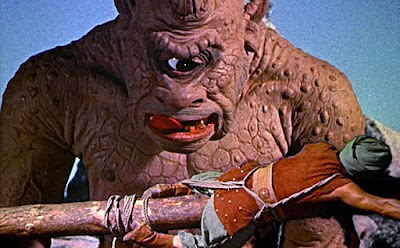
Do monsters roam the Earth?
That’s quite a question to ask, I’m sure you’ll agree, and not something we can easily answer in a single blogpost. Which is why I intend to dedicate an entire book to it in the not-too-distant future. Allow me to elaborate: the main thrust of today’s column will concern the next publication in my TERROR TALES series, and yes, monsters will play a bit part in that, but I’ll outline it in more detail in a few paragraphs’ time.
Before then, if you’ll allow me, I’d like to chat a little bit about …
Upcoming publications
Unfortunately, I’m not in a position today where I can give too much information about anything. Considering I’ve been working full-tilt – to start with, I have three novels to write this year – there is little news so imminent that I’m able to put titles and dates to it.
For example, check out some of the questions I’m regularly asked online.
Q – Can you tell us when the next Heck novel will be out?
A – I’m afraid not. I can only say that it’s already written and under consideration by a publisher. But factors beyond my control mean that the wait must go on for now. (There is some Heck news, though, so keep reading).
Q – You’ve already announced that you’ve signed with Thomas & Mercer, Amazon’s publishing arm, to write two new stand-alone crime thrillers. Can you tell us anything about them yet?
A – There’s nothing more to add at present than you’ll have seen in my previous posts. Both those novels are exciting projects, but both are still being written, so even I am not entirely sure what their final form will be. Sorry about that.
Q – Is there any news on the proposed Lucy Clayburn TV adaptation?
A – No. In fact, this is probably the one definitive answer I’m able to give you today. Covid killed it, basically. Before the pandemic, we were apparently only a couple of months from being greenlit. Since the pandemic ended, I’ve heard nothing at all. We must assume that project is dead in the water.
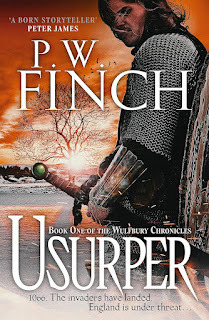 Q – Will there be another book in the Wulfbury Chronicles.
Q – Will there be another book in the Wulfbury Chronicles. A – Not as yet. What I am able to tell you on this front is that my third historical novel is now with Canelo, and in this one, we move a century forward into the era of the crusades. However, while it isn’t officially connected to the previous two books, there is some similarity among the names of the key characters, so we can safely assume that it’s a the same family.
Q – In God’s name, there must be something you can tell us?
A – Okay ... I can announce that a brand new Mark Heckenburg novella is due for publication later this year. Unfortunately, I’m unable to disclose any actual dates yet, or the name of the publisher or the title of the work. All I can say again is sorry, but modern publishers like to announce these things themselves, usually with a bit of fanfare. I can also add that a brand new horror novella of mine, though this one is actually quite lengthy – it doesn’t fall far short of being classified as an actual novel – will be published next year. As before, I can’t yet give you the title, the name of the publisher or the date of publication.
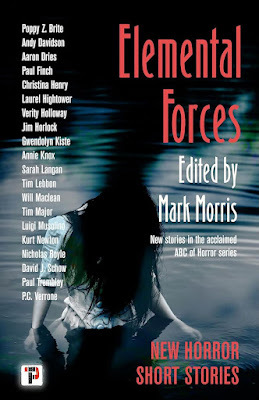 However, one thing I can talk about in some detail, and I’m very proud of this, is the upcoming publication of my short story, Jack-a-Lent, in the indefatigable Mark Morris’s latest horror anthology, ELEMENTAL FORCES. It's out on October 8 this year, from Flametree Press, and if you look at the line-up, you’ll perhaps understand why I am so honoured to be included.
However, one thing I can talk about in some detail, and I’m very proud of this, is the upcoming publication of my short story, Jack-a-Lent, in the indefatigable Mark Morris’s latest horror anthology, ELEMENTAL FORCES. It's out on October 8 this year, from Flametree Press, and if you look at the line-up, you’ll perhaps understand why I am so honoured to be included.
Q – Any specific details about anything else?
A – Well, on the basis that I still owe you something …
Monsters … monsters … monsters
They’ve been with us since the dawn of human awareness. Terrifying, destructive beings, creatures that defy description, that are unknowable, uncontrollable, deadly. Ruthless annihilators of the natural order, which can only be stopped by the most heroic acts of human self-sacrifice.
In every society on Earth, in every religion and every mythology, there are references to monsters. Unspeakable abominations whose very existence is often inimical to the survival of mankind. But what exactly are monsters? How is it they have found such an unassailable place in our collective imagination? Are they entirely based on fantasy or is there some element of truth in these horrifying tales?
The forms that monsters have taken are myriad.
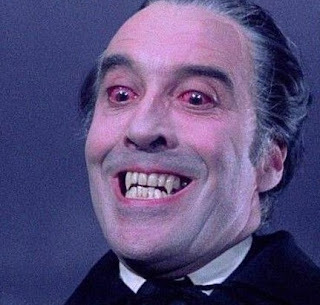 Most people have heard of dragons and titans, of frost giants, of lustful, goat-legged satyrs, of the bull-headed minotaur, the zombies of the Caribbean, the vampires of Eastern Europe (check out Mr Lee, right, in
Dracula
, 1958). But in truth, the pantheon of malevolent beasts is so enormous, so positively encyclopaedic, that more horrific beings than I can count remain unknown to the vast majority of us.
Most people have heard of dragons and titans, of frost giants, of lustful, goat-legged satyrs, of the bull-headed minotaur, the zombies of the Caribbean, the vampires of Eastern Europe (check out Mr Lee, right, in
Dracula
, 1958). But in truth, the pantheon of malevolent beasts is so enormous, so positively encyclopaedic, that more horrific beings than I can count remain unknown to the vast majority of us.How many readers of this column, for example, know what I mean when I mention the Fachen? The Tarasque? The Yateveo? The Tupilaq? The Lamia?
And believe me, that’s not even scratching the surface. I mean, there are so many questions to ask here. To start with, how is it that so many eyewitness reports of monsters come to us from the pages of history, and yet the beasts themselves are almost completely absent from the fossil record?
All kinds of explanations have been offered.
Monsters are metaphors for mankind’s misfortunes ...
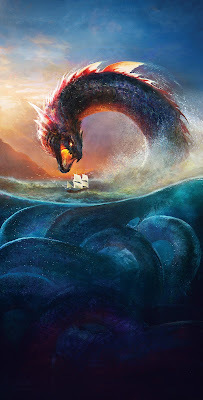 The werewolf is a warning sign that Man, for all his veneer of civilisation, still possesses voracious appetites lurking just below the surface. The colossal sea monster, Leviathan (left, as painted by Katinka Thorondor), was a warning that Man can never be dominant in the cosmos, that in the end only God will wield the ultimate power. Medusa, the youngest and most fearsome of the snake-haired gorgons, embodied the routine mistreatment of women by men, and indicated that even if they fought back justifiably, they would be demonised for ever more.
The werewolf is a warning sign that Man, for all his veneer of civilisation, still possesses voracious appetites lurking just below the surface. The colossal sea monster, Leviathan (left, as painted by Katinka Thorondor), was a warning that Man can never be dominant in the cosmos, that in the end only God will wield the ultimate power. Medusa, the youngest and most fearsome of the snake-haired gorgons, embodied the routine mistreatment of women by men, and indicated that even if they fought back justifiably, they would be demonised for ever more. Monsters are an attempt to understand the chaos of our world (that’s an important word today, ‘chaos’, look out for it later on) ...
Entities like Behemoth, Jörmungandr, Tiamat and Typhon were so vast and terrifying that they could only, in truth, be the personifications of cataclysmic Earth events (much how Godzilla was viewed in 20th century Japan). Even smaller beasts, like goblins and boggarts could be a frightening and damaging presence in the remote communities that believed in them because they caused breaches in an orderly world (souring milk, blighting crops) that everyday folk thought they understood and were appalled to learn they didn’t ...
Monsters are simply errors that our ancestors made when they misidentified natural creatures they’d never encountered before ...
When ancient mammoth skulls were uncovered, the aperture to accommodate the trunk looked for all the world like an extra eye-socket, and if the encircling bone had rotted through, which meant the actual eye-sockets were also encompassed by the yawning gap, it was easy to assume that this was all that remained of a huge one-eyed monster, or cyclops (as immortalised by Ray Harryhausen in The 7th Voyage of Sinbad , at the top of this column). Race memories of gigantopithecus, the largest ape that ever lived (12ft tall!!), and which died out 300,000 years ago, may well have provided the origin for stories about giants and ogres. The Vikings told tales of the kraken, an immense, many-armed sea horror that would drag down entire ships, and almost certainly were referring to the colossal squid.
But there is one very important thing to consider.
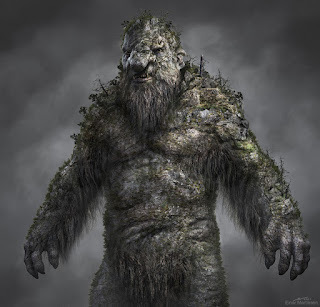 Our distant ancestors might not have been as well educated as we are today, but they weren’t stupid, otherwise they wouldn’t have survived, and they were quite adamant that many of these hellish beings that brought such trauma to their world were actually very real.
Our distant ancestors might not have been as well educated as we are today, but they weren’t stupid, otherwise they wouldn’t have survived, and they were quite adamant that many of these hellish beings that brought such trauma to their world were actually very real. Trolls (as depicted above) by Einar Martinsen) did ambush lone travellers in the deep and frosty forests of old Scandinavia.
Griffins did guard treasure hoards in the mountains of the Middle East and they would tear you to pieces if you tried to get your hands on any of it.
Grendel, the infamous Walker in the Dark, did drive a Danish king called Hrothgar from his new hall in the swampy region of Lejre, slaughtering 30 of his warriors in the process.
The bonze giant, Talos, did heat himself in a roaring fire until he was glowing red, so that he could embrace the wooden hulls of ships visiting his island and consume them with flames.
And these stories don’t just come to us from the distant past.
In 1959, the infamous Dyatlov Pass Incident saw nine student hikers brutally killed and mutilated in their snowbound camp in the Ural Mountains, an unsolved mass slaying, which some observers, with plenty evidence to support them, have attributed to the Alma, or Russian Yeti.
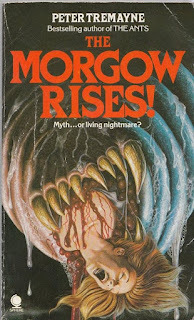 More recently, off the Devonshire coast in the 1970s, a group of scuba divers from the Salcombe Shark Angling Society were frightened out of the water by a terrifying sub-aquatic roar, though one witness later described it as being more like a repeated, monstrous bark, which is associated in local tradition with a ferocious sea serpent called Morgawr. Such a hold does this semi-mythical sea brute have on the imagination of Devon and Cornish folk that Peter Tremayne wrote a highly successful novel in 1982 called
The Morgow Rises
.
More recently, off the Devonshire coast in the 1970s, a group of scuba divers from the Salcombe Shark Angling Society were frightened out of the water by a terrifying sub-aquatic roar, though one witness later described it as being more like a repeated, monstrous bark, which is associated in local tradition with a ferocious sea serpent called Morgawr. Such a hold does this semi-mythical sea brute have on the imagination of Devon and Cornish folk that Peter Tremayne wrote a highly successful novel in 1982 called
The Morgow Rises
.Many times in the last hundred years, climbers on Western Scotland’s remote Ben Macdui, the highest peak in the Cairngorm mountain range, have reported being pursued through the fog and snow by a towering figure known simply as the Big Grey Man. A giant in every sense, the unknown entity is not known to have attacked anyone, though at least one climber claimed to have taken shelter in a bothy, while the beast circled the isolated structure, and only failed to get at him because he’d barricaded the door.
You may be wondering what all this refers to, and whether I’ve just gone off on a monster tangent because I’ve lost the plot. Well, in actual fact, what I’m getting around to explaining is, first of all, there will not be a TERROR TALES anthology this year. I’m afraid that my nightmarishly packed schedule simply does not allow for it. However, Telos Publishing and myself are determined to make up for this, so, I’m also able to announce that, next year, we’ll be doing a bumper edition, in hardback as well as softback and ebook, called TERROR TALES OF CHAOS, which will be launched at the World Fantasy Convention in Brighton (Oct 30 - Nov 2).
For once, it will not focus on any specific geographic region or particular period of history, but it will follow the same basic format as the other books in the series, new stories interspersed with snippets of scary non-fiction, and will be strongly influenced by both folklore and mythology.
While the emphasis will be on chaos, it will not be on the realm called Chaos - i.e. that limitless ocean of nameless elemental forces said to lie between Heaven and Hell - but on its products, aka the many terrible forms it has taken in the eyes of mankind during its frequent visitations to Earth.
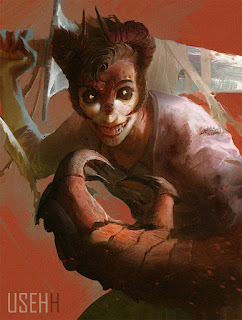 The 17th century English poet, John Milton, took his cue from much more ancient wordsmiths by naming and describing some of the terrifying denizens of Chaos, unimaginable beings who were every bit as wild and destructive as the substance from which they were made.
The 17th century English poet, John Milton, took his cue from much more ancient wordsmiths by naming and describing some of the terrifying denizens of Chaos, unimaginable beings who were every bit as wild and destructive as the substance from which they were made. Individuals like Peor, Arioch (pictured left, as created by Useh) and Demogorgon were so ghastly that even the fallen angels lodged in Hell could not get past them. Perhaps it’s no surprise, therefore, that whenever the children of Chaos have made it into our world, they have done so in the form of unstoppable monsters.
And there you have it: TERROR TALES OF CHAOS will explore the many, many monsters that have terrorised us throughout our histories and mythologies. There’ll be none here that the writers have invented themselves, or which are the work of other writers like the Frankenstein creation or Mr Hyde. There’ll be lots of room for modern interpretation obviously, but essentially all will hail from the long-ago past, and will have come down to us in stories that our distant ancestors would have insisted are absolutely true.
And on the subject of the writers ... well, put it this way, we aren’t far into developing the book yet, but I am very, very happy with many of the names to come on board. Fans of the series will miss out this year, but in 2025 I can confidently predict that they are in for a real treat.
Keep watching this space for further info.
March 21, 2024
Big news on the dark fiction front - at last

Humble apologies for the lengthy time lapse since my last blog post. It’s the usual explanation, I’m afraid. Busy, busy, busy. So many books to write, so many looming deadlines and all that. However, today is quite important on the blogging front, as I have a major announcement to make regarding my future publishing plans. More about that further down.
In addition, because I’ve been working on several new projects at the same time since this year began, a new crime novel and a new horror novella among them, I thought I’d cast my eye over ten authors who are well known in the professional field for writing both crime and horror, sometimes at the same time.
Just a quick reminder that I haven’t got time to do my detailed book reviews anymore. Sorry about that, but as I said earlier, there is just too much writing of my own that I need to get on top of. That said, I still read avidly, and so will be shoving in brief, thumbnail reviews or recommendations whenever a novel or collection impresses me. You’ll find a few of those at the bottom of today’s blog.
But first of all, my ...
Big news
I’m delighted to announce that, after some lengthy negotiating, I have signed a new two-book deal with Thomas & Mercer, who most of you will hopefully recognise as Amazon Publishing.
 Both of these upcoming novels will be stand-alone crime thrillers, the first one (tentatively) titled DEATH LIST, the second (tentatively) titled THE MURDER TOUR. I say ‘tentatively’ because though both of these projects have now been agreed on with my new publishers, titles are often working-titles at this stage, and are subject to last-minute change usually thanks for forces beyond the author’s control.
Both of these upcoming novels will be stand-alone crime thrillers, the first one (tentatively) titled DEATH LIST, the second (tentatively) titled THE MURDER TOUR. I say ‘tentatively’ because though both of these projects have now been agreed on with my new publishers, titles are often working-titles at this stage, and are subject to last-minute change usually thanks for forces beyond the author’s control.The first of the two, which I’m very excited about, is scheduled for publication in June 2025, with a final date still to be set for the second.
I can’t say too much about the second one yet, but this first one, DEATH LIST, takes us to a brand new location (for me, at least): the Isles of Scilly, the southwestern-most tip of the United Kingdom, and a famously beautiful spot, a group of over 200 islands, only five of them occupied, very rural, very remote, and very tranquil, though with wild Atlantic seas raging on all sides of them, and, buried deep in the Gulf Stream, their climate sometimes more akin to the subtropics than England’s temperate norm, anything can happen here - and in DEATH LIST it will. Trust me, it really will.
I’ve been developing this novel over quite a few months, so much so that the writing has been a smooth and enjoyable experience thus far. I trust and hope it will be an enjoyable read.
Much more about this one as publication day approaches.
Heck
I need to mention, by the way, because I’m fully aware that I owe it to a lot of my readers, that DS Mark ‘Heck’ Heckenburg, my most popular and enduring fictional character to date, does NOT figure in this new deal, though this does NOT mean the next Heck novel will not be appearing in the near future.
I’m aware that I’ve promised this before, but I’m absolutely adamant that the next Heck novel, which is already written and edited, will be appearing as soon as it’s possible for me to arrange it. I can’t divulge what kind of conversations I’m having about this at present, but I assure you they are under away.
And now, as promised ...
CRIME WRITERS WHO ARE ALSO HORROR WRITERS
I've often said that crime/thriller fiction and horror fiction, while superficially very different from each other, are also horns on the same evil goat. I love that catch-all phrase, Dark Fiction. To me, it basically means anything scary, disturbing and/or twisted. And that can certainly cover a wealth of sins, ranging even into fantasy, science fiction and literary. Today though, I’m going to focus on ten authors who write (or wrote) both crime and horror fiction, sometimes enclosing them in the same piece of work, but mostly pursuing them as separate disciplines. Either way, giving everything possible on both counts, keeping their ink the deepest shade of red.
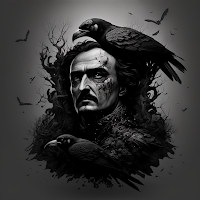 I’m purposely leaving out the mixed-genre’s most prominent purveyors. Everyone already knows that Edgar Allan Poe (as illustrated here by the monstrously talented Lewandrowsky), Arthur Conan Doyle, Dennis Wheatley, Bram Stoker and Stephen King happily and successfully double-hatted for decades when it came to producing both crime-thriller and horror fiction, so there’s nothing really to be gained from mentioning them here.
I’m purposely leaving out the mixed-genre’s most prominent purveyors. Everyone already knows that Edgar Allan Poe (as illustrated here by the monstrously talented Lewandrowsky), Arthur Conan Doyle, Dennis Wheatley, Bram Stoker and Stephen King happily and successfully double-hatted for decades when it came to producing both crime-thriller and horror fiction, so there’s nothing really to be gained from mentioning them here.Instead, let’s focus, in no particular order, on ten writers who, while not exactly unknown, may yet to be discovered either by crime or horror fans, or maybe both ...
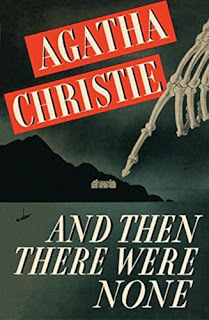 1. Agatha Christie
1. Agatha ChristieHardly unheard of as popular authors go, it may nevertheless surprise many that the official Queen of Crime was also an occasional contributor to the ghost and horror pantheon. Undoubtedly best known for her vast range of crime novels, including the multiple investigations carried out by Miss Marple and Hercule Poirot, The Murder of Roger Ackroyd (1926) still regarded as one of the best crime novels ever written, she was also a dab hand when it came to penning the spooky stuff. Hallowe ’ en Party (1969), recently filmed as A Haunting in Venice , certainly qualifies as a horror novel, as, at a push, does the superlatively titled Endless Night (1967), while it wouldn’t be much of a leap to proclaim the best-selling crime novel of all time, And Then There Were None (1939), the prototype slasher tale. However, for pure unadulterated horror, look no further than Christie’s two short story collections, The Hound of Death (1933) and The Last Seance (2019), both of which are packed with ghoulish goodies.
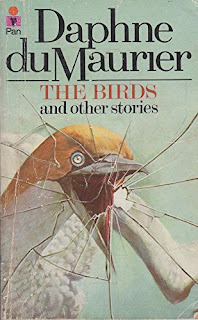 2. Daphne du Maurier
2. Daphne du Maurier When one thinks of Daphne de Maurier these days, one tends automatically to think of classic Gothic melodramas like Jamaica Inn (1936), My Cousin Rachel (1951) and Frenchman ’ s Creek (1941). But Du Maurier also ventured onto the dark side of fiction, often very effectively, regularly blurring the lines between thriller and horror. The most obvious example perhaps is Rebecca (1938), a psychological thriller in truth, but also famous as the ghost novel without a ghost. Yet, it was in the short form where Du Maurier most often dabbled in grimness. The most ground-breaking of her short stories is probably The Birds (1952), which we all know so well, but it’s run a close second and third by Don ’ t Look Now (1971) and The Blue Lenses (1959).
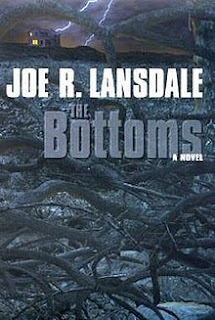 3. Joe R Lansdale
3. Joe R LansdaleIt’s often been said that when it comes to Joe R Lansdale’s unique brand of hardboiled Southern Noir, the crime is often indivisible from the horror. At first glance, that’s almost certainly true, Man’s utter inhumanity to his neighbour often lying at the heart of both. It’s certainly the case in searing crime novels like The Bottoms (2000), Cold in July (1989) and Freezer Burn (1999), not to mention the Hap and Leonard series, in which two very different PIs team up to investigate a range of incredibly brutal crimes. But when he’s doing actual horror, hell ... Lansdale really does horror. The Nightrunners (1987) and Hell ’ s Bounty (2016) certainly classify as out-and-out horror novels, while some of Lansdale’s short stories - By Bizarre Hands (1988), On the Far Side of the Cadillac Desert with Dead Folks (1989) and Drive-in Date (1991), to name but three, are up there among some of the most horrific ever written.
 4. Joyce Carol Oates
4. Joyce Carol OatesAnother true mistress of the macabre is prolific literary author, Joyce Carol Oates, who to date has produced an incredibly diverse range of material, everything from novels to short stories, from stage plays to poetry. However, huge chunks of all of those reside in the darkness. It probably wouldn’t be true to say that Oates favours the traditional type of crime novel, the police procedural or archetypical mystery thriller, but again, crime - and quite often murderous crime - is a regular feature of her work. And as with so many others on this list, her thrillers, which are often strongly psychological, overlap into the world of horror, though all are notable for their deeper than usual analysis of the human condition. Some of her best thrillers to date include the novels, Snake Eyes (1992) and Zombie (1995), though perhaps the pick of her horror writing can be found in her short stories. Tales like The Ruins of Contracoeur (1999) and Face (2007) are truly chilling.
 5. Sarah Pinborough
5. Sarah PinboroughThough she is without doubt one of the most popular authors working in genre fiction today, Sarah Pinborough is a writer for whom the term ‘cross-genre’ could have been invented. She made a big name for herself in YA, but has also gone on to win huge acclaim for her adult-themed books, and screenplays. Again, the focus tends to be on the darker side of the human experience, but there is also much of the fantastic to be found in Pinborough’s fiction. Her Dog-Faced Gods (2011-2013) series, for example, is set in an alternative dystopian Britain, while the Fairy Tale (2013) series, though dark and transgressive, draws on many popular fairy tales. Meanwhile, her crime novel, Mayhem (2913), pursues the famous Victorian-era Torso Killer, but again with fantastical elements woven in, while more conventional seeming domestic thrillers like Behind Her Eyes (2017) and Insomnia (2022) benefit from unusual and even otherworldly denouements. Pinborough is also a veteran of much straightforward horror, as can be seen in earlier novels like The Hidden (2004) and Breeding Ground (2006).
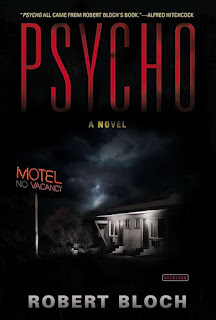 6. Robert Bloch
6. Robert BlochThere was a time when no horror anthology would appear on the bookshelves anywhere without containing at least one Robert Bloch contribution. A writer whose career spanned an amazing 60 years, Bloch was championed as a young author by none other than HP Lovecraft, though he rarely dipped into that specific Lovecraftian brand of cosmic horror, much preferring to focus on twisted psychology and manmade mayhem. That said, Bloch, who produced hundreds of pieces of work during his career, both short stories and novels, wrote a number of books that could only really be described as crime fiction, American Gothic (1974) for example, or Night of the Ripper (1984), he also wrote horror novels, Psycho (1959) perhaps the most obvious (yes, the same one that Hitchcock filmed), though again there was an element of cross-over there. Among his horror short stories, some of the most anthologised and certainly some of the most bone-chilling, include Yours Truly, Jack the Ripper (1962) and The Night Before Christmas (1980).
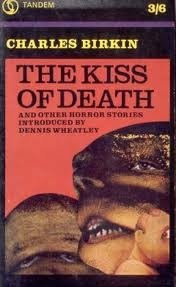 7. Charles Birkin
7. Charles BirkinThough Charles Birkin first came to prominence editing the famous Creeps anthologies of the 1930s, his heyday as a writer was after World War II. He is nearly always remembered as a horror writer, though he produced a huge volume of fiendishly unpleasant short stories, the ‘conte cruels’ as they used to be called, rather than supernatural tales, which straddled both the crime and the horror genres. Birkin was much less interested in ghosts and goblins than he was in mankind’s own capacity for madness and cruelty, often dealing with serial murder, torture and insanity. The great anthologist, Hugh Lamb, said of him: ‘If you are at all sensitive, leave him well alone’. In fact, given that he was writing in a relatively innocent age, many of the fictional situations he conjured up were almost unimaginable. In Kiss of Death (1964), a jilted lover stricken with leprosy determines to have one last night of passion with the woman who left him at the altar. In Green Fingers (1965), a concentration gamp guard’s mistress has no idea what he regularly buries in her garden even though it ensures that she wins lots of prizes at the horticultural festival. Much of his work is out of print today, but that’s not because (as is sometimes assumed) he’s been banned; it’s simply that time has moved on. However, many of his collections can still be acquired second-hand, but be warned: they are excessively dark and twisted.
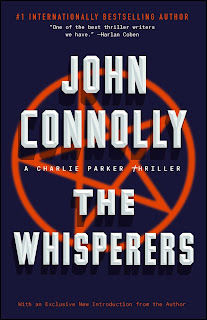 8. John Connolly
8. John ConnollyThe bulk of John Connolly's literary output to date concerns his blue-collar hero, Charlie Parker. There are 21 Parker novels to date (and counting). An ex-cop turned private investigator, Parker’s career appears to walk a tightrope between a Noirish world of gangsters, hitmen and serial killers and the realm of the out-and-out supernatural. Some folks in the world of publishing, conveniently forgetting John Connolly, might tell upcoming wannabes that you just can’t do this, that you can't blend such different genres together so seamlessly. Well, they need to check out outstanding cross-genre novels like A Game of Ghosts (2017) and The Whisperers (2010). Connolly has also gone full horror mode with the two collections of short stories he has published to date, Nocturnes (2004) and Night Music (2015), in which can be found some exceptional terror tales.
 9. Peter James
9. Peter JamesPeter James is probably best known these days for his long-running Roy Grace crime series set in Brighton, the tired but good-hearted cop called constantly to investigate complex and often sadistic murder cases. Among the best of these are Dead Simple (2005) and Looking Good Dead (2006). The books dwell totally in the real world and are probably among the best examples of modern British detective fiction. But many may not know that James commenced his writing career penning horror, and by that, I mean real horror, as in the unashamedly supernatural variety. Early examples of this, all well worth checking out, include Sweet Heart (1990) and Prophecy (1992), though he hasn’t given up on the supernatural stuff yet. Much more recent full-blooded horror novels of his include The House on Cold Hill (2015) and The Secret of Cold Hill (2019). James has also published A Twist of the Knife (2014), a collection of crime and horror shorts containing several exquisite examples of the shortform bone-chiller.
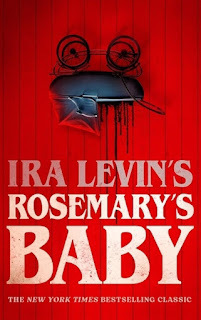 10. Ira Levin
10. Ira LevinBeautifully described by Stephen King as ‘the Swiss watchmaker of suspense novels,’ Ira Levin didn’t produce an immense body of work, though what he did turn out was distinguished by its quality. His first novel, A Kiss Before Dying (1953), which won the Edgar Award, is one of probably only two real crime novels of his, as it follows the career of an amoral young man and his quest to murder his way to the top of a corporate family, while the other, Sliver (1991), is a creepy murder mystery set in a modern day high-rise, though Levin added to his crime/thriller canon with the famous stage play, Deathtrap (1978). In horror terms, he will best be remembered for Rosemary ’ s Baby (1967), which lit the blue touch-paper to an entire cycle of Satanic horror thrillers in the decade that followed. His other horrors were a little more off-the-wall, and perhaps could also be classified as science fiction, The Boys From Brazil (1976) seeing a war crimes investigator uncover a fiendish plot to clone Adolf Hitler, and more famously, The Stepford Wives (1972), in which the entire female population of a secluded town is replaced by identical but compliant androids. As you can see, Levin didn’t exactly produce a tidal wave of material, but he is still one of the greats.
THRILLERS, CHILLERS, SHOCKERS AND KILLERS
As I’ve already said, I’ll be inserting these into future blogs whenever I have something to share. There won’t always be as many as this, but it wouldn’t be right if I didn’t at least refer you all to these latest works of dark fiction to have passed through my hands.
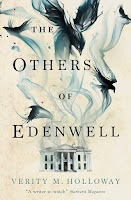 THE OTHERS OF EDENWELL
by Verity M Holloway (2023)
THE OTHERS OF EDENWELL
by Verity M Holloway (2023)
In 1917, two young misfits, shipped to a remote marshland retreat to keep them out of the trenches, become fearful that something strange and evil is lurking in the woods nearby. Remarkable and dazzling. Triumphant evocation of time and place, laced tight with strangeness and dread. Verity Holloway sets a new high bar for ghost story writers.
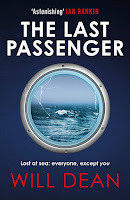 THE LAST PASSENGER
by Will Dean (2023)
THE LAST PASSENGER
by Will Dean (2023)
A dead ship on the ocean dark; a conspiracy that seems too incredible to be true. Modern mystery thrillers don’t get much more mysterious or thrilling than this new one from Will Dean.
Twists and turns galore fuelled by steadily intensifying terror. You cannot stop reading.
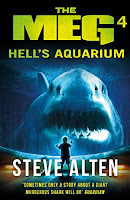 MEG: HELL'S AQUARIUM
by Steve Alten (2021)
MEG: HELL'S AQUARIUM
by Steve Alten (2021)
Another ocean-going roller coaster ride from Steve Alten. Exhilarating terror as primordial horrors battle modern tech in the abyssal depths, with many a cast member chomped.
If you like your turquoise seascapes stained with crimson, this one’s for you.
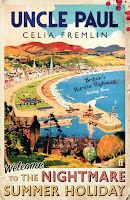 UNCLE PAUL
by Celia Fremlin (1959)
UNCLE PAUL
by Celia Fremlin (1959)
Deceptively genteel psycho-thriller of the classic era. Celia Fremlin always possessed a devilishly sharp eye for people and places but here piles on the tension and terror.
Witty as hell but deliciously dark too. Rises steadily to a nerve-tautening climax and a killer twist.
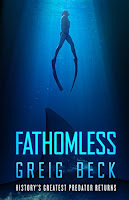 FATHOMLESS
by Greig Beck (2018)
FATHOMLESS
by Greig Beck (2018)
Jaws-type deep sea chiller, as an earthquake opens the door to an underground ocean environment and a beast of nightmare emerges. Impressively written and robustly researched.
Quality techno-horror alternates with high adventure as Man’s most ancient nemesis churns him to chum.
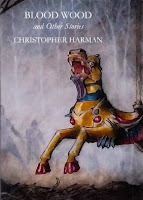 BLOOD WOOD
by Christopher Harman (2023)
BLOOD WOOD
by Christopher Harman (2023)
Robert Aickman meets Ramsey Campbell in this jarring collection of off-kilter tales. Suggestion triumphs over exposition, oddball characters lurk, half-seen horrors abound.
Beautifully and concisely written, and thick with an atmosphere of doom. Another gorgeously packaged collection of nasty treats from Sarob.
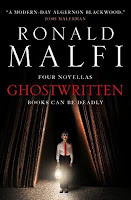 GHOSTWRITTEN
by Ronald Malfi (2022)
GHOSTWRITTEN
by Ronald Malfi (2022)
Four novellas from Hell’s library. The ‘choose your own path’ adventure novel that morphs into terrifying reality. The gangland brothers whose mission to deliver a forbidden book pits them against nightmarish opponents. The children’s pop-up book that always means death for someone. The book with a mind (and soul) of its own. What else can I say? Malfi delivers again.
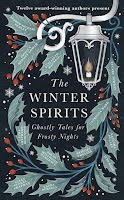 THE WINTER SPIRITS
by Various (2024)
THE WINTER SPIRITS
by Various (2024)
A father’s trip into a world of madness to rescue his lost son. The worn-out writer increasingly alarmed by the mysterious entity on the snow-clad roof. The badly behaved children in the Victorian nursery, and the governess who calls on Krampus to tame them.
An absorbing trip into traditionally themed festive terror from a host of quality authors.
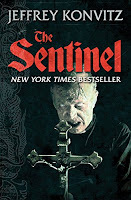 THE SENTINEL
by Jeffrey Konvitz (1974)
THE SENTINEL
by Jeffrey Konvitz (1974)
Interesting horror novel of yesteryear. Not particularly great writing, but a Satanic chiller which, for once, does not concern itself with possession.
Michael Winner’s 1977 adaptation worked in parts but was tasteless and controversial. I’d certainly be interested in seeing a remake, so long as they reduced the shock factor and upped the genuinely eerie mystery.
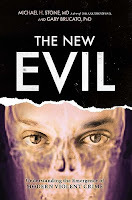 THE NEW EVIL
by Michael Stone and Gary Brucato (2019)
THE NEW EVIL
by Michael Stone and Gary Brucato (2019)
An absolute must for any crime, thriller and even horror writer’s bookshelf. Two eminent psychoanalysts scientifically quantify the nature and meaning of evil in the modern world. A deep dive into modern man’s propensity for viciousness and depravity, illustrated by hundreds of terrifying case studies.
Strong stomachs are required, but the quest to pinpoint the causes of and find solutions for the most negative and destructive forces in ‘civilised’ humanity is admirable. Totally absorbing.
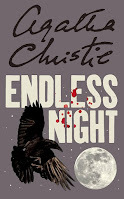 ENDLESS NIGHT
by Agatha Christie (1967)
ENDLESS NIGHT
by Agatha Christie (1967)
An amoral chancer lucks into marriage with a pretty heiress, and together they build the house of their dreams in a stretch of idyllic woodland, which is reputedly cursed. What could go wrong?
A famous chiller from Agatha Christie’s moody psychological era. Not as disturbing now as it was in ’67, when unreliable narration wasn’t a thing … but it’s not a long read, so it’s worth your time.
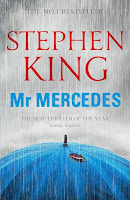 MR MERCEDES
by Stephen King (2015)
MR MERCEDES
by Stephen King (2015)
Not so much horror, but certainly horrific. In the age of high school shootings and rustbelt America, the old master wreaks blood and chaos via the hand of a quietly deranged suburbanite, peeling back the layers of his fragile sanity while sending a typical band of misfits racing against time to thwart his maniac schemes.
A tad leisurely in parts, but a gripping read overall.
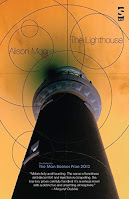 THE LIGHTHOUSE
by Alison Moore (2012)
THE LIGHTHOUSE
by Alison Moore (2012)
A middle-aged man takes a Rhineland walking holiday to recuperate after the breakup of his marriage, and ruminates on his unhappy life, at the same time unaware that he is drifting into danger. Alison Moore’s debut novel, and a dark, dreamlike study of neglect, isolation and futility.
Perfectly written (at 183 pages, an easy read), deeply thought-provoking and achingly sad.
February 4, 2024
By Heck! A few pics from my writing past

A bit of a fun blogpost today. I thought I’d muck about with some AI picture-drawing software, to see what it made of a selection of books, stories and even plays from my back catalogue.
I should say straight off that I’m nervous about AI. I’m not sure which creative wouldn’t be. Clearly there are copyright issues and so on, not to mention widespread concerns about talented individuals finding themselves replaced by computer programmes. Quite clearly AI is now with us to stay, but for all the reasons I’ve mentioned, I can guarantee that none of these images, which rather than pulling them off the Net from various databases, I’ve requested from the app myself and purely for the purpose of having a bit of fun, will ever be used in any official capacity.
I have very little to do these days with my own book covers, or the artwork that may accompany my stories in magazines and the like, but those I do, I will always seek from a human artist or illustrator.
Anyway, here we go. Those who read my stuff may recognise the above. It’s an AI interpretation of HECK, or rather DS Mark Heckenburg, the star of seven of my novels to date (and hopefully more to come). On seeing this, I couldn’t resist checking out what it made of a few other of my writing endeavours.
I repeat that it’s just a bit of fun, this (none of these are going out in any form of publication). Here are twenty of my stories, books etc that I chose at random ...

The second novel in the WULFBURY CHRONICLES, sees Cerdic, the son of a Saxon earl captured after the disastrous battle of Hastings, turn the tables on his foes, by setting Norman against Viking, but at the same time adapting to the new medieval era that has now dawned in his homeland.
WE ARE THE SHADOWS (2009)
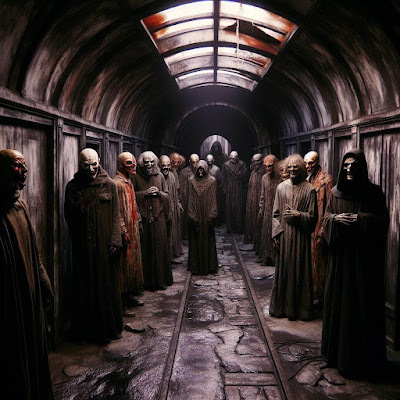
An investigative reporter looks into a series of violent attacks, all of whose perpetrators appear to match the descriptions of famous serial killers, many now dead. The trail finally leads him to an abandoned wax museum in a desolate seaside town. (Novella, first published in GROANING SHADOWS ).
SEASON OF MIST (2010)

In the autumn of 1974, a bunch of kids in a coal-mining community in northern England are advised to stay indoors when a killer starts targeting the town’s youth, but one particularly intrepid group become convinced that this no normal murderer. (Novella, first published in WALKERS IN THE DARK).
THE HOUSE OF THE HAG (2015)

A middle-aged English couple get lost in foul weather high in the Scottish mountains, finally seeking shelter in an abandoned tent, only to find that it houses three crude stone figures. Worried they desecrated some kind of shrine, they hurry away - but a fearsome pursuit now follows. (Short story, first published in THE SPECTRAL BOOK OF HORROR 2). STRANGERS (2016)

A female police detective in Manchester goes undercover to try and catch a deranged prostitute who has been sexually murdering her male clients, entering a more dangerous world that she could ever have imagined. The first novel in my LUCY CLAYBURN series, and a Sunday Times Top Ten read.
BRANCH LINE (2020)
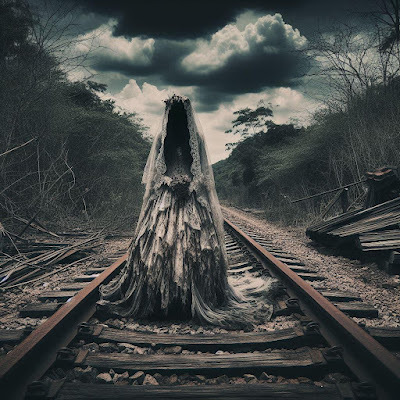
Two 1970s kids venture along a derelict stretch of railway line, searching for a hoard of discarded girlie mags. Both know about the legend that the revenant of a Victorian-era suicide still supposedly haunts the line, but they are too eager to get their hands on the good stuff. (Short story, first published in AFTER SUNDOWN ).
THE HOTEL ON THE BORDERLAND (2001)
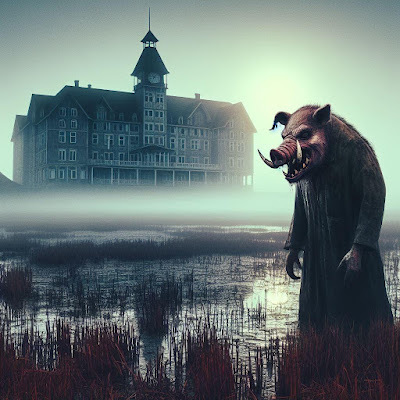
Before the Northern Ireland peace process commences, an RUC detective pursues an IRA gunman out into the wilds of the west, and there, amid, an eerie fog, is drawn to a bizarre coastal hotel where almost nothing and no one is what they initially appear to be. (Short story, first published in HOUSES AT BORDERLANDS).
DR WHO - LEVIATHAN (2010)
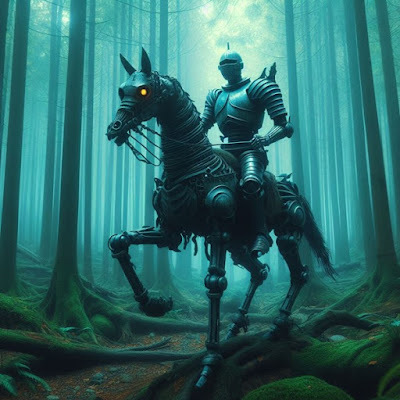
The Sixth Doctor and Peri arrive in what appears to be medieval England, only to find a village community living in terror of their local baron and a monstrous force out in the encircling greenwood, which lives only to punish all those who defy ‘the Way’. (Full cast audio drama in Big Finish’s DR WHO: THE LOST STORIES season).
THE OLD NORTH ROAD (2006)
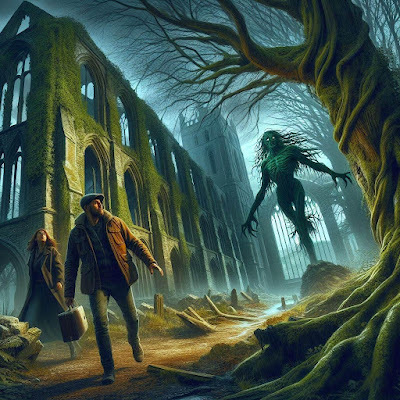
A folklorist searching out the origins of the Green Man legend visits a derelict priory in the Forest of Lune in northern England, only to find that he’s fallen foul of a couple of very dangerous hitchers. (Short story, first published in ALONE ON THE DARKSIDE , and winner of the International Horror Guild Award for 2007).
THE RETREAT (2008)

The Russian Front during World War Two. A frost-bitten German platoon escapes the fiery ruins of Stalingrad, fighting its way through the frozen wilderness and taking shelter in a mysterious log cabin, only to discover that it is vastly larger and more mysterious on the inside than the out. (Novella, first published in HOUSES ON THE BORDERLAND ).
REIGN OF HELL (2013)

At the height of World War Two, a Greek archaeologist leads his Nazi-supporting brother into a deep cave system, where he claims to have uncovered something that will aid in the Axis war effort against the Allies. (Short story, first published in WORLD WAR CTHULHU).
SPARROWHAWK (2010)

In the 1840s, an embittered veteran of the Afghan War is released from the debtor’s prison and charged with standing guard over a house in a quiet corner of inner London for the duration of December. But as the cold weather descends, a supernatural evil is unleashed. (Novella, first published as a stand-alone).
THE TENTH LESSON (2020)

A children’s novelist and secret Christmas skeptic is snowed into his rural cottage one frightful Christmas Eve, at which point he receives a very curious present: a life-size nutcracker soldier, clockwork of course, and with a devious mind of its own. (Short story, first published in THE CHRISTMAS YOU DESERVE ).
ONE EYE OPEN (2020)
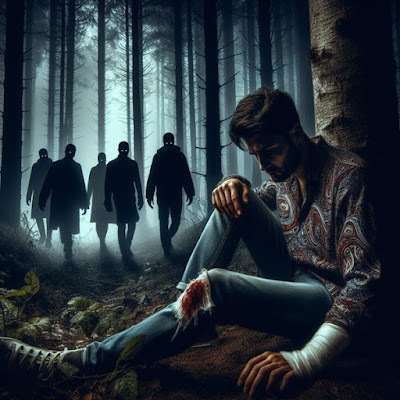
While a lady police detective investigates a car that shouldn't exist and a terrible road accident which no one remembers happening, a once-famous racing driver finds himself at odds with evil organisation who’ll stop at nothing to get even with those who’ve defied them. (Stand alone novel).
THE DOOM (2010)

When, during the renovation of a village church, a medieval wall-painting is discovered, which portrays the most terrifying images of Hell ever conceived, visitors come from far and wide. But increasingly, they are a strange and scary breed. (Short story, first published in THE BLACK BOOK OF HORROR #6 ).
THE AFTER SHOCK (1994)
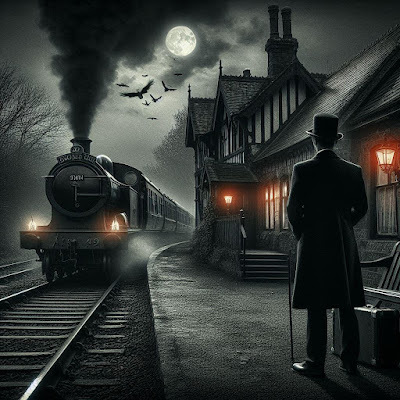
At the height of World War One, a travelling man finds himself marooned overnight on a remote country railway station. Only when it’s too late, the following morning in fact, does the station guard realise that he should never have left him there alone. (First published in THE STEAM RAILWAY NEWS CHRISTMAS SPECIAL).
STOLEN (2019)

Detective Constable Lucy Clayburn responds to the abductions of pets in the district by closing down a local dog-fighting ring. Only when the abductions continue does she wonder if she got the right people, especially as now it is humans who are being snatched off the streets. (Third novel in the Lucy Clayburn series).
CALIBOS (2005)
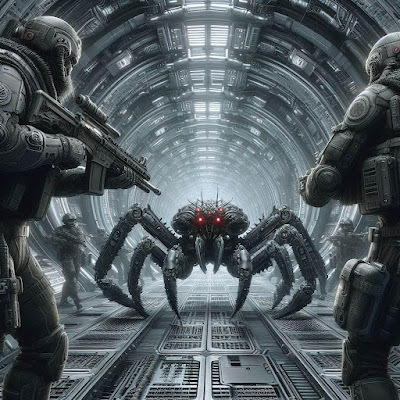
When a colossal ocean-going robot crab comes ashore, now under the control of an unknown force, a special forces squad infiltrates its interior to try and switch off its reactor, but first they must run a gauntlet of ruthless mechanical antibodies. (Short story, first published in DAIKAJU).
MARSHWALL (2013)
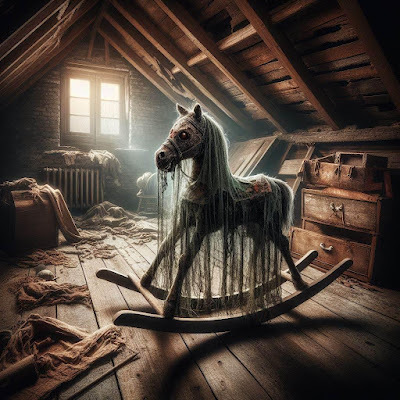
When he learns that his girlfriend’s wealthy but estranged mother is likely to die, a shallow chancer visits her isolated Norfolk home in order to make friends, but first must contend with the fiercely protective rocking horse that lurks in the attic. (Short story, first published in THE BLACK BOOK OF HORROR #10 ).
THE GODS OF GREEN AND GREY (2005)
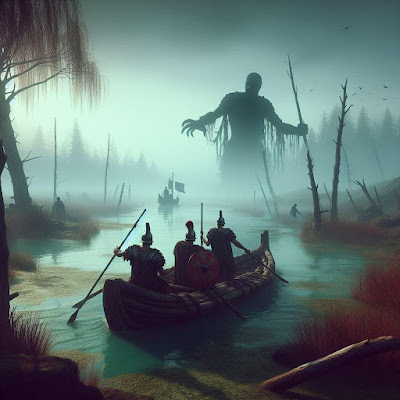
In ancient Britain, a Roman company charged with constructing a road through an area of misty fenland falls prey to a brutal band of flesh-eating ogres. (Short story, first published in PARADOX #7).
January 8, 2024
BATTLE LORD hits the bookshelves today

Today, I’m delighted to announce that BATTLE LORD is published. It’s the second volume in the WULFBURY CHRONICLES, my saga of 1066 and the Norman Conquest of England. This will need to be a quick blogpost today because there is so much to do, and so after a swift recap on the story so far, I’ll hit you with all the main characters in the series as it currently stands.
As a quick footnote to today’s intro, I apologise if anyone has tuned in to this blog today looking for the latest installment in Thrillers, Chillers. Alas, as I mentioned last autumn, those detailed book reviews were taking up an awful lot of time. Time that could be more valuably spent writing new material of my own, so from the start of this year, I’ve discontinued Thrillers, Chillers. That does not mean that I won’t be mentioning new titles I’ve enjoyed now and then, but any reviews that do make this column from now on will be short, sharp and succinct.
Now we roll back the centuries until a whole millennium has passed, and face the oncoming storm of ...
The Norman ConquestI’m obviously not going to say too much today about the synopsis of BATTLE LORD , for fear of giving away spoilers before you’ve already read it. But suffice to say that it picks up where USURPER left off. Those who’ve read USURPER will already know that Duke William the Bastard’s conquest of England is already in full swing. The battle of Hastings has been fought and lost, and the flower of the English thegnhood lies slaughtered on Senlac Ridge.
But Duke William hasn’t captured the kingdom yet. Among his prisoners is Cerdic Aelfricsson, 17-year-old heir to the earldom of Ripon, whose ancestral home lies far to the north but is already occupied by a surviving remnant of the great Viking army of Harald Hardraada, which arrived in England a couple of weeks before the Normans and was destroyed by the ill-fated King Harold Godwinson at the battle of Stamford Bridge. Cerdic’s future looks bleak. The Normans are harsh masters, and have only spared him thanks to his promise that his title and lands can be theirs if they will allow him to show them the way. If nothing else though, Cerdic has found a kindred spirit in Yvette, a pretty Norman maiden who is also a hostage, as her father, Count Rodric d’Hiemois is an avowed enemy of Duke William.
For those who still need persuading, here is a breakdown of the key characters in the series so far:
 Cerdic Aelfricsson: The main protagonist in both
USURPER
and
BATTLE LORD
. Cerdic, as second son to Earl Rothgar of Ripon, is heir to nothing. In fact, he is reluctantly training for the priesthood when the Viking horde of Harald the Hardraada lands on the Northumbrian coast, and his entire prospective future is engulfed in a whirlwind of fire and destruction ...
Cerdic Aelfricsson: The main protagonist in both
USURPER
and
BATTLE LORD
. Cerdic, as second son to Earl Rothgar of Ripon, is heir to nothing. In fact, he is reluctantly training for the priesthood when the Viking horde of Harald the Hardraada lands on the Northumbrian coast, and his entire prospective future is engulfed in a whirlwind of fire and destruction ...Eadora: The ‘Flower of Swaledale’. A beautiful Saxon village girl, yearned for by Cerdic, but as she’s the unofficial lover of his older brother, Unferth, he can only yearn from afar. As a ceorl, her relationship with the lord of the manor’s eldest son is obviously fraught with difficulty, though all that will pale to insignificance when Harald the Hardraada’s Vikings invade the Northumbrian shore …
Rothgar Aelfricsson, the Earl of Ripon: A great Saxon lord, respected across Northumbria for his warrior past but also for his reputation as a man of wisdom and justice. He and his younger son, Cerdic, are at odds over Rothgar’s decision to send the lad to the Church, but before that happens, the autumn of 1066 explodes with a war on two fronts, Harald the Hardraada’s Viking invasion of England in the north, and William of Normandy’s invasion in the south. As one of the key leaders of his people, Rothgar is caught in the middle …
Aethelric: Earl Rothgar’s chaplain and Cerdic’s teacher and mentor, a gentle Saxon priest who is also hugely well-educated. Much of this he has imparted to Cerdic at an early age, ensuring the lad is not just literate and numerate but multi-lingual. He also has a broader political acumen than most of those in his calling, and shares deeply in Earl Rothgar’s concern that the England they’ve known and loved for so long is about to change dramatically for the worse.
Oswalda: The Saxon village woman who, as midwife and wetnurse, helped raise Cerdic after his own mother died while bringing him into the world. As such, her status has been raised by Earl Rothgar and she and her husband live on their own small farm. She remains a key figure in Cerdic’s life and is probably the person he loves more than any other. Unfortunately, her homestead lies in the direct path of the invading Vikings.
Unferth: Cerdic’s older brother. A warrior through and through, and something of an arrogant, roistering rake. However, he takes his future inheritance seriously, and when the chaos erupts in the autumn of 1066, is more than willing to ride with his father to face the enemy in the field. His relationship with Cerdic is stormy, though deep down the older lad respects Cerdic’s courage and intelligence and feels that he is wasted being sent to the Church.
Brithnoth: An older village priest often at odds with Aethelric because he tolerates and even encourages some of the pagan traditions still lurking around the edges of Anglo-Saxon society in 1066. His position is based on a conviction that ordinary folk can’t be expected to surrender everything in life that once gave them pleasure. Aethelric considers this muddled thinking, and even dangerous to the Christian faith, but it will make no difference either way when the Vikings arrive, as they are respecters of no one’s beliefs save their own.

Aethelbere: The marshal of Earl Rothgar’s household, whose presence on the battlefield can inspire confidence in even the weakest of men. A senior housecarl with much experience, Aethelbere is devotedly loyal to his master and firmly in control of the earl’s military resources. But like his master, he knows that any man who fights in each and every situation will eventually meet a sword quicker than his own, and he can’t help wondering if that time is nigh.
Haco: Eadora’s older brother. A scheming, untrustworthy rogue, but also a natural opportunist who unashamedly sees Unferth’s relationship with his sister as a chance to make good, and when this backfires, looks further afield to find allies against those he believes have taken advantage of his family. As a ceorl, he isn’t much of an opponent in himself, but he remains a key antagonist in both novels.
Thegn Redwald: The commander of Unferth’s small troop of housecarls, and a widely travelled warrior, who, though he knows, respects and fears the Vikings, is far more worried by the prospect of fighting the Normans. Held captive by them for several months, he has seen the effectiveness of Norman knights in battle, particularly how much their superior training, weaponry and armour is changing the face of warfare in these violent closing days of the Dark Ages.
Harald ‘the Hardraada’: One of the most legendary of all Viking leaders. A highly successful warrior and adventurer, but famous also for his cruelty and barbarism. Rightly known across Scandinavia as ‘the Thunderbolt of the North’. In 1066, he comes to Northumbria, intent on claiming the English throne, in company with a huge Viking army, all the chieftains of which he has promised rich rewards, which they must claim for themselves as they maraud through the shires of this wealthy land.
Wulfgar Ragnarsson: One of the Hardraada’s deputy commanders, and a fearsome Viking warrior in his own right. His origins are shrouded in mystery, but he controls his own small army within the greater army of his master and has several key aims during the invasion of England. First and foremost is the recapture of those lands he considers ancestrally his, the centrepiece of which is Wulfbury, the fortified capital of Earl Rothgar of Ripon.
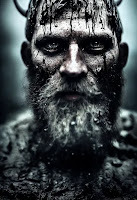 Sigfurth Blood-Hair: Wulfgar Ragnarsson’s most savage enforcer. Lethal in combat, and a cold-blooded killer and torturer of his master’s enemies, whatever their status. When Blood-Hair and his murderous accomplices are unleashed in Earl Rothgar’s verdant domain of Swaledale, the vast majority of whose male population has been drawn away to fight the Hardraada, he is literally a wolf in the fold.
Sigfurth Blood-Hair: Wulfgar Ragnarsson’s most savage enforcer. Lethal in combat, and a cold-blooded killer and torturer of his master’s enemies, whatever their status. When Blood-Hair and his murderous accomplices are unleashed in Earl Rothgar’s verdant domain of Swaledale, the vast majority of whose male population has been drawn away to fight the Hardraada, he is literally a wolf in the fold.Harold Godwinson: One of the most famous but shortest-ruling kings in England’s history. Earl of Wessex beforehand, and another fearless commander of men, King Harold, alas, will finally overface himself when tackling the Viking horde of Harald the Hardraada, and a couple of weeks later, marching south to take on the entire invasion force of Duke William of Normandy.
William the Bastard: The infamous Duke of Normandy who will later be nicknamed ‘William the Conqueror’, the founder of a new medieval dynasty in what was previously Dark Age England. A skilled and ruthless warrior, who has outfought numerically superior enemies all his life. When this rapacious overlord sets his sights on something, there is no stopping him. His latest goal, of course, is the capture of England, and he’ll kill and maim as many of its occupants as he needs to, to bring it under his yoke.
 Yvette d’Hiemois: A young Norman woman of fine breeding and intellect, but a valuable hostage to Duke William. Yvette is the only child and heiress to Count Rodric of Hiemois, a great Norman baron currently at odds with the Duke and therefore living in exile. Inevitably, she forms an alliance with fellow captive, Cerdic, which soon blossoms into romance. As the war unravels into unimaginable horror, Yvette withdraws into herself, dreaming of better things, and increasingly fearful that the vengeance-fuelled Cerdic will continue this fight until everyone and everything is annihilated.
Yvette d’Hiemois: A young Norman woman of fine breeding and intellect, but a valuable hostage to Duke William. Yvette is the only child and heiress to Count Rodric of Hiemois, a great Norman baron currently at odds with the Duke and therefore living in exile. Inevitably, she forms an alliance with fellow captive, Cerdic, which soon blossoms into romance. As the war unravels into unimaginable horror, Yvette withdraws into herself, dreaming of better things, and increasingly fearful that the vengeance-fuelled Cerdic will continue this fight until everyone and everything is annihilated.Bishop Odo of Bayeux: Duke William’s brother and foremost deputy, and a grotesque, corrupt beast of a man, who cares nothing for his religious calling, seeking only to empower and enrich himself, and of course to debauch every female who falls into his grasp. So calculating is this odious creature that even Duke William is wary of him, though for the time being at least considers him a necessary device by which to dominate and terrorise his new subjects.
Count Cynric of Tancarville: Another of the great Norman lords who triumphs at the battle of Hastings, and a cold, aloof figure, who is no less greedy and ambitious than the majority of his jackal-like comrades, but who isn’t cruel for cruelty’s sake, who thinks deeply and plans ahead. An intriguer, who places little trust in Duke William and is prepared to make alliances with the most unexpected parties to achieve his aims.
Turold de Bardouville: Perhaps the greatest of the Norman knights, and Count Cynric’s personal champion. A ferocious opponent but another who takes no pleasure in killing without purpose and considers the terrorising of peasant folk, in particular women and children, beneath him. Half-English by birth, he is nevertheless entirely Norman in his outlook, but over time he comes to respect Cerdic’s courage and intelligence, and gradually forms an unlikely friendship with the lad, teaching him how to fight with a state-of-the-art new weapon, the Norman longsword.
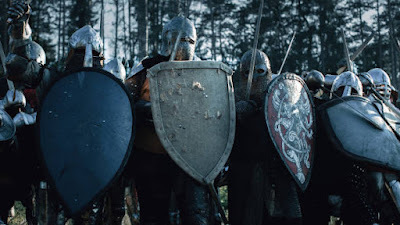
Joubert fitzOslac: Count Cyrnic’s second son, and a man who has come to England not just to prove himself in battle, but to win the kind of wealth and position he could only dream about back home in Normandy. As such, he is brutal and sadistic. He thinks nothing of inflicting pain and terror if it will advance his position and is hated and feared even by many on his own side.
Father Jerome: Count Cynric’s personal chaplain, and one of a whole swarm of Norman clergymen who have accompanied the invasion of England, lusting for gold, power and position. Formerly a religious idealist, Jerome genuinely though he would come here to convert sinners, and then reap his just reward. Instead, the ongoing horror of war, slaughter and pillage preys on his mind, unhinging him to a horrible degree.
Roland Casterborus: Count Cynric’s seneschal, and a skilled and honourable knight. He is steadfast to his Norman master, but his adherence to the new code of chivalry gnaws at his conscience, especially when he learns that the native English are not the degenerate apostates he was led to expect but practising fellow Christians. He also despises the rodent-like mercenaries who have accompanied the invasion and sees most of Duke William’s atrocities as cruel and unnecessary.
(Nearly all the images that I've used in today’s column were found floating around on the internet. With the exceptions of the one at the top, none were produced specifically to promote or illustrate the events or personalities in either of the novels, USURPER and BATTLE LORD. Nor were they tagged with the original creator’s names. If anyone has a problem with me using these images, please let me know and I will happily apply any credit where it is due, or, if required, take the image down).
December 21, 2023
Part 2 of THE ICY REALM. Hope you enjoy.

Well, we’re almost there. The big day looms. But before then, if you’ve got time amid all those chaotic last-minute preparations, here is the second and final part of my latest Christmas horror story, THE ICY REALM. If you’re only just tuning in now and aren’t sure what’s what, it’s probably best if you read Part 1 first, which you can find by simply scrolling down to my previous post (December 15).
THE ICY REALM2
Alex said nothing on the return drive, but it was a struggle to get things straight in his head. First of all, he’d clearly imagined the business with the two marionettes. There was no other explanation. He’d thought he was locked in there for the holidays. He’d panicked and lost it … not that he was going to tell anyone that. He must already be a diminished figure in Erika’s eyes just for having got stuck in there in the first place.
But the rest of it was harder to dismiss.
The damaged books. The fact he’d seemingly been lured into that trap. Surely it wasn’t all just some ugly coincidence? And if not, what did it mean exactly?
Erika threw curious sidelong glances at him, but increasingly, the weather was distracting them both. It wasn’t just getting dark now, the clouds that had regathered over the afternoon were opening again, progressively larger flakes dancing in their headlights as they wound along the narrow Lake District lanes, now narrowed even further by the snow banked to either side. The already minuscule strip of tarmac along the middle of the road was slowly covering over. Erika fiddled with the radio, to try and get a forecast, but all they heard was lots of fuzz and several broken, disembodied voices. A couple of times though, Alex heard phrases like ‘whiteout conditions …’ and ‘severe disruption …’
‘Damn it,’ he muttered.
‘Told you,’ Erika replied primly. ‘A white Christmas doesn’t always mean a happy one.’
‘Deaths expected …’
‘God above,’ he said out loud. ‘You hear that?’
‘In the Icy Realm …’
‘England has the weirdest weather,’ Erika replied. ‘One week ago, it was raining.’
‘Did they really say “deaths expected”?’
She frowned. ‘Didn’t sound like it.’
‘Did to me.’
‘Probably because you’re a special case …’
‘What the hell!’ he exploded.
‘Alex, be careful!’
He swerved to avoid the snowbank they’d been veering towards. ‘I thought it said …’
‘Don’t listen to that. Focus on driving. We want to get home in one piece.’
It was certainly a relief when they swung through the open gate onto the lengthy driveway leading to the Farm, because the snow was now coming down hard: the track itself was several inches under, the trees enclosing them more like skeletal white outlines.
The drive went initially left of the lawn, before cutting right past the front of the farmhouse and snaking round to the side. A bright new layer of snow covered everything, untrammelled by tyres or footprints, yet as they went right, their headlights ghosting across the building, Alex spotted something on the doorstep. He drove by, biting his lip. Erika was too busy putting on her gloves and scarf to have noticed.
They pulled up in their usual place at the side of the house. Alex applied the handbrake but stayed in his seat. He told Erika that he was going to try and fix the radio.
‘No probs.’ She jumped out, grabbed her shopping from the rear and headed indoors.
Once she’d gone, Alex got out, pulling his own gloves on as he stumped round to the front of the house. At the same time, the phone began bleeping in his pocket.
It was Mike. ‘Dad … I’ve been trying to get you.’
‘Yeah … you know what the blackspots are like up here.’
‘Dad, this weather …’
‘Yeah, I know.’ They’d been expecting this, of course.
‘You’ve heard they’ve closed the M6 north of Preston?’ Mike said.
‘It might be clear tomorrow.’
‘I don’t know, Dad. It’s a big risk on Christmas Day.’
‘Don’t worry about it …’ Alex halted at the front door, where, as he’d seen from the car, a square red package, tied with a green ribbon, sat on the step. ‘Sod it,’ he muttered.
 ‘I’m sorry …’
‘I’m sorry …’ ‘Don’t worry, mate. You stay at home. I’ll be honest, I’m not even sure we’ll be here.’
He cut the call and picked the package up. There were two tags attached. The first one read: For Erika. Merry Xmas. The second one: Don’t wait till the big day. Open now.
He tore it brutally apart, and a mouldy, fungus-riddled potato dropped into his palm.
With a strangled cry, he flung it away. Lumbering back round the house, he glanced across the lawn, but so thick were the falling flakes that he couldn’t even see the trees. When he entered the kitchen, Erika was busy wrapping the new presents. They were primarily for Geoff, his younger brother’s children. He threw the book he’d bought onto the sideboard, and stood watching her, tormented. There was no road closure between here and Carlisle, so Geoff and his family could still visit. But could Alex really let that happen without issuing some kind of warning?
But a warning of what?
Erika glanced up with a big smile, which rapidly faltered. ‘What now?’
‘Mike’s not coming.’
‘Oh, right.’ Inevitably, she wasn’t too disappointed. ‘We thought that might happen. You know what I reckon the problem is? He thinks I’m not earning my keep.’
You mean while you’re only a dance teacher, Alex thought sourly, and not a star of stage and screen?
‘Soon as that changes,’ she said, ‘he won’t think I’m leeching off you anymore, will he? Now, go and put the fire on in the lounge. Get yourself a drink. See …’ She held up a glass of Cointreau, ice cubes clinking. ‘I’ve not wasted any time.’
Alex threaded through the warren of passages, hanging his coat and scarf over the newel post at the foot of the staircase, then walking into the lounge and turning on the real-flame gas fire, which roared to hearty life. His phone rang again.
‘You too, Geoff?’ he wondered dully.
But it wasn’t Geoff.
‘Alex … it’s Fiona Havergood.’
‘Hello, Fee.’ He was only partly relieved. ‘Thanks for calling me back. To be honest, I’d forgotten I’d left you a message.’
‘You were ringing about Jimmy Groober.’
‘Yeah, I …’
‘Jimmy’s dead.’
Even with the fire on, Alex went cold. ‘W…what?’
‘Fell off his roof late last night. Bit weird. He was nude at the time.’ Considering that Fee had been a good friend of Jimmy’s, she sounded oddly matter-of-fact about it. ‘A neighbour saw him and came out. Apparently, they called up to him, asked what was wrong. He said something about if he’d stayed indoors, it would smell him out. It had sniffed its way after him through every room. That’s what he said, anyway.’
‘What would smell him out?’
‘There’ll be a name for it, but I’m an old woman now, Alex. I can’t remember. Anyway, it sounds as though he’d just had a shower … trying to get rid of his scent, or something. But of course, it was freezing … so, well, the cold overwhelmed him, and he fell.’
Alex could scarcely believe it. ‘Fee, Jimmy called me yesterday evening.’
‘Trying to warn you, I imagine.’
‘Warn me?’ He felt so sick with shock that he was struggling to make sense of any of this.
‘Jimmy liked you, Alex … he must have, if warning you was one of the last things he did.’
Again, it was all dispassionate and matter-of-fact. So much so that Alex genuinely wondered if this was truly the same Fiona Havergood who’d been such a friend of his and Jimmy Groober’s over the years. He couldn’t equate such casual indifference with that fiercely intelligent but rather lovely septuagenarian, whose genteel appearance concealed a vast knowledge of folk and fairy tales gleaned from the five children’s books she’d written on the subject and which made her a shoe-in each winter to direct the panto, a demanding task she’d performed with great diligence and good humour.
‘Fiona, what … what do you mean warning me?’
‘Oh, Alex! Don’t tell me you’re not aware something’s going on? I mean, surely you’ve heard from him by now?’
‘Heard from who?’
‘Nils Karlsson.’
‘K-Karls …’ Alex found himself stuttering. ‘I thought his name was Carling.’
‘Well, you didn’t pay much attention to him, did you. You only had eyes for Erika.’
‘What in God’s name are you talking about?’
‘I can tell by your voice that something’s not right.’
‘Fee, what’re you saying?’ he demanded. ‘That this lad Nils Karlsson’s got some kind of issue with us? All these years later?’
‘Nils Karlsson is also dead.’ Again, she spoke unemotionally, as though imparting a simple, unsensational fact. ‘He didn’t commit suicide, though. Not like his father, if that’s what’s worrying you.’
‘It isn’t …’
‘Died from exposure, apparently. His dad was from Iceland, but he lost everything during their financial crash. After that, his mother, who was English, brought Nils here. She didn’t last long though. Poor health, broken heart and that. Anyway, Nils was left on his own, a stranger in a strange land … bit of an oddball too. You must remember how weird his appearance was. I got the feeling he’d struggle to fit in anywhere …’
As Alex listened to all this with growing confusion, he drifted to the door and glanced out, just to ensure that Erika wasn’t in earshot. As it happened, she was coming along the passage towards him, only to turn into the dining room, from out of which he heard the pop songs on her Christmas playlist. From the tray she was carrying, which was loaded with festive napkins and such, she was setting out the table for tomorrow. She winked at him and took another sip from her glass of Cointreau.
Fiona meanwhile was still talking about Nils Karlsson. ‘When he came to the Players, I think he thought he’d found his place. Amateur theatre … always looking for new members, everyone welcome, that sort of thing. But we’ve had a few like that over the years, haven’t we? You know, square pegs who’ll only ever find round holes …’
‘Fiona!’ Alex interrupted. ‘Where’s all this going?’
‘I’m saying that after his big disappointment with Rumplestiltskin, he went back to Iceland. But I don’t think he knew anyone there. A decade had passed, after all. Seems like he tried to refurbish his old family home, which was out in the wilds. Wasn’t used to the harsh weather, ended up getting caught in a snowstorm …’
‘What has this got to do with Jimmy Groober? Or me?’
‘And me, Alex,’ she said tersely. ‘Don’t forget me. In case you were wondering, I’m talking to you from the Oakhill Unit at the Infirmary.
‘You … what?’ As far as Alex knew, the Oakhill Unit was a psychiatric ward.
‘Had a bit of a fright the night before last. Nothing to worry about.’
But suddenly she sounded tense, her tone brittle.
‘Are you …’ he was stuttering again, ‘are you okay?’
‘Well, I’m able to talk to you at least. That’s more than poor Jimmy, isn’t it? But Alex, your situation can’t be far removed from mine. By my estimation you’ll be number thirteen. Though … maybe not.’ She lapsed into brief thought. ‘Perhaps Erika will be number thirteen. You’ll be twelve. I certainly imagine that you two will be the final two … the ones they’ll have reserved harshest judgement for.’
‘Judgement? What the hell are you saying, Fiona? That before he died, Nils Karlsson set something in motion for us? Some kind of revenge?’
A tinkling laugh responded. ‘Of course, that’s what I’m saying. But not before he died.’
‘Fiona, what the actual fu….?’
‘You see, in your two cases, I think it was the sheer immorality of it.’
‘Look, Fiona …’ He wrestled himself under control. ‘I’ve got real problems up here, so you need to start making sense …’
‘You gave Erika that part of Rumplestiltskin because you fancied her, didn’t you.’
‘She was the best at the audition.’
‘Yes, but you still fancied her.’
‘This is so nuts …’
‘Surely, you’re not denying it, Alex?’ She sounded amused again. ‘You’ve spent your entire career among professionals. You know better than anyone that Erika was never that good. That’s why you’ve never got her onto the big stage, isn’t it? You can’t really spin straw into gold, can you?’ That weird, tinkling laugh again. ‘See what I did there? But it worked to get her into your bed, didn’t it. I mean, I know it ended up costing you your marriage, but well, I imagine having a fresh young replacement in your grasp was some kind of compensation. But it was immoral, casting Erika for such a crass reason.’
‘This is the biggest load of …’
‘Tell that to Polly Willoughby, who on December 17 was arrested for severely beating her own grandchild with a fire-poker. She told the police that she was convinced someone was hiding under her bed. Terrified out of her wits, she dragged them out and attacked. Seems she had no idea why the child, who’d been staying over, was sleeping there. And neither did the child … when it finally regained consciousness. Or Gordon Compton, who on December 15 was taken into hospital to have his stomach pumped, along with all the guests at his Christmas dinner party … because every spoon in his drawer was contaminated with salmonella, even though he insisted that he’d washed them all before preparing the meal.’
Alex was stumped. ‘Polly Willoughby? Gordon Compton? They were on the Casting Committee.’
‘Course they were. It’s everyone who was involved, you see. Thirteen of us in total. And these … entities, they only come on the thirteen days leading up to Christmas. Each one on a different date. And each one brings a special gift to the person in question.’
‘A gift? You mean like a potato?’
‘Oh no.’ She tittered again. ‘The potato’s only a sign of their displeasure. Mind you, if you accept it, that means the challenge is on …’
‘Accept it?’
‘You’ve obviously already done that, Alex. Opened the package I mean. No, the real gift, well …’ She became thoughtful. ‘Well … it’s not always a gift. The Yule Lads are typical of these mysterious Christmas visitors you hear about in so many cultures. They may bestow a gift, if you deserve it … but more likely they’ll administer a punishment. Mine’s still going on, I suppose … I spent the whole of December 21 running from one room to the next, seeing a different hideous face at each window.’
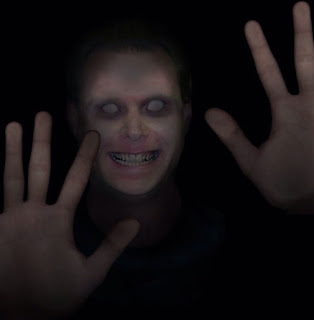 She tried to laugh again, but it was forced. ‘I suppose I’m right where I need to be now. I’ve always been nervous at night. Ever since Kenny died. So, it was a severe one in my case, but I was the show’s director, after all … heaven knows what’s going to happen to you and Erika.’
She tried to laugh again, but it was forced. ‘I suppose I’m right where I need to be now. I’ve always been nervous at night. Ever since Kenny died. So, it was a severe one in my case, but I was the show’s director, after all … heaven knows what’s going to happen to you and Erika.’ ‘Fiona,’ he said tightly, ‘you’re the fairy tale expert … tell me.’
‘Oh, my dear, there are no experts. That’s likely why Nils Karlsson had to die. You can’t make deals with these people simply by reading books and working rituals, even over so many years … oh yes, doctor?’ Suddenly, she was talking to someone else. ‘Oh, yes. Just a friend … well, if you insist …’
The line went dead.
Alex stared at his phone, the firelight flickering in its empty screen.
Fee Havergood was one of the most stable characters he knew: organised, straightlaced, ridiculously well-educated. In no way a flake. If anyone else had said those things to him, it would have sounded like utter gibberish. Frenziedly, he bashed in another number.
‘You’re not dead, Jimbo,’ he said under his breath. ‘You’re just not.’
No one answered. And now something else was shot-firing inside his head. Something Fiona had said. It had been a throw-away reference, something she’d mentioned almost casually, and yet it was relevant, he was sure, because he’d seen it somewhere before …
Yule Lads.
He stiffened.
Yes … the Yule Lads. Dear God, that book in which Nils Karlsson’s mugshot was inserted.
Alex galloped through to the kitchen, where the book was still lying on the sideboard, the photograph hanging out of it. He flipped to that page.
Yule Lads
As he scanned down past the crude image of carved stonework, he was only able to absorb bits and pieces of the text, but each fragment was nerve-jangling in its import.
Among the most feared beings in the Icy Realm … wild spirits of the frozen mountains and snow-filled forests …
December 15: Þvörusleikir (Spoon-Licker), stealer of health …
December 21: Gluggagægir (Window-Peeper), stealer of privacy …
December 22: Gáttaþefur (Doorway-Sniffer), stealer of scent …
December 23: Ketkrókur (Meat-Hook), stealer of flesh …
December 24: Kertasníkir (Candle-Taker), stealer of light …
No magic can repel them, no hero defeat them. They fear nothing save their own voracious parents, who are always close by, the ogre, Leppalúði, and the hag, Grýla …
Alex ran back through the house. This was insane, of course. It had to be. Norse mythology, folklore, fairy tales?
‘What next?’ he muttered. ‘That dwarf off the Singing fucking Ringing Tree?’
But just because these entities didn’t exist, that didn’t mean there weren’t lunatics out there who believed they did.
‘Erika!’ He lurched into the dining room. ‘We’ve got to …’
The table was laid with expensive crockery and glassware, but the room was empty. The music now came from the lounge, which meant that Erika had taken her iPod in there. When he entered after her, she was dancing barefoot, in her ski pants and vest, her supple, firelit form twirling and pirouetting with sensual grace.
‘Erika!’
She stopped, pink-cheeked, smiling mischievously.
‘We’ve got to go,’ he said.
Her mouth curved downward. ‘Go where?’
‘We need to leave the …’ His gaze flirted to the conservatory, where he’d just spied a flicker of movement. This time it wasn’t snowflakes tumbling past the pane.
He rushed in there. The deluge outside was reminiscent of a Hollywood movie, except that this was real snow, not an inexhaustible supply of goose down. Even so, for a half-second, he glimpsed a tall figure in a heavy coat, with a hood pulled up, walking away across the lawn.
‘Bastard!’ Alex dashed back through the downstairs to the kitchen, and then outside.
Here, he halted. He hadn’t got his coat, gloves or scarf. But there was no time for that. An intangible foe was something to be feared, but when you had them in your sights, you didn’t let them go easily. He scrambled to the first corner of the house, where a three-foot length of rotted iron pipe, a leftover from the restoration work on the guttering last summer, was propped against the wall. He snatched it up. He wasn’t going to hit anyone, he told himself, as he ploughed into the flakes. That wasn’t his aim. But whoever this person was, he’d come all the way from Bannerwood. He’d been stalking them, and that meant he was trouble.
But even before Alex reached the trees, a mere distance of thirty yards, he knew he’d made a mistake. He was caked in snow. It even slithered down the back of his sweater. He blundered on defiantly. A wall of vegetation reared ahead, the wood’s outer bulwark, composed entirely of privets, so they were meshed together and laden with white.
He fought his way through. ‘Who are you, you scumbag? What do you want?’
In the wider spaces beyond the privets, the flakes drove into him like arrows. Already his fingers were numb, his toes tingling inside his socks and trainers. And now the wind was picking up too, adding a sword’s edge. He was still determined that he wasn’t going back. He’d known plenty rough characters in his past, so he’d certainly show this toerag, this unknown enemy, this faceless intruder who’d already killed Jimmy Groober.
Alex stopped hard, face burning with cold, lungs heaving.
Killed Jimmy Groober?
Had he really done that?
This same person?
‘Shit.’ Slowly, common sense worked its way back through thoughts rendered chaotic by anger and fear. With another savage gust, snowflakes whipped into him.
‘Okay … I’m out of here. We’re out of here.’
He blundered round and plunged back the way he’d come … only to rebound from a huge, solid object. Alex tottered away, winded. But when he wiped the flakes from his eyes, he saw that it wasn’t a tree trunk, as he’d thought. It was a figure. Covered in snow, but standing stock-still in the grey/white murk, the face under its pulled-up hood completely wrapped with ragged old scarfs. Alex might have been more horrified had he not now been so pained and exhausted by the chill. The grotesque shape remained motionless, towering over him. If it had been a tallish figure in the shopping mall, it was all that and more now. Alex offered the length of pipe as he retreated, showing that, whatever was afoot here, he’d be no soft touch. But when the figure made no move towards him, he turned and ran – and thudded headlong into a second interloper, near enough identical to the first, equally solid. He staggered back, winded again, now caught between the pair of them. You two will be the final two … the ones they’ll have reserved harshest judgement for.
‘That what you’re planning?’ Alex shouted. ‘Well, go on … bring it on!’
Neither figure moved, but as Alex was closest to the second, he saw that it was holding something in its gloved left hand. It hung down, but was clearly visible as a large, steel hook.
Ketkrókur (Meat-Hook), stealer of flesh …
‘Oh yes?’ Alex laughed dementedly. ‘That’s for me, is it? You think it’ll be that easy!’
He ended on a shriek as he lurched forward, swinging the pipe two-handed into the figure’s torso. There was no give in it. The pipe rebounded and the figure didn’t even flinch. Alex swung again, this time making huge impact on the side of its head. Again, no response. He might have been hitting granite. Briefly, disbelievingly, he wondered if he was … though this second time, the scarfs came partly loose, exposing the top left-hand corner of the figure’s face, which even in the dimness, was quite clearly made from some smooth, pale, porcelain-like substance, with a small black hole where the eye should be.
Alex raised the pipe again but saw that it had bent double. He flung it at the figure, and turned to run, veering around the first ghastly shape, which didn’t lunge out to grasp him, as he thought it might, plunging into yet more snow-clad evergreens. He burrowed through these, and beyond them, caught the full force of the intensifying blizzard, flakes gushing over him like water. He struggled to breathe as he turned in helpless circles, flailing.
What was this? Where in God’s name was he?
The Icy Realm …
He didn’t even know what those words meant. But he wasn’t in the Lake District anymore. He wasn’t even in England. He knew it from the way the snowfall swamped him, from the wind that blew ever more ferociously as if it travelled down through vast, glacier-gouged canyons, across pack-ice and desolate, frostbitten tundra.
And then, without warning, a glaring light engulfed him.
Alex shielded his eyes as a pair of dazzling headlamps slid to a screeching halt.
A door banged open, and he heard Erika shouting.
‘Alex, for God’s sake! What’re you playing at?’
Halfdead, he tottered towards her, working his way hand over hand along the Jaguar’s body to the passenger door, flopping in through it like a stuffed, sodden dummy. ‘What … what’re you doing here?’ he stammered as she got in as well.
‘Are you kidding?’ She’d packed herself into her puffer jacket but was still shivering. She put the car in gear, and it scrunched forward along the drive. ‘You said we have to get away, so we’re getting away. I don’t know why … can’t see where we’d want to drive tonight. I’ve never seen a snowstorm like this.’
Alex, almost zoning out in the astounding warmth, shook his head weakly. ‘I … I don’t think there’s anything natural about it.’
‘What do you mean?’
‘Just keep driving.’
‘I can’t see a damn thing.’
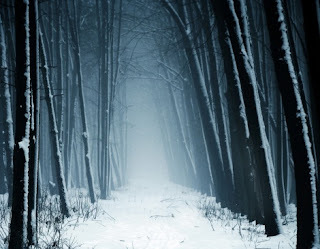 ‘Just get us away … anywhere away from here.’
‘Just get us away … anywhere away from here.’ He glanced back over his shoulder. In the cherry-red glow of the taillights, the driveway was a white tunnel filled with flakes. But there was no sign of anyone following. Erika braked as they approached the gates.
‘Don’t slow down!’ he barked.
‘God’s sake, Alex … I can’t pull straight out. Where are we going, anyway?’
‘Left.’
She hit the gas as they turned left, the Jag fishtailing.
‘What did you mean it’s not natural?’ she said.
‘Nothing. Turn of phrase.’ They wallowed on, at no great speed, the road ahead shifting in and out of visibility. ‘Need to go faster than this. Need to go much faster.’
‘You try it,’ she retorted. ‘That scraping sound’s the car’s belly dragging along the top of the snow. We’re going as fast as I dare. Besides, I don’t think I should be anywhere near the wheel of a car at present.’
‘What’re you talking about?’
‘Alex, in case you’d forgotten, I’ve had more than a couple of glasses of Cointreau.’
He regarded her long and hard. He ought to have realised from her jerky driving, of course, not to mention her slurring voice.
‘How far are we going?’ she asked.
‘Just get us a bit further away,’ he said. ‘Get us to the M6 junction and I’ll take over.’
‘The M6!’ She looked startled. ‘Why are we going there? We’re not going home, are we?’
He shrugged. ‘Only thing we can do.’
‘Hang on!’ Finally, she got angry, pressing the accelerator harder, the Jag bouncing and jolting, the car’s rear end striking the snowbanks both left and right. ‘I’ve not brought any of our stuff …’
‘None of that matters.’
‘Alex, are you high?’
‘Erika …’
‘Look, I’m not going all the way home.’ She glared at him as she drove.
Erika was a compliant partner when it suited her. That was most of the time. But not always. ‘Everything we’ve got’s at the Farm. What’re we going to celebrate Christmas with?’
‘Whoa … whoa, ERIKA!’
She hadn’t seen the sharp curve, or the snow-covered gate directly in front. It was made of steel, but only held by a single loop of chain, so at thirty plus, they crashed clean through it. Erika hit the brakes, screaming, but of course that did nothing. The next thing, they were careering down the steep hillside into Swindale like an out-of-control toboggan, the car turning sideways, every window plastered white.
By the time they hit something, they’d picked up terrifying speed. The Jag’s engine stove in like an accordion, and both passengers were thrown violently forward. The combination of seatbelt and airbag saved Alex any serious injury, but Erika, drunk, hadn’t bothered with her belt, and as the car struck at an angle, her airbag didn’t prevent her slamming head-first through the side window, into the corner of a drystone wall tangled with barbed wire.
Even then, it was several minutes before Alex, dazed by the body-blow his belt had dealt him, kicked open his buckled door and fell into what felt like a foot of crisp snow. He crawled painfully away from the steaming, written-off wreck on his hands and knees.
‘Alex …’ came a weak, whimpering voice. ‘Alex … help me …’
What seemed like minutes passed before he could sway to his feet and turn groggily round. He’d only travelled twenty yards or so, but despite the light still shafting from the twisted hulk of his car, it was only barely visible.
‘Alex ...’ came Erika’s voice again. To his surprise, her silhouette stumbled into view. ‘Alex, I can’t see. Her tone turned shrill. ‘For God’s sake, I can’t see … I’ve hurt my eyes …’
She lurched blindly towards him, reaching out on all sides. Dark viscous streaks marked both her cheeks. Alex’s own blood juddered in his veins.
Kertasníkir, stealer of light …
He backed away. ‘Erika, you’ve got to stay here, okay? Just stay here while I get help.’
‘Alex, my eyes …’ He’d never heard a voice so wretched, so tortured, so anguished.
‘Find yourself a tree. Rest against it. I’ll be back as quick as I can.’
He waded downslope. Ironically, the snowfall now seemed to be easing off. He halted again, looking up and around. The flakes were definitely thinning, the wind slackening.
‘Alex, for God’s sake!’ Erika wailed. ‘My eyes … don’t leave me.’
He continued down. ‘I can’t take you with me.’
‘Alex, please …’
Overhead, what remained of the clouds broke apart, revealing a blaze of winter stars. A silvery light spread across the snowy landscape, and he saw that the ground in front of him was levelling out. He also saw the glinting flat surface of the ice-covered beck. He tottered to a halt on the edge of it. The ice looked sturdy, but he didn’t try to cross, instead heading right, following its course. Which proved the correct decision, because a short distance later, further to his right but on higher ground, he spied the dull, ruddy glow of what looked like a cottage window. He stopped, racked with aches and pains as his adrenaline ebbed, but looking hopefully upward. Who was it lived there?
The Elwells, of course. Who else?
Even as he peered up, he saw another light appear, as if the cottage door had opened. They were used to the quiet in this part of the world, so they’d have heard the crash. With luck, they’d also see the lights of the car. He was about to hail them, when …
‘Alex … for God’s sake!’
He twirled, infuriated to see that Erika had tried to follow him. Though of course, she didn’t know which way he’d gone, and now was stepping out onto the beck.
‘Erika!’ he croaked.
She was forty yards away, though; she couldn’t hear him. And in any case, she was already out there, shuffling forward. ‘Alex …?’
He watched helpless, as, almost in slow motion, she lost her footing and fell heavily onto her front, hitting the frozen surface full-length. And vanishing clean through it, a great slab of ice tilting up next to her, then falling flat again, reinserting itself neatly into the human-shaped hole.
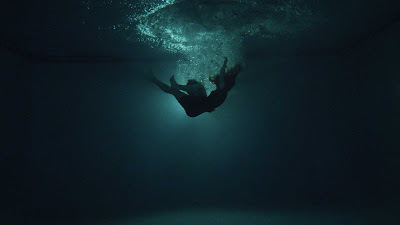 A second later, only powdery snow moved, blowing in wisps over the white-topped river.
A second later, only powdery snow moved, blowing in wisps over the white-topped river. Alex was so battered and bruised that he couldn’t even totter forward to try and help, not that he’d have been in time. In addition, he was so nauseated by fear and shock that he had little bandwidth left with which even to feel upset. Instead, he swayed there, dazed, before slumping backward into the snow. All he could do was sit and stare over the ice.
‘Bastards,’ he breathed again. So thinking, his eyes tracked up the hillside to the road.
It was no surprise to see two figures up there, framed motionless against the moon.
‘Okay, you got her!’ he shouted. ‘All that’s left is me, yeah? So, come on down. Finish what you started. Or are you too scared?’
To his surprise, neither figure moved. And then the phone pinged in his pocket. Briefly incredulous, wondering if this might be them, he fished it out. And saw a text from Des Hepworth.
Hello, mate … I was going to hang fire with the Heidi Prince write-up, but I promised I’d send you something. I’ve not pasted the whole thing in because … well look, it’s nothing to worry about. It’s one critic’s viewpoint, but I won’t pretend she hasn’t ripped you apart. She’s worried that you’ve been going off the boil for a while, but she thinks this one really doesn’t cut it. Says it’s shallow, superficial. Says there’s no meat on it …
‘No meat?’ Alex was speechless at first. Then he laughed out loud. ‘No meat! For real?’
He gazed up to the ridgeline again. His duo of tormentors remained in place. Black, anthracite outlines. Motionless.
‘Is that it?’ he shouted. ‘Surely to God not?’
But hey, maybe it was. The other deaths had been accidents, hadn’t they? Jimmy … Erika. Not that he hadn’t been punished. He glanced at the text again. ‘My worst fear?’
Not that it seemed a big deal at present. It would later, of course.
Behind him, he heard people scrambling down the hillside from the cottage. The Elwells. Hopefully bringing one of those thick plaid blankets they had in their croft. Maybe a thermos of hot coffee too. When he tried to get to his feet, pain rippled through him. He stayed seated, glancing back up to the road again, from where the two figures had clearly retreated because they were no longer in sight.
‘Yeah, you’d better run,’ he jeered. ‘Meat-Hook! Scariest thing about you is your name.’ He tried to look round again, but the whiplash hurt too much. ‘I’m down here!’ he called. ‘Jack … Hetty! It’s Alex McQuade. I’m down here.’
From the grunts they made as they descended the slope it was an effort for them too. And it should be, at their age. No wonder they spent every Christmas down south …
With their kids and grandkids …
A new, different kind of chill crept down Alex’s spine.
When he finally did look round, they were almost upon him. Lurching forward across the snow with unnatural speed.
The Yule Lads fear nothing … save their own voracious parents.
Alex had just enough strength left to scream.
He hadn’t considered how many kinds of meat there actually were.
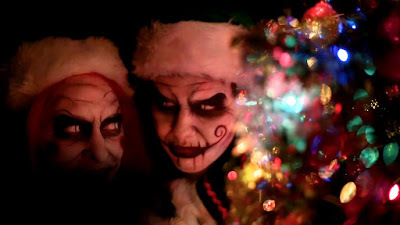
I hope that was okay for you good people. If you’ve enjoyed this eerie tale, perhaps you’ll be interested in two collections of Christmas-themed ghost and horror stories of mine, published over the last few years: THE CHRISTMAS YOU DESERVE and IN A DEEP, DARK DECEMBER. Or, if you prefer something a little more substantial, you could always opt for SPARROWHAWK, a Christmas-themed novella of mine, set during a very cold winter in the dark depths of Victorian England. In the meantime, have a very merry Christmas and a happy New Year.
December 15, 2023
Fancy some festive terror in the Icy Realm?
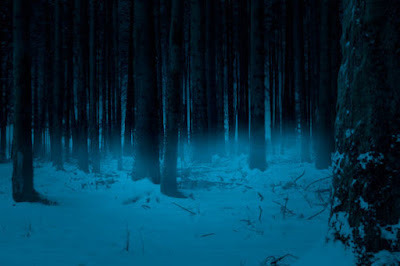
Well, it’s not quite time to start the festivities yet, but I thought I’d get the ball rolling a few days early with my annual Christmas horror story. I’m not going to go on and on about the tradition of ghost and horror stories at this time of year. We all know the drill by now (and we all love it, don’t we, eh?). Anyway, this is a brand new one. It’s got a wee bit of length on it, so I’m running it in two sections. This is Part 1. If you’re suitably intrigued, tune in for Part 2 this time next week, Friday December 22, when we conclude the tale. Hope you enjoy …
THE ICY REALM1
Alex was driving out of the multistorey when he received a call from Jimmy Groober.
‘Jimbo?’ he said.
‘Alex … mate!’ The caller sounded strained. ‘Just wait …’
‘Jimmy?’
From the grunting and panting, Jimmy was in some kind of kerfuffle. It so distracted Alex that he drove straight into the rush-hour traffic. Horns tooted as he swerved into line. Hurrying pedestrians glanced at him from under their bob-caps.
‘Jimmy?’ he said again. ‘What’s the matter, mate?’
If he was honest, he was tired rather than concerned. He’d had a wearisome day. He didn’t need another problem on his plate right now.
‘Alex … listen to me. I’m telling you, you’ve got to listen!’
‘Okay, I’m listening.’
‘Where are you?’
‘Northwestern Station. Just got in from London. I’ve been …’
‘When you get home, you’ll find a package waiting.’
‘What?’
‘A Christmas present.’
‘Okay.’ Alex was mystified. ‘That’s nice.’
‘No, it isn’t. It really isn’t. Listen, buddy … whatever you do, don’t open it, okay? Do not open it.’
‘Jimmy …?’
The call ended.
Alex sat nonplussed as he swung left onto the one-way system. Fleetingly, he saw only the snowflakes driving at his windscreen. Jimmy Groober was the most down-to-Earth bloke he knew. A regular drinking buddy, he was a decade older and calmer than Alex, and as blue-collar as they came. He wasn’t the sort who got upset easily. He wasn’t the sort who got upset at all. Alex thought about calling him back, though he’d look a fool if it turned out to be a wind-up. Jimmy could be a joker when the mood was on him, though this hadn’t sounded like something humorous. He was a good actor, of course. Only at amateur level, though he’d possessed enough talent to go professional if he’d ever bothered trying. Even so, that voice had been desperate, filled with worry and … could it have been fear?
Alex jammed his brakes on.
Some idiot of a woman so loaded with brightly-coloured parcels that she couldn’t see where she was going had blundered into his headlights. She waved an apologetic mitten as she stumbled across the road. Alex drove on. It had been partly his own fault; he wasn’t paying adequate attention. Plus, the snowfall, while it wasn’t heavy, was a distraction. He hoped it would ease off before the end of the evening, as they were driving up to the Lake District first thing in the morning.
When he was away from the town centre and the traffic had thinned, he called Jimmy back. Three times, but on each occasion it went to voicemail. Well, whatever the problem was, he’d find out about it in time. It wasn’t as if he didn’t have difficulties of his own.
*
The main issue was Dark in the Park, Alex’s new play. It opened at the Young Vic in January, and that afternoon had been the run-through for the press. Alex knew from long experience that a writer wasn’t always the best judge of his own material, but even so, having watched it from the back of the theatre, from the wings, the gods, just about everywhere, he’d been thoroughly dissatisfied. And it hadn’t just been him. After the show, those critics who’d deigned to go into the bar had been lukewarm in their response. Okay, few of them ever gave anything away purposely, but you could usually tell if they’d enjoyed something. Even Heidi Prince from the Guardian, who was generally a fan of his, and a close friend of director Des Hepworth’s, had been noncommittal.
‘I’ll need to mull it over, darling,’ she’d said on her way out. ‘Let it percolate.’
That had hardly been encouraging. But if Alex was honest, his own concerns were foremost in his mind. It had been a polished enough production. The performances were topline, as you’d expect. But it had been the play itself. It simply hadn’t delivered, and he couldn’t understand why this hadn’t struck him previously. He’d written umpteen drafts before it had gone to rehearsal. He’d made constant adjustments, run it through again and again, workshopped it tirelessly, and each time he’d felt that it was getting better and better, until he’d finally been certain he had another hit on his hands.
And yet now, for reasons he couldn’t fathom, something was lacking.
Parking at the front of the house, he sat there as the engine cooled. He wondered if he was just worn-out. There’d been much toing and froing to London this last month, which was a four-hundred-mile round trip. Then there’d been all those rewrites and rehearsals.
Oh, it was all lovely, it was great, it was the best job in the world, but it was draining.
‘Yeah.’ He wound his scarf round his neck and climbed from the Jag.
He was wiped out, plain and simple. Which wasn’t helped when he saw that the house was in darkness, because this meant that Erika wasn’t home yet.
Sarah wouldn’t only have been home by now, she’d have had all the lights on, including the Christmas decorations, and the first thing he’d smell on entering would be whatever delicious treat she’d prepared for their dinner. He knew it was sexist and old-fashioned of him, but to be fair, Erika taught dance at the local Technical College. She normally finished at five, and it was now after seven and there was still no sign of her. Almost certainly, she’d gone for a drink with friends. He supposed that with it being Christmas Eve tomorrow, it was fair enough. But it did bug him given that she knew he’d been in London all day and still wasn’t here. He crossed the drive to the front door, feet crunching the thin carpet of snow, and only then remembered Jimmy Groober’s odd warning.
You’ll find a package waiting for you. Whatever you do … do not open it.
There was no package there. Alex let himself in. A couple of bills had been stuffed through the letter flap, but there was nothing inside either, not even a chitty from a delivery service to inform him that they’d left a parcel in the shed. Damned if he was worrying about it, he went around the house, turning lights on. At least, the central heating had activated. He stumped upstairs to have a shower. If nothing else, the hot spray relaxed him. Which was why he almost jumped out of the cubicle when its misted door was suddenly yanked open, and a hand gripped his privates.
‘Bloody hell, Erika!’ he muttered. ‘Didn’t even know you were home.’
‘Came in the back way,’ she giggled, sliding naked into the cubicle alongside him.
She had short spiky blonde hair and a trim but shapely body. When she embraced him face-to-face, he smelled the Cointreau on her breath, but it wasn’t excessive, and he reminded himself again that this was the start of the Christmas holiday.
‘Awww … did I scare you?’ She pecked him on the lips.
He tried not to sulk with her, which wasn’t difficult. It wasn’t as if she’d deliberately sought to surprise him. She usually parked her Juke at the side of the house and came in through the back door, which was why he hadn’t heard her. That was a bit naughty, of course: drinking and driving home, especially at this time of year. It wasn’t the first time, either, and that was something he’d need to admonish her for. Though perhaps not at this moment. Her slim form melded into him as they kissed.
Erika was thirty now, but over twenty years his junior, and a sylphlike beauty next to his craggy, burly, bearded self. Alex was under no illusion that the advantages of this relationship outweighed the disadvantages.
Later, when they went downstairs in their dressing gowns, she suggested a takeaway.
‘Good shout.’ He settled onto the sofa, fiddling with the TV remote.
She dug into the top drawer of the bureau. ‘Indian, Chinese, Thai?’
‘Any,’ he said.
‘That reminds me …’ She opened her laptop to access Just Eat. ‘There was a package for you at the back door. It’s over there.’
Alex stared across the room at the small, square parcel sitting on the bureau. It was about half the size of a shoebox, wrapped in shiny green paper and tied with a scarlet ribbon.
‘Who brought it?’
‘Dunno. Shall we do Chinese? Have our usual banquet for two?’
‘And it’s definitely for me?’
‘Course it’s for you. There’s a tag on it … strange message though.’
‘What do you mean?’
‘Go and have a look. Won’t bite you.’
Alex went over. There were actually two tags. The first one read: For Alex. Merry Xmas. The second one: Don’t wait till the big day. Open now.
Some kind of joke, almost certainly. Something heavy shifted inside.
‘Banquet C?’ Erika suggested.
‘Yeah, that’s fine. You had any contact with Jimmy Groober recently?’
‘Only when you last did. When we were down the Star and Garter.’
‘It’s just that, well …’ He mentioned the odd phone-call.
She arched an eyebrow. Then gave that fetching lop-sided pixie grin of hers. ‘There you go. Just up Jimmy’s street, that. Probably some kind of jack-in-the-box. Boxing glove on a spring. It’ll punch you on the nose when you open it.’
Alex put the parcel back on the bureau. ‘For which reason, we’ll leave it.’
‘Don’t believe in opening them early anyway,’ she said. ‘Sort of thing that brings bad luck.’
‘What do you mean?’
‘You know, breaks the rules. And we’ve got a long drive tomorrow, and now they’re saying it’s going to snow all night. Everyone says they want a white Christmas, but if you’re not ready for one, it can end in disaster.’
‘Good Lord, Erika … let’s not tempt fate.’
‘Don’t be silly, I’m only joking.’ With a final tap on the keyboard, she placed their order. ‘We’re spending Christmas at the Farm. You’ll be among friends and loved ones. What could go wrong?’
‘What could go wrong is that we’ll be in the middle of nowhere in a winter storm.’
‘We’ll be fine. This is England. Not Iceland.’
*
Alex sat up in the pitch darkness, unsure what had woken him.
His house was located on a suburban cul-de-sac, so noises late at night weren’t unusual. But all he heard now was dead silence. It was an affluent cul-de-sac of course, which meant the houses were large, detached and set back from the road, and from each other. So, while it might not be completely unusual to hear the neighbours, it wasn’t common either. Besides, though he couldn’t be certain what he’d just heard, he knew instinctively that it hadn’t been outside, but in. He scrabbled on the bedside table to find his glasses, gazing across the room at the digital clock, which read 03.15. Swinging his legs to the floor, he fumbled with his feet for his slippers. Getting up, he grabbed his dressing gown from the armchair.
‘What is it?’ Erika mumbled.
‘Nothing. Go back to sleep.’
He took the baseball bat from the side of the bed.
‘Alex?’ Erika said, now wide awake.
There was no concealing it from her. She’d long lived in fear that a celebrity like him might be a target. Alex had advised her a hundred times that he wasn’t a celebrity. Okay, he’d been fêted in the West End, where they’d all been seduced by his work’s ‘roughneck charm and working-class honesty’ (Heidi Prince again), but who in Lancashire knew about that?
‘Do you have your phone?’ he asked.
‘Yeah. Why?’
‘Keep it to hand, okay. Stay here.’
He padded along the landing to the staircase, the top of which came slowly into view as his eyes
 attuned. He listened again but heard nothing.
attuned. He listened again but heard nothing. There were all kinds of unwritten rules about what you were supposed to do in situations like this. Stay in your room, barricade the door, call the police. Or maybe turn all the lights on: let the bastards know you’d sussed them; give them a chance to escape before contact was made. Or alternatively, creep down with bat in hand and beat the living shit out of them. That was how they’d have handled it in the part of town where he’d grown up, and maybe it was this that started Alex downstairs, but he wasn’t kidding anyone. His street-fighting days were long behind him. The truth was though, that somehow, he knew this wasn’t an intruder. It was far below zero outside. He couldn’t imagine there were many bone-idle scallies who’d put a foot out of bed on a night like this, let alone go on the rob. But it wasn’t just that, it was the silence down there. There was something calm and relaxed about it, no hint of a foreign presence. He stopped to listen again, but now – call it instinct, call it sixth sense, hell, call it ‘spider sense’ – he felt increasingly certain that nothing was amiss.
He crossed the hall to the open lounge door. It was particularly dark in there because the Christmas tree, which was a massive affair, laden with baubles and streamers, was standing in front of the window. Despite that, a faint silvery light shimmered out, and he fleetingly saw flutters of movement in it. That stopped him in his tracks until he realised it was the snowflakes falling outside.
He went in, slapping the light on.
The lounge was empty. He pivoted, scanning every corner.
And sensed movement.
A white-faced figure appeared at his shoulder.
‘God almighty!’ he yelped.
‘It’s me,’ Erika said, tying her dressing gown.
‘I told you to stay upstairs.’
‘No way, mister.’
‘Well … everything’s okay, look.’
But that wasn’t totally the case. They searched the whole downstairs, finding nothing out of place, but when they came back into the lounge, they this time spotted something. The unopened present on the bureau now lay on the floor. It had been dislodged by a single item that had fallen from the wall. The entirety of the lounge, in fact most of the downstairs of Alex McQuade’s house, was decked with framed promotional posters from his many plays.
This was one of them.
‘That’s all it was?’ Erika said. ‘A loose nail?’
Alex picked the image up. Its frame had broken, and the glass was cracked, but it was still possible to see the stylised artwork underneath. It depicted a madly capering, goblin-like figure with a rollcall of traditional pantomime caricatures behind it: the Dame, the Principal Boy, Baron Hardup, and so on. Across the top, in snow-capped letters made from what appeared to be twisted-together twigs, it read:
RUMPLESTILTSKIN
‘Jimmy Groober was in that show, wasn’t he?’ Alex said uneasily.
‘Think that was his first, wasn’t it?’ Erika replied.
Alex threw his thoughts back ten years. Rumplestiltskin had seen Jimmy Groober, a natural born comedian and fellow stalwart of the Bannerwood Players, their local amateur dramatics society, make his debut as the pantomime dame, a role in which he’d brought the house down. Ever since then, the annual panto had been the highlight of the Players’ season (this year they’d done Mother Goose, and it had gone down a treat), and Jimmy Groober was one of its regular stars.
Alex put the picture down and picked up the present. With a vicious rip, he tore it wide open. Under the wrapping was a small cardboard box. He tore that open too. A potato sat inside. Old and rather withered. In fact, from the faint aroma, it was turning rotten.
Erika giggled. ‘If that isn’t a present from Jimmy Groober, nothing is.’
Alex didn’t laugh. ‘Jimmy’s pranks are normally funny.’
*
The journey north was not too difficult. The M6 was busy with Christmas traffic, but the constant flow of vehicles had kept the road surface warm, so while the surrounding moors and hills were blanketed with snow, the carriageway was clear.
Erika was happy to drive, while Alex sat in the front passenger seat, laptop on his knee, trying to figure out exactly what it was about Dark in the Park that just wasn’t working. At no stage though was he able to establish the problem, or problems, and he suspected the latter. The truth be told, none of his usual creative juices were flowing, his thoughts so awry that he couldn’t come close to interrogating the work the way he normally did when a rewrite was required, not of course that a rewrite would be welcome at this late stage.
It didn’t help that he was distracted by other things.
‘Funny that Jimmy Groober wasn’t in, this morning, wasn’t it?’
‘I don’t see why,’ Erika replied.
They’d been delayed setting out because Alex, having rung Jimmy a couple more times and received no answer, had gone round to see him, only to find his small, terraced house sitting behind closed curtains. No amount of knocking had brought anyone to the door.
‘Probably gone to his sister’s,’ she said. ‘Doesn’t he have a sister down in Norfolk?’
‘Think so, yeah.’
It was a viable explanation, Alex supposed. If not his sister, confirmed bachelor Jimmy had a range of other ladies dotted around whom he still had amicable relationships with; sometimes more than that, even at sixty-five.
Alex didn’t bother saying that this didn’t explain why the guy wasn’t answering his mobile. He called again while they drove, twice, but no answer was forthcoming. He even called Fiona ‘Fee’ Havergood, another mutual friend of theirs, who’d been the original director of Rumplestiltskin, but she wasn’t answering either.
He closed his laptop. ‘Weird idea for a panto, wasn’t it? Rumplestiltskin.’
‘It’s ten years ago,’ Erika said. ‘What’re you moidering about?’
‘I’ve never seen it done anywhere else.’
‘It was partly Fee Havergood’s idea, wasn’t it? She’s the “well-loved tales” expert. Anyway, think of all the fun me and you would never have had, if we hadn’t done it.’
Alex mused. A decade ago, the Bannerwood Players were struggling: understaffed, playing to half-full houses, unable to make the rent even on the scruffy old mission hall at the back of St Simeon’s Church. At the request of retired college lecturer, Fiona Havergood, the only other company member who was a professional author, though in her case it was kiddies’ fiction, he’d taken time out of his busy schedule to write Rumplestiltskin for them, and it had worked on all kinds of levels. Not just because he’d presented them with an exclusive and quality piece of work, but because he’d used all his pulling-power with the theatreland press, who’d responded generously, giving it rave notices. Even a couple of the nationals gave it glowing write-ups. Audiences had packed that hall for twenty nights on the bounce, and the Players had never looked back.
‘Good job you cast me, eh?’ Erika said, giving him a saucy look.
‘I didn’t cast you. It was the Casting Committee who cast you.’
‘Anything you say.’
The Bannerwood Players had never been less than extremely grateful to have a popular playwright like Alex McQuade as a member. Perhaps unsurprisingly, he still exerted influence down there, even though he didn’t participate much in their productions.
‘It wasn’t like you weren’t the best at the audition,’ he said. ‘By a country mile.’
Even now it had been memorable, the shapely young dancer in her fiendish green face-paint, her trim body lithe and flexible in its green leotard, twisting and turning in that sexual yet menacing manner, delivering each line with a catlike hiss.
‘There was that other guy too,’ she said. ‘What was his name? Nils something?’
Again, Alex threw his mind back. He’d been involved with so many shows since then that he struggled to remember. ‘Nils Carling? He was okay. But he wasn’t a patch on you.’
‘Really set his heart on getting that part, didn’t he?’
‘Wish I had a quid for every actor I’ve seen make that mistake over the years.’
‘Didn’t he walk out on the Players afterwards?’
‘Wish I had a quid for every time that’s happened too.’
‘Anyway, what was weird about it?’ she asked. ‘Rumplestiltskin?’
‘Dunno.’ Alex pondered. ‘It’s a creepy story as fairy tales go. Whole new level of goblin nastiness.’
‘Goblins are nasty, aren’t they? It’s Enid Blyton who gave them their back garden makeover. You wouldn’t want to know the real ones.’
‘Real ones?’
‘I meet them all the time,’ she said. ‘Whenever I’m round town. Even in the posh bars. “Any chance of a Christmas kiss, love?” “How about some festive slap and tickle?”’ She glanced sidelong at him. ‘You don’t know how lucky you are, mate. And you still haven’t got me into the big time.’
‘I’ve told you …’ Alex gazed ahead. ‘When the right part comes, I’ll push you forward.’
‘Doesn’t have to be the right part. Any part will do, so long as it gets me an Equity card.’
‘An Equity card isn’t the be-all and end-all. You want to make an impact, it needs to be the right part, trust me.’
‘Well, you write the parts. It’s all in your hands.’
But she didn’t hammer this point too hard. Erika usually knew when enough was enough.
Ahead of them, the Lake District fells were stark, soaring massifs of rock and snow.
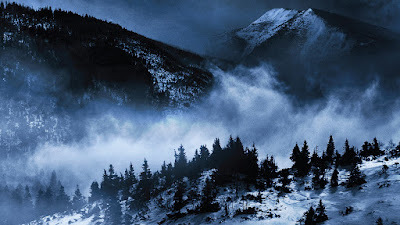
*
‘Hello, Fee,’ Alex told the answering machine. ‘It’s Alex McQuade. I’ve been trying to get Jimmy Groober, but he’s not answering. I know that doesn’t necessarily mean there’s anything wrong, but … well, you’ve not had any contact with him, have you? Feel free to call me back. I know it’s Christmas, but I’m always happy to chat.’
He glanced from the car to where Erika was taking the bags in through the side door. The Farm looked gorgeous in its winter finery. The house itself wasn’t pretty, a sprawling structure of granite with various wings and annexes, multiple chimneys and different-levelled roofs of heavy slate. But it was in a beautiful if remote position, on high wooded ground overlooking Swindale. The expansive lawn at its front and the encircling woods were already deep in snow, the steel blue sky only intensifying its glimmer.
Alex had bought and renovated the place, making it into his personal weekend retreat, over a decade ago, after the phenomenal success of Witchcradle had ‘catapulted him into the top bracket’, to quote the Sunday Times. This was probably the prettiest he’d ever seen it, and yet he still wasn’t able to relax, and that wasn’t just down to his sudden inability to string two words together, though that was troubling enough. Again, during the last twenty minutes of the journey, he’d delved into his laptop, trying to fix Dark in the Park, but as before, hadn’t been able to pinpoint the problem let alone perform some corrective surgery. Frankly, the last time he’d looked at it, it had been nothing more than a higgledy-piggledy mass of disjointed words and ideas. Oh, it ran smoothly enough when he read it aloud, but where was the meaning, what was the subtext?
Determined that he wouldn’t look at it again until Christmas was over, he got out of the car and grabbed what remained of their baggage.
Inside the farmhouse, most of the olde worlde layout remained, so it was a rabbit warren of passages and small rooms. The two largest were the lounge/conservatory, which was at the far side of the house, the view from its glazed annex looking down through a break in the trees, along the length of the immense, picturesque valley that was Swindale, and the kitchen, where the central table could seat sixteen and the huge cast-iron range was an Edwardian original. He’d had storage heaters installed, because the place could be bitterly cold in winter, and was pleased to see that the two caretakers, Jack and Hetty Elwell, who lived in a small croft just down the valley from here, had turned the heaters on in time for their arrival, and had tidied the interior up nicely, hanging it with festive greenery, before heading south to spend Christmas with their children and grandchildren, which they did every year.
 Erika was in the conservatory, the central feature of which, the hefty spruce fir, was festooned with crackers and tasteful, hand-carved ornaments (many, no doubt, Jack Elwell’s own work). She peered down the valley, which was almost Alpine in its grandeur, Swindale Beck a frozen ribbon meandering along the centre, clumps of pine standing out from the snow here and there, and tucked away high on the northwest flank, the Elwells’ cottage, which was tear-jerkingly reminiscent of so many Christmas miniatures he’d seen over the years. ‘As a child, I used to dream of festive seasons like this,’ Erika said. He stood behind her. ‘You should’ve been around in the Seventies and Eighties. We had them regularly.’
Erika was in the conservatory, the central feature of which, the hefty spruce fir, was festooned with crackers and tasteful, hand-carved ornaments (many, no doubt, Jack Elwell’s own work). She peered down the valley, which was almost Alpine in its grandeur, Swindale Beck a frozen ribbon meandering along the centre, clumps of pine standing out from the snow here and there, and tucked away high on the northwest flank, the Elwells’ cottage, which was tear-jerkingly reminiscent of so many Christmas miniatures he’d seen over the years. ‘As a child, I used to dream of festive seasons like this,’ Erika said. He stood behind her. ‘You should’ve been around in the Seventies and Eighties. We had them regularly.’ ‘I don’t just mean the snow. I mean the setting. It’s magical.’
‘Well, a bit of magic can’t hurt now and then.’
‘It’s your brother and his family who are coming tomorrow, isn’t it?’
‘Yeah,’ he confirmed. ‘They’re only in Carlisle, so it shouldn’t be too difficult for them.’
‘In that case, I need to nip into Shapwick to get a couple of last-minute presents.’
‘Okay, but we’ve only got about an hour and a half of daylight left.’
‘That’s all I’ll need. What about your Michael?’
Alex shrugged. ‘Manchester’s a bit further. Mike’s not sure if him and his girlfriend are going to be able to make it.’
‘Still doesn’t like me, does he?’
‘He’s never been rude to you, has he?’
‘Not in recent times. Not like when he was a kid. You mentioned goblins on the way here. That was your Michael all over.’
He put his arms round her. ‘Took his mum’s side, that’s all.
‘Sometimes he was a horror.’
‘Like you said, goblins are.’
*
Alex’s main memory of Christmas shopping as a child was an atmosphere of breathless excitement. The shopfronts helped, glittering with evergreens and tinsel, not to mention he fairy lights zigzagging overhead, the Santas ringing bells and calling greetings from bustling street corners, the crib in the town centre, its life-size figures kneeling in straw. But Britain didn’t seem to be that kind of place anymore. Even with snow on the pavements, the atmosphere in Shapwick was drab. There weren’t as many shoppers as there’d used to be because there weren’t as many shops. Too many windows were boarded or filled with dust. The town’s festive lights were up but seemed somehow lacklustre.
For all that, Erika still had things she wanted to buy, and one of them was a surprise for Alex, so after they’d parked, they split up, having agreed to reunite in forty minutes.
Alex drifted into Shapwick Mall, where Slade were playing over the tannoy. Again, too many outlets weren’t currently in business. Despite this, his feet followed their usual path to one of the few shops open, the multileveled bookstore at the end of the main concourse. The only person on its ground floor was a young woman with green hair seated behind the till. She was too absorbed in her phone even to glance at him as he trudged upstairs to the first floor. At which point his own phone rang.
He dug the device from his pocket. It was Des Hepworth.
‘Hi, mate,’ Alex answered.
‘Alex … just had a note through from Heidi Prince.’
‘Yeah?’
‘She’s going to send us the final draft of her review before she clocks off for Christmas.’
‘Okay …?’ Alex waited.
‘She didn’t need to do that, of course, but she’s a mate … and I think she’s basically giving us a heads-up.’
‘I see.’ A heads-up was rarely a good sign.
‘Des sounded awkward. ‘I thought the play was pretty good, myself.’
‘You thought?’
‘I mean I think.’ In truth, Des sounded as though he didn’t know what he meant.
‘Can you copy me in when you get it?’ Alex said.
‘Absolutely. Look … it’s only one review. Don’t worry too much.’
Sure, it’s only one, Alex thought. But like you say, Heidi’s a mate. What about the ones who aren’t?
Pocketing the phone, he walked across the shop’s first floor, which was bare of both staff and customers. Though he tended to buy crime novels for his personal reading, Alex invariably visited this area first. He thought of it as the Drama Department because there was a whole section here given over to published stage-plays, and that was something you rarely found in high street bookstores. Not that he normally purchased works by other playwrights; he preferred to see them on stage. This was all about massaging his own insecure ego.
Sarah had always blamed this on his working-class origins. ‘You don’t think you belong in this world,’ she’d told him. ‘You’re sure they’ll find a way to throw you out. But no one gets born to this, Alex. You worked your way in like everyone else.’
He’d believed that; many artists suffered from imposter syndrome because other shortcomings in their life made them feel unworthy. But you couldn’t rationalise away your deepest fear, not when you walked a constant tightrope between success and failure.
‘You’re a damn good writer,’ Sarah had said. ‘And you’ve got more to say than most.’
On this occasion it felt even more important than usual to remind himself of that.
The plays occupied several parallel bookcases, with seven shelves each. To the shop’s credit, it had a wide range of titles, but he usually had no problem locating his own. This time, though, as he ran his finger along the appropriate shelf – McLellan, McMorrow, McNally, McPherson – there was an empty gap where his own plays usually were, before it went on to Medoff, Meisl …
He stood bewildered, then spied two thin booklets, definitely plays, lying on the floor halfway along the aisle. He swooped them up.
Enemies at the Door by Alex McQuade
and
All the Devils Are Here by Alex McQuade.
Both were grubby and creased, as if they hadn’t just dropped from the shelf, but had been kicked around. When he opened Devils, the interior was gooey, a greenish slime sticking several pages together. From the next aisle came a guttural chuckle, and then a crude hawking sound and what might have been someone spitting.
Slowly tensing, Alex walked round the corner. At the far end of that next aisle, a dishevelled figure stood with back turned. He wore a ragged green parka over a red hoodie, the hood of which was pulled up and begrimed with filth. What looked like dirty pyjama trousers were tucked into a pair of ratty, worn-out boots. The figure’s big shoulders heaved as he chuckled again, and once again hawked and spat into something, before tossing it over his shoulder. It skittered face-up along the aisle.
Hunting Season by Alex McQuade
‘The hell!’ Alex said aloud, but when he glanced up, Mr Shabby had vanished round the next corner. ‘He hastened in pursuit. ‘What the actual …?’
There was no one in the next aisle, but here, Witchcradle lay on the floor. This one had been torn down the entire length of its spine. He trembled as he scooped it up. This wasn’t just random vandalism. Surely, this was targeted? At first, he was lost for ideas. He could go downstairs and complain. But what would the girl behind the till be able to do? She could hardly confront the vandal on her own. She could call the police, but would they turn out for a couple of damaged books when they didn’t even bother investigating burglaries anymore?
Suddenly, suspecting he was being watched, he spun round.
There was no one there, but his gaze fell on something else curious. On a shelf directly behind him, one particular book was clearly out of place. They were still in the Drama Department, but this was a hardback work of nonfiction. What was more, it had been placed there with its front facing outward.
The Icy Realm
Its cover depicted several rows of what looked like Viking runes carved in stone and covered with frost. More arresting though was the photograph that had clearly been used by someone as a bookmark, the upper part still showing at the top of the book. It was a portrait, but whoever it was, only their eyes were visible.
Staring directly at Alex.
Stiffly, he took the book down.
Its strapline read:
A Compendium of the myths and folklore of the Nordic lands
That meant nothing to him, but his impulse was still to flip it open on the page where the picture had been inserted as a marker. It was the start of a new chapter. Another image displayed a bunch of semi-distinct figures, humanoid but, as before, etched crudely onto what looked like a Viking runestone. Across the top, it read:
Yule Lads
But it was the photo that was the main attraction.
Alex had to blink several times before he could comprehend what he was seeing there. Because incredibly, unbelievably, it depicted a face he knew.
Nils … Nils Carling?
Had that been his name? The guy who’d wanted to play the part of Rumplestiltskin all those years ago. Who’d said he’d been born to play it. And had then lost out because Erika had auditioned so well. But this wasn’t Nils Carling as Alex remembered him. This was a more recent version. Back then, the guy had been young and fresh-faced, with white-blond hair. Here, he was older, heavier, balding, his cheeks pouchier, his features pitted by age.
‘Little bastard,’ Alex said under his breath. This settled it. He was being targeted.
From somewhere close by, he heard another guttural, piglike chuckle.
He hurried to the end of the aisle and diverted left into the main shop. Again, there was no sign of the dishevelled figure, but another of Alex’s plays lay on the floor. Blind Alleys, the first one to make the professional stage. As before, it had been torn, spat on, kicked. From downstairs, he heard the shop doorbell jangle, as if another customer was entering the premises. Or leaving.
He raced down. The girl with green hair still sat absorbed in her phone. But she glanced up as he lurched towards the door. ‘Excuse me! That book?’
‘What?’ he replied, distracted. He glanced at the book in his hand.
A Compendium of the myths and folklore of the Nordic lands.
‘You are going to pay?’ she asked curtly.
‘For Christ’s sake, love … you have a go at me, when there’s been some tramp upstairs ripping books apart. Here!’
He chucked a crumpled tenner at her and dashed outside.
He wasn’t entirely sure why he’d kept the book, but surely it was a clue to what was going on. A deliberate clue even, which was equally odd. Out on the concourse, Slade had now been superseded by Wizzard, but the festive anthems still failed to work their magic in that empty place of scuffed linoleum floors and dark, empty windows. Not that this mattered. When he glanced left, he saw a shabby shape in a green coat and a red hoodie walking away down a side corridor.
Alex didn’t think for one minute that this was Nils Carling. He now remembered the guy properly: he’d been unusually short and squat, a Tolkien dwarf in terms of his stature, in every way perfect to play Rumplestiltskin, had Erika’s approach to the audition not been so captivating. This figure though, was much taller. Over six feet. For that same reason, Alex didn’t run after him. He wasn’t tackling someone like this on his own in a deserted shopping centre. The guy could have a knife, or syringes, or anything. Instead, he followed at a careful pace, his target never more than fifty yards ahead.
Until he turned abruptly right and entered through a shop door.
Surprised, Alex hurried forward. Again, the shop appeared to be closed. An empty display stand occupied the window. Overhead, a signpost read: Christmas Shop. One of those charity outlets. They opened around September, selling festive tat, but any business they did would be concluded by this time on December 24.
Shoving the book he’d bought into his jeans back pocket, Alex pushed tentatively at the door. When it cracked open, he hesitated. This could be construed as looking for trouble, but he knew that he couldn’t go back to the Farm without having investigated. What kind of Christmas would he have if he didn’t at least try to get some kind of answer?
The interior was small and poky, fragments of tinsel hanging from naked shelves, the floor covered with scraps of wrapping paper and a thin scattering of pine needles. But a door at the back stood ajar. Alex held his ground. That next door had to be where the guy had gone. There was no other hiding place. ‘Hello?’ he called out. ‘Anyone at home?’
He’d already decided that if the guy reappeared, he’d produce the book of Norse myths and claim that he’d seen him drop it. The photo was still inside, so it would be interesting to see the reaction. However, no sound issued from that back room.
Gritting his teeth, Alex advanced and pushed the next door open. The space beyond lay in extreme dimness, but it had the aura of a stock room. He could sense clutter. Reaching out, he found a switch and threw it. An electric bulb came on, and he was startled to see how much Christmas still lurked in there. Stacks of open boxes overflowing with cheap baubles and plastic evergreens, a whole pile of glitzy fake Christmas trees zip-tied into bundles and propped in a corner. In addition, somewhat classier, a neat row of festive marionettes hung limply along the back wall. Alex pivoted round, scoping out every nook and cranny. As before though, there was nowhere obvious for a fugitive to hide.
His gaze fell on the marionettes again. There were thirteen of them, and at first glance he’d taken them as representative of the season, but now that he looked closely, while, yes, they were wearing Christmassy type garb – thick boots, warm, colourful clothing with white fur trims, caps with bells on and such – they were remarkably soulless, their expressionless faces made from clean white porcelain, holes where their eyes should be.
Then the door to the back room closed. And a lock turned.
Alex spun round. ‘Hey … hey, whoa, wait!’
He dashed across the room, but now heard the door at the front of the shop closing as well, and then another lock turning.
‘Hey … wait! There’s somebody still in here. For God’s sake, wait!’
The lights went out.
Alex froze for several seconds. When he finally scrabbled at the wall, he found the light-switch and flipped it. But the darkness remained.
‘For God’s sake!’ he shouted. ‘What’s the matter with you?’
But only now was the full nightmare of his predicament dawning on him.
This was a shopping mall, and the lights had probably all gone off automatically. That meant the mall was now closed. And tomorrow was Christmas Day.
‘Hello!’ he shouted frantically. ‘There’s still someone in here! Hello!’
He imagined his voice echoing down the empty, darkened walkways. And as such, though it was totally unlike him, he flew into a panic, whirling round amid the heaped boxes and shelves, rebounding from one to another. Things fell. Something broke. He didn’t care.
‘For Christ’s sake!’ he yelled.
And as quickly as the hysteria had come on him, it subsided. He snatched his phone from his pocket. Only a smidgen of juice remained, but that was enough to call Erika.
But before he did, something moved in the darkness.
It was only very slight, but he heard it clearly.
He activated the phone-light, spinning round again, seeing nothing except the disorder he’d caused. And the row of marionettes, in particular the two at the nearest end, whose heads were no longer drooped downward.
Alex tried to speak but could only make an odd clucking sound.
Their heads were now upright, as they stared at him with those black holes where their eyes should be. He backed off unsteadily, the marionettes still watching.
When he turned and ran, he did so blindly, crashing into another door he hadn’t noticed because it was half-hidden behind a curtain of hanging tinsel. Clawing madly at it, he located an escape bar, which he rammed downward. The door burst open, emitting him back into the icy cold. An alarm immediately sounded.
‘Alex, for God’s sake!’ Erika said.
She’d come to a standstill some ten yards away, arms filled with bulging paper bags. They were in the outdoor passage leading to the car park.
‘I, erm …’ He was almost as tongue-tied now as he had been when trying to rewrite his play in the car. ‘I … went the wrong way.’
‘You’ve set the alarm off.’
‘I know, I … it was an accident.’
‘We’d better find someone and tell them.’
‘No, no … we’ve just got to go.’ He lurched towards her, took her by the elbow and frogmarched her along the passage.
‘Alex, are you okay? You’re white as a sheet.’
‘It’s fine.’
‘What’s the matter?’
‘Nothing,’ he said gruffly. ‘Let’s get back before it starts snowing again.’
TO BE CONTINUED (on Dec 22)
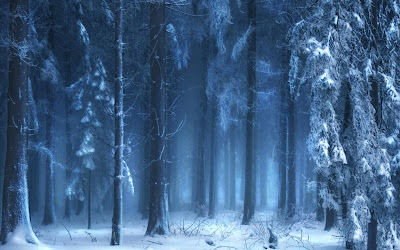
( If you are enjoying this spooky tale, perhaps you might be interested in two collections of Christmas-themed ghost and horror stories of mine, published over the last few years: THE CHRISTMAS YOU DESERVE and IN A DEEP, DARK DECEMBER. Or, if you prefer something a little more substantial, you could always opt for SPARROWHAWK, a Christmas-themed novella of mine, set during a very cold winter in the dark depths of Victorian England).
December 4, 2023
Be afraid: the Ghosting Season has arrived
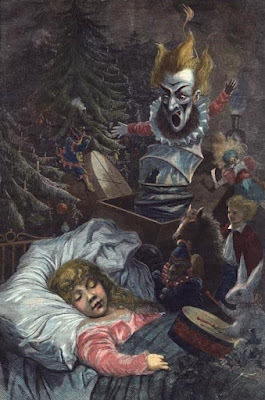 I’ve always been delighted to write ghost and horror stories set during the festive season. In fact, if anything, there’s no greater pleasure. Though, ironically, it’s often the case that to see these tales actually hit the presses in time for the happy occasion, one needs to write them much earlier in the year. It hasn’t been unusual for me to be penning Christmas scare-fare as early as April or May. As you can imagine, that’s not always the best time to be evoking thoughts of snow, ice, or candy canes dangling from glistening evergreen boughs. But we’ve finally reached that time of year again, so if nothing else, I can present you with a few choice snippets from some of the many Yuletide parables I’ve had published over the years, and perhaps include links to where you can get hold of them.
I’ve always been delighted to write ghost and horror stories set during the festive season. In fact, if anything, there’s no greater pleasure. Though, ironically, it’s often the case that to see these tales actually hit the presses in time for the happy occasion, one needs to write them much earlier in the year. It hasn’t been unusual for me to be penning Christmas scare-fare as early as April or May. As you can imagine, that’s not always the best time to be evoking thoughts of snow, ice, or candy canes dangling from glistening evergreen boughs. But we’ve finally reached that time of year again, so if nothing else, I can present you with a few choice snippets from some of the many Yuletide parables I’ve had published over the years, and perhaps include links to where you can get hold of them.
In addition, I’ll be offering a detailed review of that tireless US scary fiction editor Ellen Datlow’s most recent anthology, CHRISTMAS AND OTHER HORRORS, which you can find in the Thrillers, Chillers section at the lower end of today’s blogpost.
First of all, I quick reminder that my second historical novel for Canelo, BATTLE LORD , the immediate sequel to the first one, USURPER , which will be published on January 8 next year.
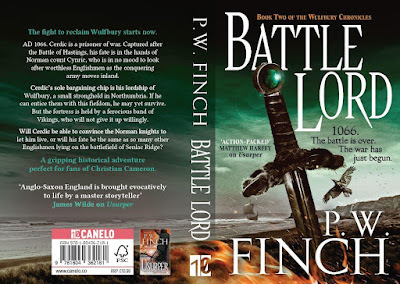
As I write this blog, it’s a deep freeze outside. We already have a very snowy December, and that suits the mood of BATTLE LORD well, as it takes us through the English winter of 1066/67, which was also bitterly cold – the slaughter on Christmas Day famously saw the Westminster snow turn ‘searing crimson’. It centres around disinherited Saxon lord, Cerdic of Wulfbury’s fightback against his Norman vanquishers.
And now that part of today’s post that you’ve all doubtless been waiting for. The approach of Christmas and the onset of …
The Ghosting Season
First up, this year, as in other years, I’ll again be publishing a short horror story with a Christmas theme on this blog, though we’ll need to get a little bit closer to the main event before that occurs (it’s still only Advent, after all). Before then, here are a few juicy extracts from some of the many Yuletide horrors I’ve had published over the years.
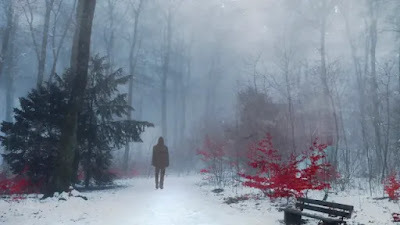
Where possible, I’ve sought to include links to those stories, so that they can still be enjoyed in full. In addition, I’ll be interspersing them all with a few random but generic ‘festive chiller’ images, none of which – and here’s your WARNING IN ADVANCE – has any actual connection to any of the works of fiction here referenced.
I dumped my bag by the bed and checked out my new surroundings. Beyond the curtain, the window looked down on the forecourt, which thanks to the risen moon, lay shimmering and frigid under its mantle of white. I discovered that the room was warm thanks to a single radiator pipe passing along the skirting board. The jug, as I’d expected, contained water, which smelled and looked fresh. It was almost as if the Parnells had been expecting me. Or someone. But then I remembered that they claimed to regularly have callers on Christmas Eve.
“Some Christmas Eve.” I sat on the bed and rooted in my bag.
There wasn’t much in there. Some spare toiletries and the essentials I’d needed for the meeting I hadn’t managed to make. Frustrated, I stood up. I couldn’t understand what was keeping Parnell with my phone. I opened the bedroom door.
She was standing outside.
Agnes.
Facing me from a couple of inches away.
As if she’d been there all the time, staring at the door.
She fixed me with a steady, waxen smile. And made no effort to move out of my way.
“I, erm … I’m sorry,” I stuttered. “I was just wondering about my phone?”
“There’s no power yet,” came the voice of James Parnell, standing somewhere out in the corridor. The lights had been turned off, so I couldn’t see him. “It’s still dead, I’m afraid.”
“It’s okay …” I was semi-hypnotised by Agnes Parnell’s pale, rigid smile. “Perhaps I can get it later?”
“Of course,” Parnell said. “Or if not later, tomorrow.”
“Tomorrow … yes.” And I closed the door again.
The hell with tomorrow! I’d give them an hour, let them get to bed, and then I’d retrieve the phone myself. This whole thing was beyond weird. If there’d been a lock, I’d have turned it …
The Merry Makers, 2019
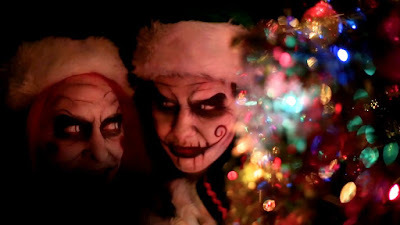
The flat-roofed houses were brown or beige, as if moulded from mudbrick, the glow of mellow lamplight visible from each interior, donkeys and camels yoked outside. In the very centre, on a raised mound, there was a stable, its front removed, revealing a baby in a manger and toy soldier sized figures of Mary and Joseph kneeling one to either side. Above them, a single star was suspended. Somewhere on the floor one of the wires to the fallen Christmas trees sparked, and the star began to shine with a pale, silvery luminescence. At the same time figures started moving in the town. Tookey watched in fascination as three or four men – again no more than toy soldier size – but distinctly sinister in hoods and cloaks, and with curved daggers, roved up and down the narrow streets, moving along electric runners which he hadn’t noticed previously. One by one they visited each house, the internal light to which would then turn blood-red – to the accompaniment of tinny shrieks. “What the …?” Tookey breathed. He had some vague memory of a school lesson during which he’d been told about that bad-tempered bastard – wasn’t his name ‘Herod’? – having all the babies killed to try and get to Jesus. But Christ, you didn’t put something like that in a Christmas decoration!
The Christmas Toys, 2012

Gemma was seven years a cop, and near-enough thought she’d seen everything. But a murder victim wrapped up like a Christmas present was something new. She used the light from her phone to examine the figure more closely. The paper covering it was bright red and speckled with holly leaves, but it was immediately evident that an adult person lay underneath. The outlines of arms, legs, feet, shoulders – even breasts, when she looked closely – were recognisable. There was no obvious sign that blood or any other bodily fluid had seeped out, but she couldn’t be certain of that …Brightly Shone the Moon That Night, 2017

“I warn you, exposing frauds is my trade. My reason to live.” Still nothing.
Without further warning, Hetherington stepped around the corner. “It’s my …”
The figure waiting there startled him for all kinds of horrible reasons, not least its lugubrious frown and lifeless, painted eyes. But mainly because the last time he’d seen it, it had been downstairs. It was the life-size Marley’s Ghost effigy. Not sitting now, but standing upright against the rear wall, its head no longer drooping.
“It’s my …” Hetherington stammered again.
Was this the same marionette? He noted the unstitched tear in the left shoulder of its frockcoat. Had someone carried it up here? Along with his camera? Why in God’s name exert all this effort just to perpetrate a hoax? Or was it a costume?
Can that be it? Was this someone dressed up?
Dazedly, he reached out to touch the thing.
“It’s my, my ...”
His fingers made tentative contact with the figure’s bare, wooden cranium. It was hard, hollow.
“My business …”
Abruptly, its jaw clacked downward, the vivid red gash of its mouth extending all the way to its breastbone.
“BUSINESS!” a distant voice shrieked in the back of his memory.
The next thing Hetherington knew, he was stumbling away across the workshop. Aside from the jaw, he’d never seen the thing move. Not once, not at all. He told himself this over and over. And yet now, even though he could hear sounds behind him – that paint-pot clattering and rolling again, as if something had kicked it while coming in his wake – he refused to look back.
The Unreal, 2015
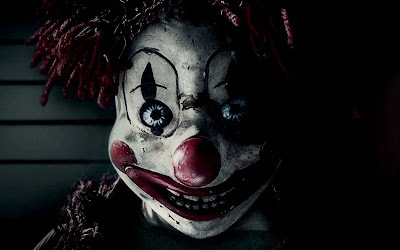
“Can I help?” came a voice from behind. Capstick spun around. A tall, lean figure in a gray suit and clerical collar, with a pale face and short sandy hair, had entered the hall behind him.
“Oh, I’m sorry …” Capstick stammered, not sure whether to address the man as ‘Father’ or ‘Reverend’. “But, well, this may sound a bit ridiculous …”
“Gentleman of the road, are you?”
“What?” Capstick was startled. Surely, he didn’t look that bad? He brushed self-consciously at his beard. “Erm … no, though I will admit to being lost.”
“So many do at this festive time of year.”
As the vicar wove his way forward through the seats, Capstick saw that he was actually quite old, his face wrinkled and with a yellowish tinge, his eyes rheumy. His hair, which was colourless, was extraordinarily thin; it looked sandy from a distance because he’d greased the few lank strands of it that remained backward over his liver-spotted scalp. His suit, once smart, was dusty and crumpled.
“I’m stuck in town by accident,” Capstick added, slightly distracted by this. “Trying to find some … well, first of all, some accommodation. And secondly, some transport out of here.”
“The first of those we can help you with ... of course we can.” The vicar smiled, his bloodless lips drawn back on brownish pegs, and laced his fingers together. “The second, alas, no …”
Midnight Service, 2012
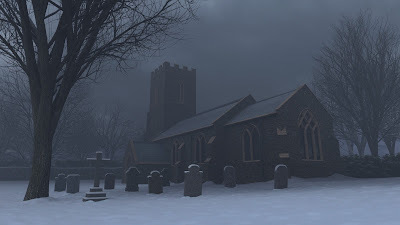
“You wanted me to die, and I wanted you to be happy. So, this is the price I paid.”
“What are you talking about?”
Her smile faded. The green eyes lost their lustre and receded into their sockets; her teeth became prominent, skeletal. “You know why my parents never revealed my resting place to you, John? Because suicides can only be buried in unmarked graves.”
“Suicides?” The word struck him like a hammer blow. “But Leticia, you’re no …”
His words petered out. Could she have? Was it possible? It was almost too horrible to contemplate, but suddenly the likelihood seemed immense. Had he – good Lord, no! – had he driven the poor child to such a brink of despair? His eyes filled with tears, which immediately crystalised in his lashes.
“Oh, don’t fret, my love,” she said. “It wasn’t so bad. What are a few extra drams of medicine to an ailing, sickly girl?”
“Leticia, you did not take your own life! Please tell me you didn’t!”
“Why not? This place is a measure of the worthlessness of that life.”
They were now moving around the downstairs of the house. Only Leticia’s unearthly radiance lit the way. He saw endless familiar features. The maroon wallpaper with the white polka dots, which Leticia hadn’t liked but which he had insisted on buying, and which now clad the entire ground floor, where it had sagged into a million damp, frozen crinkles. In a corner of the drawing room, Leticia’s piano stood laden with snow, as though it had only just been brought in from outside. Over the hearth hung the oil painting of themselves they’d commissioned after their wedding; it depicted a young couple whose demeanour was chillier than it should have been. Appropriately, it now dangled with icicles.
Leticia glided through all this decayed memorabilia painlessly, though her naked feet were black with frostbite ...Sparrowhawk, 2010
 I stared fixedly at the kitchen door. For a time, there was nothing else in the world but that door – and what I suspected lurked just beyond it. I was unable to move; I didn’t dare move, terrified that if my feet scuffed on the floor they would alert the thing to my presence, even though such thoughts were patently ludicrous – it had followed me all the way home. Even if it hadn’t, it knew where I lived; according to our myths, it knew where every child lived.
I stared fixedly at the kitchen door. For a time, there was nothing else in the world but that door – and what I suspected lurked just beyond it. I was unable to move; I didn’t dare move, terrified that if my feet scuffed on the floor they would alert the thing to my presence, even though such thoughts were patently ludicrous – it had followed me all the way home. Even if it hadn’t, it knew where I lived; according to our myths, it knew where every child lived. There was a soft crunch of snow, this directly on the other side of the door, and then a further pause. Was it listening in through the planks as I was listening out? My nerves were taut as cello strings, my hair standing on end. But I quickly broke from this stupor when the doorhandle turned.
I lurched forward and rammed home the upper bolt. Immediately, the handle ceased moving. There was another prolonged silence. I stood rigid, eyes goggling. Then the handle turned again, this time with violence, and there was a long, dull groan as a significant weight was pressed against the door from the other side. I was far from confident the single bolt would hold, especially when the weight was withdrawn and, instead, a heavy blow landed. Followed by another blow and another; loud, echoing reports, increasingly angry, which must have been heard all along our street. The kitchen door was solid oak, but it shook and shook, and I imagined that its screws would flirt from their moorings under such an assault.
It was a sure sign of how enthralled by fear I was that only now did it strike me to drive home the lower bolt as well. At first this was difficult: the assailant was hammering on the woodwork, not just with hands but with feet like iron clubs, and the lower section of the door vibrated so hard that it rarely lined up with the jamb – so hard that I thought it would shatter inward – but at last I managed to slide the bolt into its mount, and then ram my key into the lock and turn that too. All violence without instantly ceased.
The silence that followed this was perhaps the worst part of it, for all I could do was hover there in a state of near-paralysis, unsure whether my unwanted visitor had slunk off into the night, or was still present, contemplating another means of ingress …
Krampus, 2015
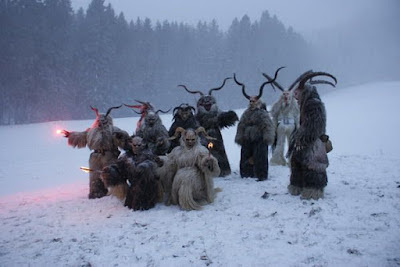
“It’s a grand-looking place,” Arthur said. “Can’t think what it’s doing all the way out here in the wilds of Derbyshire.” He reached for the knocker, but the door creaked open as soon as he touched it.
They glanced through and saw an arched stone passage with low wooden beams across its ceiling. It ended at a flight of four broad steps, which led up into a living area. A rosy flush of firelight was visible up there, and a pleasant scent struck their nostrils, a combination of oranges and cinnamon, and something else – evergreens. The reason for that soon became obvious. The beams in the entrance hall had been decked for Christmas: alternating strands of ivy and holly had been woven around them. The only sound was a distant crackle of flames.
To Arthur it was extremely welcoming, but Gabby had different ideas.
Oddly, she began to tug on his arm, trying to draw him away. “We should go, Daddy. We should go right now.”
He glanced down at her, puzzled by her worried frown. “What’re you talking about?”
“I bet it’s the furry house,” she said.
“What?”
“It was in that book you got me. It said that out on the moors, when people are lost, the furry house comes and the people go inside and think they’re safe. And the furry house disappears, and they go with it. And they’re never seen again.”
Arthur chuckled and tapped on the doorjamb with his knuckles. “Darling, this isn’t a fairy house. Look, it’s as solid as you and me.”
“That doesn’t mean anything. They have to look real to trap people.”
The Faerie, 2008
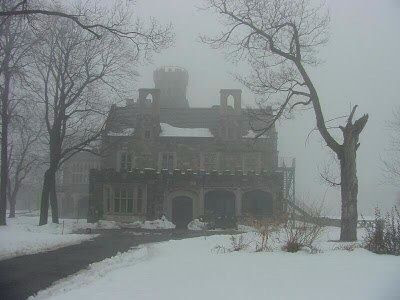
I was walking back towards the colliery forecourt through the screens when I suddenly sensed what I thought might be another presence. All my fears and suspicions about this place came back to the fore, and it struck me hard that I was up here alone late at night. Not glancing left or right, I hurried across the hangar-like space, focusing on the dim rectangle of light that was the double doors at its far end. The mere thought of that terrible voice we’d heard the last time we were up here tempted me to run. At first, I resisted – when you run, it brings your enemy out into the open, and I wasn’t sure I could handle another headlong chase. But the icy darkness around me was filled with menace, and what did I have to look forward to when I got outside again? That barren track winding between clutches of skeletal, snow-covered ruins, the opaque mist in the Valley bottom, another scramble through the tangled woods. And of course, these weren’t just irrational fears. Pete’s eviscerated corpse was a vivid memory.
Good Lord, were those footsteps I could hear? Was someone coming up behind me?
“I’m right behind you,” a voice said.
Or did it? Was it my fraught imagination?
I went fleetingly hysterical, spinning around to gaze into the frozen blackness. I saw nothing, but still turned back and ran hell-for-leather the remaining ten yards to the doorway – only for a silhouetted figure to step into it and block my path.
I screeched like a trapped animal. Trying to halt, I stumbled, fell, and slid forward on my knees. The figure stared silently down at me. It wasn’t tall, but it was bulky and misshapen with an immense, dome-like head …
Season of Mist, 2010

Eric had long been a student of the supernatural, but he wasn’t keen on the Holker Hall mystery. After all, this wasn’t some spectral pussy cat with a cute purr, or a thirsty pub ghost who drew himself generous measures after hours and in so doing helped drum up custom. There was little to snigger at in this tale, and those members of the Bradleigh public who knew about it responded accordingly. The myth wasn’t known widely enough for the hall to be shunned; the Groves still played host to adventurous children and picnicking families, especially in summer, while the ornate old building was a source of architectural interest, but that was about it. Few went near the place at night, and none on Christmas Eve. These spooks didn’t just scare you; they signed your death warrant. It was only a story of course, but why take the chance? He still wasn’t sure if he believed it, though now, as eight o’clock came and went, then nine and finally ten, he was increasingly distracted from the drunken frolics in the banquet lounge to the opaque winter darkness. He could well imagine the miles and miles of frozen, unlit woodland lying between himself and civilisation. Once or twice, he thought vague forms were cavorting out there, though that was unlikely. It was way too early yet; the mummers were only supposed to emerge from the Groves at midnight. Of course, no-one could say for sure, because allegedly no-one had lived to tell …
The Mummers, 2000

“Something … something was in the road,” she stuttered. “It was like a snowman, only the most evil snowman I’ve ever seen.” “Come on, Roni,” Graham said, “how can a snowman be evil?”
“It was grinning. Horribly. It had icicles for teeth, and its eyes were like human eyes – all crossed and bloody, like they’d been gouged out of someone’s head.”
Rick and Graham listened to her, astonished, but by her flowing tears and bubbling nose, she was one hundred percent serious, at least in her own mind. Rick gazed along the driveway ahead of the skew-whiff Datsun. It was covered in rutted snow, but nothing else was visible. “There’s no snowman now,” he said, “unless you flattened it.”
“I swerved to avoid it,” Roni retorted. “That’s why we got stuck in the snowdrift. Oh God, that thing was so hideous!”
As Graham assisted her back towards the house, Rick scanned the surrounding trees. Moonlight shafted through them, cutting the frozen mist into spectral, knife-like forms. The snowy woodland floor bathed everything in eerie but beautiful phosphorescence. Picture perfect. But he pondered what Roni had said about the thing that had supposedly waylaid them – a snowman, for God’s sake. But even if it had only been an optical illusion, or the fantasy of an overwrought brain, it had given her a genuine scare. He wondered how he himself would react if he spotted some white, lumpen monstrosity shuffling through the frosted undergrowth, perhaps circling around to block his route back to the house.
And he beat a hasty retreat.
The Stain, 2007
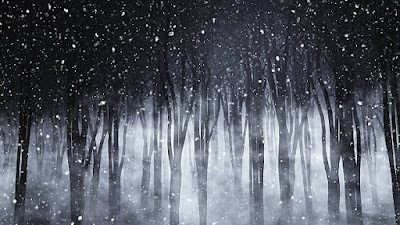
Another thought now struck him – an outrageous one.
He turned again, rounding on the statue still standing in the aperture. Was it his imagination, or did it look slightly taller than previously? He approached until he was standing only a foot away. The last time here, he’d torn the ivy off to expose its face. That face now was hidden in shadow, its feature indiscernible. Alec leaned forward slowly until they were almost nose to nose.
It opened its eyes.
They were fiery red, their pupils tiny black beads.
“Shit,” he breathed.
It struck him, lashing out from the ivy it had hidden beneath. The blow caught him in the chest and sent him staggering backward – but not before he was able to point his Glock and get off three quick shots, all of which he was sure were dead on target, yet none of which appeared to have any impact.
The thing sprang out completely from under its cowl of winter foliage.
Alec saw a tall, misshapen form clad in the rags of old robes, its limbs wrapped individually with aged, mummy-like bandaging. He managed to regain his balance just inches before toppling backward into the well, and then they were facing each other again.
Long, ratty hair hung past the thing’s ember eyes. A new smell filled the air: dampness, mildew.
The Killing Ground, 2008
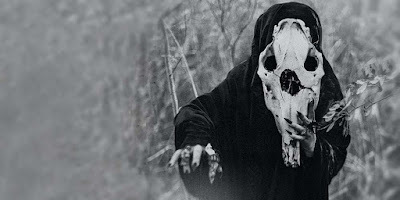
On the far side of the table, Miss Scrivener’s shrunken form still slumped in front of the fire. Phil threw himself through the middle of the feast, knocking aside trays and trenchers, dishes piled with fruit, goblets and tankards. When he reached the diviner, he squatted beside her, placing fingertips on her sweat-damp neck. She moaned and shifted. More sweat beaded her forehead; her hair was a mass of rat-tails. Her eyelids fluttered but remained closed.
“Miss Scrivener,” he coaxed her. “Come on … we’ve got to go, right now.”
“Can’t …” she whimpered. “Can’t move …”
“For God’s sake!” His voice tautened as he heard feet clumping back down the covered stairway. “Get your bloody arse moving!”
This jerked her, if not quite awake, certainly out of her reverie. Wrapping an arm around her waist, he hoisted her to her feet and began pushing/dragging her from the fire. He couldn’t take her over the top of the table, so they had to go around the end of it, but at least it would be the western end, the one opposite the foot of the staircase. No sooner had they reached it, however, than figures emerged into view at the foot of that stair, and as Phil had now rounded the table and was heading back towards the door, they came fully into his eyeline.
He tottered to a halt.
There were shadows in the hall; firelight flickered. Perhaps all this was playing tricks on him. At the very least it blurred the detail of three mouldering, yellow-green forms, initially indistinguishable under the ragged, rancid drapery of what had once been burial clothing, though in two cases at least, age-tarnished plating clunked and clattered, the rusted chain below it hanging hollow and mud-brown on limbs shrivelled to sticks …
Spirit of the Season, 2020
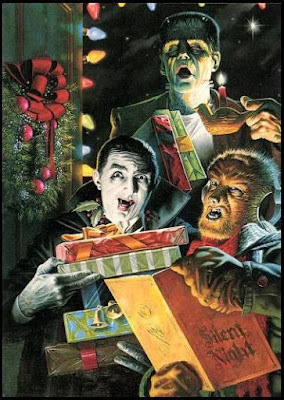
THRILLERS, CHILLERS, SHOCKERS AND KILLERS …
An ongoing series of reviews of dark fiction (crime, thriller, horror and sci-fi) – both old and new – that I have recently read and enjoyed. I’ll endeavour to keep the SPOILERS to a minimum; there will certainly be no given-away denouements or exposed twists-in-the-tail, but by the definition of the word ‘review’, I’m going to be talking about these books in more than just thumbnail detail, extolling the aspects that I particularly enjoyed … so I guess if you’d rather not know anything at all about these pieces of work in advance of reading them yourself, then these particular posts will not be your thing.
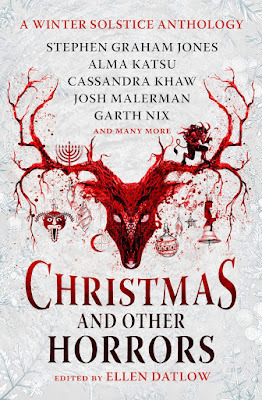 CHRISTMAS AND OTHER HORRORS
edited by Ellen Datlow (2023)
CHRISTMAS AND OTHER HORRORS
edited by Ellen Datlow (2023)
Ellen Datlow is one of the most respected anthologists and editors currently working in the field of dark and fantastic fiction today. She won her first major award in 1989 and has clocked up so many more since then that it’s difficult keeping track. She is also famous for discovering numerous horror-writing talents and for flying the flag for short scary fiction at a time when far too many mass market publishers have tried to ignore it.
For this reason, among many others, any new Ellen Datlow anthology is an event, and this latest, Christmas and Other Horrors , a timely event indeed.
Before we dive into the contents, let’s first check out the publishers’ official blurb:
Hugo Award-winning editor, and horror legend Ellen Datlow presents a terrifying and chilling horror anthology of original short stories exploring the endless terrors of winter solstice traditions across the globe, featuring chillers by Tananarive Due, Stephen Graham Jones, Alma Katsu, and many more.
The winter solstice is celebrated as a time of joy around the world – yet the long nights also conjure a darker tradition of ghouls, hauntings, and visitations. This anthology of all-new stories invites you to huddle around the fire and revel in the unholy, the dangerous, the horrific aspects of a time when families and friends come together – for better and for worse.
From the eerie Austrian Schnabelperchten to the skeletal Welsh Mari Lwyd, by way of ravenous golems, uncanny neighbours, and unwelcome visitors, Christmas and Other Horrors captures the heart and horror of the festive season.
Because the weather outside is frightful, but the fire inside is hungry ...
Everyone, it seems, loves a good scary story at Christmas. So much so that it baffles me the high street booksellers aren’t crammed with them from October onwards. The explanation for why they mysteriously aren’t is another story entirely, but it should make us all the more grateful that globally renowned editor, Ellen Datlow, is here to save the day.
Datlow is already famous for her high-quality horror anthologies; there are almost too many of them out there to count, and she has covered a wide range of central themes, but this year, the festive chiller buffs among us will be delighted to learn that she has opted to put the Christmas season under her microscope.
Of course, Ellen Datlow being Ellen Datlow, you mustn’t come into Christmas and Other Horrors under the impression you’ll be reading about lunatic Santas stalking wayward housewives through their snowbound homes on Christmas Eve, or heralds arriving from their own distant past to warn their misbehaving descendants about the horrors awaiting them in future Christmases if they don’t mend their ways.
There are certainly elements of these to be found in this latest bumper crop of Yuletide terrors, and more than a few contributions that you’d classify as traditional in tone, but Datlow’s books are well-known for having real meat to them, and this one is no exception. These are stories from the literary horror stable, high brow efforts with plenty going on beneath the surface, in addition to which, the editor throws her net far more widely than might usually be the case with Christmas collections in terms of subject matter.
Yes, we do have mythical entities arriving on dark and snowy nights. Yes, we do get references to candy canes, plum puddings, stockings hanging over the fireplace, and other familiarities of the Anglo/American/Germanic festival, but in this book at least we are not solely talking about Christmas. The strapline for Christmas and Other Horrors is ‘A Winter Solstice Anthology’, and that is the key.
The Winter Solstice (which falls on December 21/22), has meaning in other calendars as well as the Christian one. In the Jewish faith, Hanukkah, or the Festival of Lights, falls between late November and late December, while in many worldwide belief systems now forgotten, the shortest day of the year also had portentous significance. The one unifying factor here of course is that all these holidays were and are grand events, believers gathering to worship, celebrate and enjoy each other’s company, and Datlow clearly sets out to be inclusive on all these fronts.
But even beyond this crossing of boundaries and entwining of cultures, the editor has clearly pressed her authors hard to hatch something deeper than usual when it comes to the meaning of the season.
Don’t be worried, though. While I’d say there’s only one story in this anthology that I consider to be truly terrifying, the vast majority will still, as the popular phrase goes, ‘creep you out’.
I won’t go through the entire Table of Contents (there are eighteen stories in total), because inevitably there are one or two tales in here that didn’t really land for me. But the lion’s share will happily darken any reading-night spent by the winter fireside. I won’t go into too much detail for fear of giving away spoilers.
First of all, I’m always slightly biased towards the traditional. I won’t deny it, and I’m glad to say that, for all the lovely writing and thoughtful subtext that remains on show throughout, Ellen Datlow has still included a whole bunch of rattling good Christmas yarns that you can easily see making it into some future Best Christmas Spook Stories edition.
To start with, in Christopher Golden’s eerie chiller, The Importance of a Tidy Home , two homeless guys are fascinated by a mysterious group of shadowy beings who prowl the snowy Twelfth Night streets wearing plague masks, apparently taking it personally if they visit any house in an untidy state. In a similar tone of home invasion horror, Richard Kadrey’s The Ghost of Christmases Past presents us with a modern suburban woman, who lives in stark fear of the mythical Christmas Eve child-eaters that inhabit so many legends, and who every year, nails her house up, even though it is slowly but surely driving her husband crazy.
In two stories you could certainly classify as ‘warnings from beyond,’ the fear factor goes up several notches. In All the Pretty People , Nadia Bulkin hits us with an annual party, which turns progressively nastier when a guest arrives from the afterlife. This is a particularly strong entry, which benefits from some very neat, tight character-work, though for my money, the best story in the entire anthology – and yes, it’s probably the most traditional of them all – is M. Rickert’s Lord of Misrule , which sees a disturbed teacher haunted each Christmas by the spectre of an uncontrollable child. Not a word is wasted in this ultra-dark bone-chiller, though the concept is broad enough to spin a Christmas horror movie out of it.
Meanwhile, the two entries that are probably most ‘Tales from the Crypt’ in tone are The Ones He Takes , in which Benjamin Percy tells the tale of an abducted child, who returns home one wintry Christmas Eve and stutters out a terrifying story about a Father Christmas that no youngster alive today would recognise, and Nick Mamatas’s The Blessing of the Water s, in which a convict breaks out of jail, desperate to continue the Epiphany sacrifices that he is certain will keep the local goblins at bay.
Of course, the supernatural isn’t the only thing to fear when the end of the year comes around. Even beyond the world of dark fiction, there is a flipside to Christmas. While others are having fun, some very decidedly aren’t. Jollity all round can only enhance the suffering of those less fortunate than ourselves. On top of that, there are strange aspects to Christmastide, which don’t always boast wholesome origins, or necessarily reflect well on those who indulge. Good will to all men is not always at the heart of it.
Ellen Datlow doesn’t skimp here either, adding several of what I’d call psychological horror stories to the line-up.
In Our Recent Unpleasantness by Stephen Graham Jones, a paranoid suburbanite becomes convinced there is a real, malevolent presence in his middle-class neighbourhood, but is it all in his head? Likewise, and this is a very strong entry in the book, in Kaaron Warren’s Gràve of Small Birds , a mean-spirited celebrity chef visits a remote Irish island for a winter solstice festival, but her inner viciousness will be her undoing. And then we have legendary author, Tananarive Due, who in Return to Bear Creek Lodge , once again takes us deep into the heart of a dysfunctional family. In this one, an innocent youngster dreads his annual Christmas trip to the woods to see his grandma in her creaky old house. She’s an aged tyrant (a genuinely horrible one), but the curious creature she keeps company with is even worse.
The last story I want to mention here probably defies categorisation, but it’s so pertinent to the world today, and such an original idea, and so all-round scary, that it could easily get snapped up for a big-budget movie adaptation. I’m talking about Gemma Files’s No Light, No Light , in which eco-terrorists plan to use thermite charges to blow open a semi-dormant volcano and thus reverse the pattern of global warming, but in so doing they release an ancient power.
What you’ve essentially got with Christmas and Other Horrors is a bunch of expertly crafted, adult-in-tone fairy tales set in or around the ‘happiest time of the year’. Please don’t misunderstand; it’s not sad or depressing or in any way negative about or disrespectful of the holiday season. It’s redolent with festive atmosphere, but it’s got lots to say that may not always be comforting (as did Dickens, of course), and it offers a varied range of macabre interest, often of a sort you won’t have encountered in Christmas fiction before, and yet all of which fits perfectly into the seasonal mold.
Probably best to get it soon, though. Time is rolling on and the goose is getting fat.
(The wonderful painting of the giant skeletal thingy in the wintry woods is by that master of the grotesque, Boris Groh. The other images were found online with no notice of ownership attached; in any of these cases, if the original artist would like to make him or herself known to me, I will happily add that information to the blog, or if required, take the picture down).
November 6, 2023
Check out the final artwork for Battle Lord

Today, I’m delighted to be able to reveal the final cover for BATTLE LORD, which is Volume 2 in THE WULFBURY CHRONICLES, and now slated for publication in January next year. I’ll be talking a little more about that further down. In addition to that, I’ve got an announcement to make regarding my Thrillers, Chillers series, which I feel is finally approaching the end of its natural life. More about that later on, as well.
In the meantime, though, on the subject of thrillers, chillers and other writings of that ilk, I’ll be posting another detailed review, and this week it’s the turn of KIN by Kealan Patrick Burke.
As usual, if you’re only here for the book review, you’ll find it at the lower end of today’s blogpost. Feel free to jump straight down there and check it out. Before then, though, let’s roll back the centuries to …
Darker Ages
I’m guessing that most people reading this column will be familiar with my recent diversion from the world of crime and thrillers into the land of historical adventure fiction, as initially seen in my book of last April, USURPER , which told a blood and thunder tale set during the Norman invasion of England.
It wasn’t a total diversion, by the way; there’ll be more crime-thriller news from the Côté de Chez Finch in the next few weeks.
 USURPER
seems to have done pretty well. It got some good reviews and garnered some very pleasing
USURPER
seems to have done pretty well. It got some good reviews and garnered some very pleasingthumbs-ups from a range of respected authors …
An action-packed, coming-of-age, adventure set against the upheaval and battles of 1066 … Matthew Harffy
Fearsome battles, believable characters, uncommon valour. A relentless page turner … David Gilman
An authentically blood-soaked historical epic to rank with the best … Anthony Riches
With all the brutal power of a battle-axe to the head, Finch brings 1066 to life in new and vivid ways … Steven A McKay
Well, as mentioned, next January, the second volume in the Wulfbury saga, BATTLE LORD , will hit the bookshelves, though it’s available for pre-order right now of course. Here’s a quick thumbnail outline:
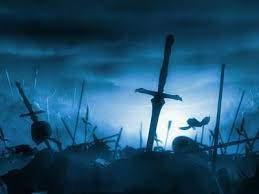 It’s October 1066. The battle of Hastings is over, and King Harold and the flower of his English army lie slaughtered. But the Normans have suffered too, and from this point on, can only advance with caution. Though this doesn’t stop them harrying the English people: burning, raping and pillaging.
It’s October 1066. The battle of Hastings is over, and King Harold and the flower of his English army lie slaughtered. But the Normans have suffered too, and from this point on, can only advance with caution. Though this doesn’t stop them harrying the English people: burning, raping and pillaging. The prisoners they have taken are equally mistreated. One of these is Cerdic Aelfricsson, second son and sole surviving heir to the earldom of Ripon, whose extensive holding in the north of England is centred around the hill fortress of Wulfbury.
Wulfbury is the only reason Cerdic is alive. He has teased his captors with information that this earldom and all its treasures can now be theirs, though he makes no bones about the fact that they must first steal it back from Wulfgar Ragnarsson, a Viking warlord whose private army splintered away from Harald the Hardraada’s invasion force and captured it for themselves.
The household of the Norman count, Cynric of Tancarville, is the particular group in whose chains Cerdic resides. Not trusting their duke to give them their due reward, they are strongly tempted to march north, but they know that will be through enemy territory, while the Viking opponent awaiting them grows stronger every day.
Before then of course, they still have duties to discharge for their duke, namely the capture of the Saxon fort at Dover, and England’s religious capital, Canterbury, then the hardest nut of all to crack, London. Only then of course, can the duke genuinely claim the crown of England.
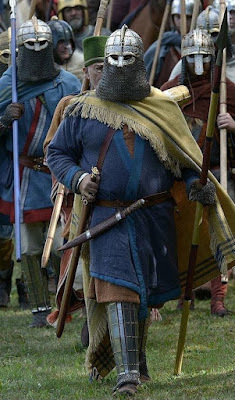 All through this ordeal of chaos and war, Cerdic can only use his wits to survive. At the same time, though, he becomes increasingly close to a fellow hostage, Yvette d’Heimois, the English-speaking daughter of a Norman count currently living in exile, and two Norman knights, Turold and Roland, the former whose mother was English, the second whose adherence to the code of chivalry leads him to show compassion to the prisoners.
All through this ordeal of chaos and war, Cerdic can only use his wits to survive. At the same time, though, he becomes increasingly close to a fellow hostage, Yvette d’Heimois, the English-speaking daughter of a Norman count currently living in exile, and two Norman knights, Turold and Roland, the former whose mother was English, the second whose adherence to the code of chivalry leads him to show compassion to the prisoners. That said, the benign presence of Yvette, Turold and Roland is counterbalanced for Cerdic by several ferocious adversaries: Joubert, Count Cynric’s cruel and uncontrollable son, Yvo ‘the Slayer’ de Taillebois, his personal attack-dog, and Duke William himself, an implacable tyrant, who hasn’t yet earned his epithet ‘Conqueror’, but is currently known for all sorts of reasons as ‘the Bastard’.
If you like the sound of BATTLE LORD , as I’ve already said, you can pre-order it right now. Or, if you need further persuasion, check out a few reviews and see what you think on it on its day of publication, January 8, next year.
Thrillers, Chillers no more
It’s my sad duty to report that my Thrillers, Chillers, Shockers and Killers column, which I’ve been running on this blog since 2015, and in which I think I’ve now reviewed several hundred books, will shortly be finishing.
I should say straight away that airing my thoughts publicly and extensively on those works by other authors that I have particularly enjoyed has been one of the great joys of my life in recent years. But, for various reasons now, I need to bring this to a close.
 Most people who are familiar with this blog will probably recognise that I offer very detailed reviews of these novels, anthologies and story collections. Some might say I actually go into too much detail, and that writing hundreds and hundreds of words each time is an OTT response and maybe too much for the average internet browser to bother reading.
Most people who are familiar with this blog will probably recognise that I offer very detailed reviews of these novels, anthologies and story collections. Some might say I actually go into too much detail, and that writing hundreds and hundreds of words each time is an OTT response and maybe too much for the average internet browser to bother reading. In truth, I suspect this latter may be the case.
Many’s the time sadly when I’ve had only a very limited response to these reviews, which is a huge amount of time wasted. Don’t get me wrong … I’ve not been doing this so that people will discuss my book reviewing skills (such as they are) online, though it’s nice if an author responds, and that happens quite a lot, but ultimately it’s an exercise in trying to spread the word about a great piece of fiction that has made an impact on me personally, and it’s too often the case that I’ve seen no evidence I’m achieving that … so, what’s the point?
Of course, what it really boils down is that, even if each of these reviews generated a waterfall of chatter, they’ve simply become too time-consuming an exercise. I have my own writing to do – two more novels are in the offing, with more to add, while I also have several short story commissions – so it’s just not possible to keep taking out two or three days twice a month to write continuous book reviews. (On top of that, it does take the enjoyment out of reading, having to make copious notes in a pad while you’re working your way through a damn good book).
I won’t be putting it to bed straight away. I’ve still got several reviews in the barrel, which I’ll post over the next couple of months, and I’ll always post a quotable paragraph on social media if I really like a book, but I suspect that 2024 will be the first year in quite some time when the Thrillers, Chillers, Shockers and Killers section of this twice-monthly blogpost is basically no more.
And now …
THRILLERS, CHILLERS, SHOCKERS AND KILLERS …
A series of reviews of dark fiction (crime, thriller, horror and sci-fi) – both old and new – that I have recently read and enjoyed. I’ll endeavour to keep the SPOILERS to a minimum; there will certainly be no given-away denouements or exposed twists-in-the-tail, but by the definition of the word ‘review’, I’m going to be talking about these books in more than just thumbnail detail, extolling the aspects that I particularly enjoyed (I’ll outline the plot first, and follow it with my opinions) … so I guess if you’d rather not know anything at all about these pieces of work in advance of reading them yourself, then these particular posts will not be your thing.
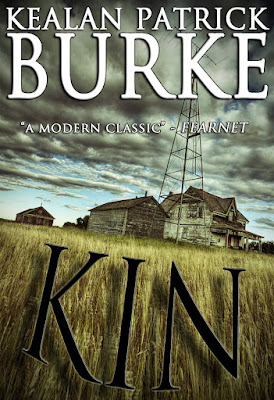 KIN by Kealan Patrick Burke (2012)
KIN by Kealan Patrick Burke (2012) Outline
When Claire Lambert is found on the side of the road near Elkwood in rural Alabama, raped, mutilated and blinded in one eye, Jack Lowell, the black farmer who discovers her, knows immediately who’s to blame. A local hillbilly clan, the Merrills, controlled by their fearsome father, Papa-in-Gray, and their odious, deranged mother, Mamma-in-Bed, have been terrorising the district for ages. While content to leave their neighbours alone (mostly), they are always ready to waylay visitors, not just robbing, torturing and killing them, but cannibalising the remains afterwards. And by that, I mean literally cannibalising them, as in cooking and eating them, and burning what’s left-over on huge, greasy bonfires.
Claire’s small group of happy-go-lucky hitchhikers has suffered exactly this fate, but Claire herself escaped and in the process managed to kill one of her captors.
None of this, by the way, has happened ‘on camera’. We learn all about it through Claire’s dazed recollections and the few things she manages to say to her reluctant rescuer and then to a retired doctor, who patches her wounds but is hesitant to publicise the incident because both he and Lowell now know that the Merrills won’t rest. One of their victims has escaped, someone who can now implicate them in multiple homicides. Not only that, she slew one of their own.
Lowell’s dim-witted but good-natured son, Pete, drives Claire away when she’s fit to travel, and only just in time, the vengeance of the Merrill family then falling ferociously on both the farmer and the good-hearted medical man, the latter taking the blame posthumously when local lawman, Sheriff McKindry, finds fragments of Claire’s friends scattered in his cellar.
The story of the mad, murdering doctor is accepted by the state police, and Claire is despatched home to her sorrowing family in Ohio, unable to persuade anyone that it was a whole group of men who attacked them. Her older sister, Kara, won’t listen, because she hopes the terrible issue is now over. Relatives of the other victims feel much the same way. With one exception.
Thomas Finch, the brother of Claire’s deceased boyfriend, and an ex-boyfriend, himself, of Kara’s, is a veteran of the Iraq War. As such, he’s now an embittered, introspective man, whom Kara doesn’t like or trust anymore, and who seems to be constantly on the verge of doing something self-destructive. Secretly, he’s tortured by the memory of shooting an innocent Iraqi woman and her child, and later covering his back by lying that they were suicide bombers, though no one else knows about this except his old combat buddy, Beau. Finch does believe Claire that the real murderers down in Alabama have got away scot free, and seeks permission of the bereaved families to go and look for them. Most don’t want anything to do with him; they are comfortable middle-class citizens, so even though ravaged by grief, they can’t conceive of a vigilante rampage. One, however, a wealthy chap, agrees to bankroll Finch’s mission of vengeance, which allows him and Beau to buy high-power weapons.
Young Pete, meanwhile, is also ready to get payback. Despite his endless good humour, with his Pa dead and his home burned, he’s been left with nothing but the family truck. He heads north to Detroit, to try and hook up with Louise, his former stepmom, but Louise, though she’s glad to see him, is currently dealing with a wannabe gangster boyfriend and all the trouble that brings, and eventually is severely wounded just trying to prevent Pete from getting involved himself.
Pete thus drives to Ohio, to check on Claire. He really is an innocent soul. It never enters his head that she might regard him as a real-life reminder of her terrible ordeal rather than the friendly kid who helped her. But Claire, who’s been strictly forbidden by Kara from accompanying Finch and Beau back to the South, now sees Pete as a new kind of salvation. Because, the moment Kara looks the other way, he can drive her down to Alabama. And whatever revenge is going to be had on the diabolical Merrill clan, she can have a piece of it too …
Review
Back in 2012, I would have wondered how much more an author could have wrung out of the ‘hillbilly horror’ genre. Much earlier, in 2001, I attended World Horror in Seattle and heard opinions from various US writers that they felt this particular neck of the literary backwoods was now thoroughly explored.
However, Kealan Patrick Burke gives it a new lease of life in his rural thriller, Kin , though not in ways you might expect.
Yes, the terror of the malformed and the inbred is all there, the extreme sexual violence is there, the distortion of religious belief, the deep, dark woodland filled with dense, thorny undergrowth. The Southern Gothic atmosphere pervades it from the start. We are in a familiar world, and a familiarly ominous one, where local law enforcement pay lip service to their badges, doing no more for visitors than offering friendly advice that they ignore such and such a wooded back-road; where said roads inevitably lead to mysterious ramshackle farms, heaps of junked, rusted machinery, loads and loads of seemingly abandoned cars; and where hairy bad guys in dungarees are likely to leap out of the trees at any second, armed with hatchets, knives and bows.
But I say it again, Kin is what I’d call a ‘rural thriller’ rather than a traditional ‘hillbilly slasher’, Burke setting up the brutal attack on the innocent band of hikers before the novel has even started, and instead of focussing on their appalling and protracted suffering, choosing to analyse the events that follow (and inevitably spin out of control).
I’ve often wondered when watching movies like The Texas Chainsaw Massacre , Wrong Turn or The Hills Have Eyes , how the few survivors of such ordeals would ever have been able to get on with their lives afterwards. We got a hint of it in Deliverance and Wolf Creek , where, in the former, the very least they could expect were repeated sweat-soaked nightmares, and where, in the latter, there was a general disbelief that such events could ever have happened, the survivors themselves coming under suspicion of murder.
But in Kin , Kealan Patrick Burke takes it a whole lot further – and here’s the really clever bit, because when this author is talking about ‘kin’, he isn’t just talking about the cannibal clan at the heart of the horror, he’s also talking about the response their atrocious act elicits from the siblings of those slain. In fact, that’s what he’s talking about mainly. So often in this kind of tale, we meet a tightknit group of uneducated killers living in rural isolation, fearing and hating the rest of the world, and subsequently prepared to die for each other even though there is much abuse and cruelty among them. Well, newsflash! – other ordinary folk, the ‘men of the world’ as they are referred to in this book, care about each other too, and in Kin , the Merrill clan of Elkwood are about to learn that the hard way.
Even so, the author doesn’t use this as a reason to simply drag us through a gutter of depraved self-justifying violence. Fighting back against deadly criminals with equal deadly force would be a big step for any civilised person to take; not just a terrifying prospect, but a moral quandary all of its own. And this is the key aspect of Kin . If your life was genuinely ruined by an act of such horrific violence as this, and the outrage was compounded by the indifference or incompetence (or both) of local police forces – so much that you felt there was no option but to take the law into your own hands – what kind of agonies would you go through as you, firstly, sought to convince yourself that this was the only solution, and, secondly, then had to persuade sufficient others to form an effective posse?
Even in America, where there are guns aplenty, it takes the war veterans Finch and Beau, two men used to conflict and whose lives, on the whole, have already ended, to light the touchpaper. Pete only gets involved because he too has nothing left in his life: his Pa is dead, his home incinerated, his erstwhile mother, Louise, a woman with serious problems of her own. Even Claire, the most damaged character in the story, only goes back to Elkwood because she is being so smothered with care and concern (and at the same time subjected to anger and annoyance for having brought this tragedy on their family) that she knows she’ll only be able to cut loose by taking direct action of her own. And even then, they all follow hard and bumpy roads reaching these conclusions.
I’ve seen some critiques of Kin that take issue with its middle section, where the killers themselves are off the page and, instead of watching them commit more heinous deeds, we ruminate painfully with their stressed and indecisive victims. Of course, what may be boring to some, to others (to me, for instance) is the thing that marks this novel out as more of a thriller than a horror, because it means that we’re dealing with things ultra realistically, a sad, grave tone that is maintained throughout the narrative.
Kin might be a story that we’ve seen before, but rarely will we have seen it done in as grown-up fashion as this. For example, the Merrills are not simply mad, bad and dangerous to know because they come from the country. There are other country folk in here, like Jack Lowell and even Mamma-in-Gray’s brother, Jeremiah Crawl, who, while both from the boondocks, are not evil.
The Merrills are the way they are because Papa-in-Gray, their patriarch, is hopelessly insane, a paranoid religious maniac who has consciously sought segregation and raised his family with such fear and suspicion of the rest of society, treating its corruptive influence as literal poison, that it will only lead to one thing when they encounter it. (I should say that though we’re in authentic serial killer country here, our main antagonist so overwhelmed by delusion that he might as well get what he can from his fellow men because he’s completely dehumanised them in his own mind, the cannibal element feels perhaps a little unnecessary. I can’t help thinking this brings a degree of lurid sensationalism into the novel that it doesn’t really need).
The other thing that impresses me about the Merrills is that they’re not indestructible. We’re a world away from Michael Myers or Jason Voorhees, who just keep coming no matter what you do to them. The Merrills are brutal bullies, but they’ve never squared up to combat vets before, and the result of that is inevitable and foreseeable. Not only that; they aren’t totally solid with each other: son Luke, for example, has developed a conscience, and Papa, though he cruelly and horribly punishes the boy, remains wary of him for the rest of the book.
On the whole, though, you almost start to feel for the Merrills in the end, mainly because their simple understanding of what they believe to be an ultra-hostile world has so failed to prepare them for reality that, at times, they are more like silly children than deadly criminals (though you don’t linger with that misconception for long). When their demise occurs, it’s deserved but inevitable, and they almost seem to feel this themselves, predicting the end of their world with a sad, fatalistic air. Papa remains in denial until the end, of course: Mama was a saint, God is still on their side, he’ll find another woman and have new sons, all will come good. It’s all so pathetically deluded. Not that he doesn’t thoroughly deserve the biblical end that awaits him in the final pages.
In terms of the other characters, Sheriff McKindry is an equally complex villain. It’s an old trope, the corrupt southern lawman who’ll go out on a limb to keep things just the way they are. In this version, he’s as much a thief and scavenger as the Merrills, but he too is finally aware that he’s got in over his head, and he genuinely regrets this, as well as the sufferings of all those others caught up in the Merrills’ web, which up until now he’s turned a blind eye to.
I was less enamoured by Finch and Beau, who, dare I say it, are a little bit stock, and like so many veterans in modern day fiction, spend a lot of time talking about how nothing seems to matter anymore, though once again they have clear, defined voices and as we’re still in the real world, neither of them, thankfully, is Rambo.
That leaves only Pete and Claire of our main cast, who, between them, are a very different pair of heroes from the norm, and each very engaging in his/her own way. Claire would normally be fetchingly pretty; she was once, but now she’s been gruesomely disfigured, and switches continually between sweetness and anger. Pete, a young black kid with learning difficulties but a cheerful outlook, lives in a tragi-comic fantasy, where just because he was in the truck that picked Claire up when she was first hurt means he’s destined to be her boyfriend. He’s no hope on this score, of course, but one of the most attractive things about him is, even when he starts to realise this, he never lets it diminish his positive outlook.
As you’ve probably realised, I enjoyed Kin immensely. It was a quick read, though very well written – almost lyrical at times. I do think there are perhaps one or two moments of introspection too many, when we lose the thread of the action because characters are thinking deep, immersive thoughts. But to other reviewers this is a good thing, even steering the book in a literary direction.
Ultimately, of course, it’s all in the eye of the beholder. I’d just say this: read Kin . It doesn’t do what it says on the tin, but for that reason I think you’ll thorough enjoy it.
As I so often, and so ill-advisedly do after reviewing books on this blog, I’m now going to attempt to cast Kin on the off chance that it gets made into a movie or TV series. So many of the books on here should get that treatment, but never seem to. But in this case, as with all others, here’s hoping. (And remember – the one good thing about this is that I have no limits on how much I can spend on my actors).
Claire – Kara Hayward
Pete – Tyrel Jackson Williams
Papa in Gray – Dennis Quaid
Luke – Josh Hutcherson
Louise – Gabrielle Union
Finch – Sean Faris
Beau – Omari Hardwick
Sheriff McKindry – Scott Glenn
September 20, 2023
During dark days in the autumn of the year

Today, I’m delighted to be able to show off the stonking cover for my next historical novel, BATTLE LORD, which is out in January, and which as those interested may have guessed, is a direct sequel to USURPER, published last April. You’ll find that a few paragraphs down, where I’ll also give a brief intro to BATTLE LORD.
In addition this week, because I’m reminded with each passing day by the slowly turning weather and leaves, that we’re now into the last quadrant of the year, I’ll be giving another plug to my autumn novella, SEASON OF MIST (hopefully in an imaginative way, which will be more than just a straightforward advert), and in addition to all that, in the Thrillers, Chillers section, which you’ll find at the lower end of today’s post, will be reviewing and discussing Max Brooks’s terrifying tale of the Pacific Northwest, DEVOLUTION.
So, lots to get through today. But before anything else, as promised, here’s the jacket art for my next historical novel, BATTLE LORD , the sequel to USURPER , which will be published on January 8. I’m sure you’ll agree that it’s pretty damn eye-catching.
 I’ll be talking a lot more about
BATTLE LORD
in the coming weeks and months, but very quickly for those who are intrigued already, it picks up only a couple of days after the point where
USURPER
ends, with 17-year-old Cerdic Aelfriccson, the sole surviving son of Earl Rothgar of Ripon, and one of the few English survivors of the battle of Hastings, now wounded, disoriented and riddled with despair. He is a prisoner of the Normans and already being mistreated to the very edge of death. However, Cerdic is determined to survive. Not only that; he is determined to win back everything he has lost.
I’ll be talking a lot more about
BATTLE LORD
in the coming weeks and months, but very quickly for those who are intrigued already, it picks up only a couple of days after the point where
USURPER
ends, with 17-year-old Cerdic Aelfriccson, the sole surviving son of Earl Rothgar of Ripon, and one of the few English survivors of the battle of Hastings, now wounded, disoriented and riddled with despair. He is a prisoner of the Normans and already being mistreated to the very edge of death. However, Cerdic is determined to survive. Not only that; he is determined to win back everything he has lost. His family’s home in Swaledale, in Northumbria, and their central fortification, Wulfbury, were captured by a splinter-group from the Viking army of Harald ‘the Hardraada’ Sigurdsson, a Norse leader of great renown. However, though the Hardraada was slain shortly afterwards at the battle of Stamford Bridge, those who captured Wulfbury still hang onto it, bent on making it the centre of their own Northern English powerbase.
Cerdic is already formulating a plan for their destruction, but first he must somehow get past this latest horde of invaders, the near-invincible army of William the Conqueror.
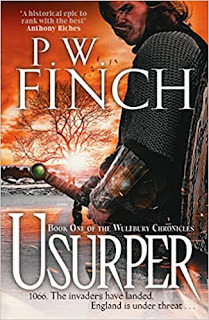 As I say,
BATTLE LORD
, though it’s available for pre-order right now, is only published next January, when it will be available in ebook, paperback and on Audible. If you like your medieval adventures red as raw meat, filled with blood and thunder, this one should be for you, though of course, if you haven’t tried
USURPER
yet, which is the first in the series, I strongly recommend that you make a beeline for that one straight away.
As I say,
BATTLE LORD
, though it’s available for pre-order right now, is only published next January, when it will be available in ebook, paperback and on Audible. If you like your medieval adventures red as raw meat, filled with blood and thunder, this one should be for you, though of course, if you haven’t tried
USURPER
yet, which is the first in the series, I strongly recommend that you make a beeline for that one straight away. And now, on a somewhat different note, let’s dive into some …
Autumn chills
People who read a lot of my work may be aware that one of the pieces I’m most proud of is the novella, SEASON OF MIST , which was first published in the collection, WALKERS IN THE DARK, in 2010, (now long out of print) but was re-released as a stand-alone publication by Brentwood Press in 2019.
A horror/thriller set in 1974, it is partly autobiographical, and it follows the fortunes of a small group of school-age children in an industrial Lancashire town, who are increasingly convinced that the serial killer currently targeting the town’s young is an evil spirit resurrected from a nearby derelict coal mine, known simply as Red Clogs. (It is NOT, by the way, a story for child or YA readers).
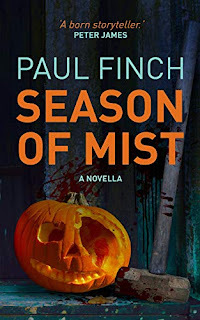 Rather than rabbit on about the story itself (there are plenty of reviews online to take care of that), I thought that today it might just be fun to have a look at the season of mist itself, the autumn (or fall, to our buddies across the Atlantic), and try to work out what it is that induces this need in us (well … certainly in me) both to read and write scary stories.
Rather than rabbit on about the story itself (there are plenty of reviews online to take care of that), I thought that today it might just be fun to have a look at the season of mist itself, the autumn (or fall, to our buddies across the Atlantic), and try to work out what it is that induces this need in us (well … certainly in me) both to read and write scary stories. However, what I’m not going to do is repeat myself by waxing lyrical about winter being ‘the dead time’, when even the land itself appears to be in the grip of malignancy (so obviously there must be ghosts and goblins about!), or ‘the dark time’, a tradition going back millennia, when, with the harvest collected and no real work to do until early spring, all there was left was to sit around the long-hall fire, drinking mead and regaling each other with tall tales.
Primarily, this is because I’m not talking about the winter, I’m talking about the autumn.
Now, okay, let’s not split hairs. Autumn is the gateway to winter. We all know that. But it’s in the autumn when the nights start lengthening, the vegetation withers, the mist rises and all of a sudden even a walk in the woods seems a lot creepier than it did a couple of weeks earlier.
Autumn has a flavour all of its own.
So, bearing SEASON OF MIST in mind, I thought I’d take a look at this time of year – to be specific, the months of September, October and November – from my own perspective, and try to work out what it is about that period that so inspires authors of dark and fantastical fiction.
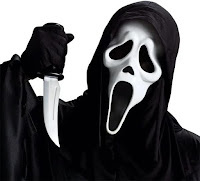 To do this, of course, I’ve got to go back to the age before the internet. The reason is simple: in the world of mass media, the autumnal horror tradition has become the whole story. You can’t go online from mid-September onward now without seeing links and adverts plastered with jack-o-lanterns, ghost faces, skulls and witches. The retailers have got involved. Even here in the UK, we’ve now adopted the full-on, Americanised version of Halloween … and in some ways, more power to its elbow (I’m not going to try to pretend I don’t love it).
To do this, of course, I’ve got to go back to the age before the internet. The reason is simple: in the world of mass media, the autumnal horror tradition has become the whole story. You can’t go online from mid-September onward now without seeing links and adverts plastered with jack-o-lanterns, ghost faces, skulls and witches. The retailers have got involved. Even here in the UK, we’ve now adopted the full-on, Americanised version of Halloween … and in some ways, more power to its elbow (I’m not going to try to pretend I don’t love it). But I’m not here today to talk about that. As I say, I’m looking at a time when we were NOT force-fed ghostly stuff at this time of year, to try and establish exactly what it was about the SEASON OF MIST (see what I did there: plug, plug … sorry, I’m as bad as the rest of them) that made it the natural home of the spook story. So, backwards we go now, to those long ago ...
Happy days
Well … I may refer to my childhood experience of the autumn in such terms, but the truth is that it wasn’t always happy. Not in early September.
Just think about it.
All those sun-soaked summer days of limitless pleasure, dressed only in shorts and t-shirts, riding your bikes along leafy woodland paths, going with your mates on the train to Blackpool or Southport, playing cricket or footy all day in the park, two piles of your packed lunches providing the goal posts. Only coming home after ten o’clock, because it was that late when the sun finally went down, but getting up again at the crack of dawn, because it was already broad daylight, and doing the whole thing again … and all without a worry in the world. But then, almost overnight, (and it was overnight, because one day it was August, and then suddenly it was September), you were going back to the world of school and homework, the weather worsening around your ears, the long dark nights drawing in, the green and pleasant land of your long, rambling summer holiday slowly and systematically obliterated.
That said, kids being kids, we didn’t let it get us down for long. Once the autumn got going, you automatically became aware that it had its own delicacies.
Looking back on it, there were some curious traditions. I remember that, during the early 1970s, it was always in or around September when we started to play marbles and trump cards. The obvious explanation is with the weather deteriorating, we kids were forced to find indoor distractions. Meanwhile, the other big autumn sport when I was young was conkers, which apart from the bit where you got rollocked by adults for battering the neighbourhood’s horse-chestnut trees with sticks and stones, was the best fun ever.
(I understand that kids are not allowed to play conkers anymore; I’m sure there’s a valid reason for this in the eyes of some, but frankly, the mind boggles. How can you have the autumn and not have conkers?)
Ultimately of course, conkers and marbles had nothing whatsoever to do with the spooky side of the autumn (I merely mention them to provide some period colour). Much more relevant to this post were the special events of the season, but not perhaps in the order some might expect.
For instance, during my childhood, the main festival at this time of year was not Halloween, but November 5, Bonfire Night.
Don’t get me wrong. We were aware of Halloween, and we did celebrate it, but Halloween parties in our day tended to be organised by kids themselves, with minimal adult involvement and almost no money spent, costumes usually homemade or improvised, and tin cans with faces cut into them standing in for pumpkins and turnips.
 But for Bonfire Night, things were different.
But for Bonfire Night, things were different. That was the occasion when all the stops got pulled out, when you’d intone rhyming couplets about it at school – Remember, remember, etc – when your mum would get the black peas and the treacle toffee ready, when the gruesome safety adverts would fill you with genuine horror, and on the big night itself, when the sky would glitter with pyrotechnics, and everyone’s back yard was alight with blazing piles of timber, the air thick with gunpowder smoke and echoing to whistles and shrieks …
There were so many signs in autumn that all this excitement was approaching, even as early as September.
Fireworks started appearing in every corner-shop window. You could buy them individually in those days, not just in Government-approved boxes, and chucking bangers at each other was a very popular pastime, though much frowned-upon by parents and the authorities. Pyramid-shaped bonfires, or ‘bommies’, would sprout on every scrap of wasteland, each usually with its own quota of rubber tyres on top, and would be zealously defended by those who’d built them.
But most relevant of all to today’s post, the penny-for-the-guy gangs materialised. Bunches of eager youngsters who’d shove their Guy Fawkes effigies from door to door in wheelbarrows, asking for money, or would wait in prominent places in town centres or on the corners of housing estates.
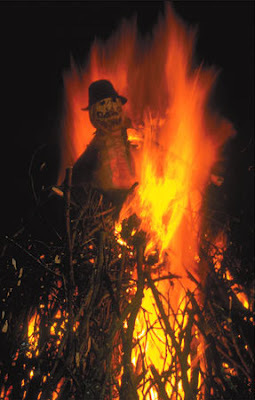 The Guys were very strange objects: straw or newspaper-stuffed mannequins, often wearing garish masks to cover the blankness of their real faces. There was invariably an air of the grotesque about these limp and ragged replicas of humanity, not least because you knew they represented an arch-traitor who had died a barbarous death, and because they themselves would shortly be consumed by flames, to the encouraging roars of a joyful crowd.
The Guys were very strange objects: straw or newspaper-stuffed mannequins, often wearing garish masks to cover the blankness of their real faces. There was invariably an air of the grotesque about these limp and ragged replicas of humanity, not least because you knew they represented an arch-traitor who had died a barbarous death, and because they themselves would shortly be consumed by flames, to the encouraging roars of a joyful crowd. Did this feed into the eerie side of the season?
I personally think it did. I’ve already mentioned that we marked Halloween as well. The two celebrations were only a week apart, so often your Halloween stuff was stored in the same shed as your bonfire stuff. Lifeless dummies, ugly masks and dark, dingy clothing briefly became part and parcel of the season.
But don’t assume the rough-and-ready nature of these preparations spoiled anything. For example, the cheapness of the British Halloween in that era was often compensated for by the lack of adult supervision, which meant you could get away with an awful lot. Trick or treating could sometimes get out of hand, though the main advantage of having no mums or dads around was that you could up the stakes when it came to scaring the bejeezus out of each other.
The first time I ever heard the synopsis of The Exorcist was during one of our Halloween Night ghost story sessions – bear in mind that I was about 10 at the time – and as we were all sitting around in the darkness of some dilapidated garage on the edge of derelict industrial land, it scared me half to death. Equally, we improvised a range of terrifying games: Scream Inn , Slaughter in the Dark , Werewolf By Night , which were all designed to take advantage of the opaque blackness and drifting mist on evenings in the lonesome October.
That brings me to the other key factor: the way the environment subtly changed during the autumn.
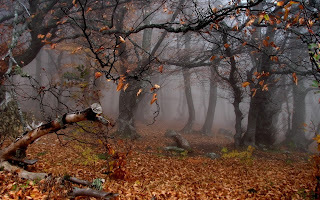 The verdant landscapes of summer (even in Wigan we had some of those) slowly morphing into something distinctly more sinister, the sun-dappled greenery becoming hanging mats of decay, tides of fallen leaves obscuring the paths and footways, scabrous, fungus-riddled tree-trunks emerging from the lank, brown foliage. Even the air smelled different. It was colder, damper. Get out into the woods and wasteland, and there was a constant reek of mildew.
The verdant landscapes of summer (even in Wigan we had some of those) slowly morphing into something distinctly more sinister, the sun-dappled greenery becoming hanging mats of decay, tides of fallen leaves obscuring the paths and footways, scabrous, fungus-riddled tree-trunks emerging from the lank, brown foliage. Even the air smelled different. It was colder, damper. Get out into the woods and wasteland, and there was a constant reek of mildew. It was the perfect setting for horror stories and horror games. My particular group of friends, who, frankly, were significantly braver (or more reckless) than many others of our age, would venture far from the streetlights, probing into the shadow-filled ruins of collieries and factories, or along redundant railway lines where you literally couldn’t see your hand in front of your face, all the while telling each other more terrifying tales – about escaped lunatics and mass murderers, about the ghosts of long-dead, horribly mutilated pitmen still wandering the coal tips (yes, Red Clogs was a genuine legend of that time and place, a vengeful spectre who allegedly haunted every Lancashire colliery from Giant’s Hall, near where I lived, to Sutton Manor in St Helens), or about Nanny Green Teeth, who swam the flashes and canals looking to drown unwary youngsters, and even the Pendle Witches, whose evil souls still rode the high winds, screeching with angry glee.
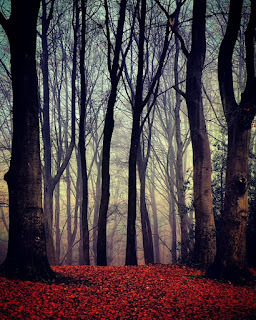 But even if we hadn’t been of that inclination, the uncanny transformation of the land would have worked its spell on us, would have made us think dark thoughts whether we liked it or not.
But even if we hadn’t been of that inclination, the uncanny transformation of the land would have worked its spell on us, would have made us think dark thoughts whether we liked it or not. Here’s a brief but hopefully appropriate snippet from SEASON OF MIST :
In 1974, it was Dom’s suggestion that we hold the Halloween party in the garage at his house. That seemed like a good idea to me. It was separate from the main house, at the end of a secondary drive, and surrounded by thick evergreen shrubbery. It didn’t have any power connected to it, and even its wooden door, which was covered in flaking blue paint, had to be lifted manually to enable you to get inside. It also meant that we’d have to spend at least a few days around Dom’s house, sorting things out, and that might bring me back into the orbit of his sister, who I hadn’t seen for the best part of a month.
I know it sounds ridiculous: on one hand excitedly planning a childish party, and on the other lusting for the attention of a shapely, dark-haired nineteen-year-old. But these juxtaposed emotions were real. I was on the cusp of manhood and didn’t realise it. We’d no idea that within a year we’d no longer be having Halloween parties in darkened garages, would have minimal interest in fireworks, and would view Christmas mainly as an opportunity to steal kisses from girls in class and sneak bottles of cider from our parents’ festive stock. Perhaps that’s one of the reasons why 1974 was one of the greatest and yet at the same time most terrible years of my life. I lived every moment of it with huge intensity, as though unconsciously aware that it was my childhood’s last fling. Even now, so many years later, I remember every sight and sound of that last autumn of innocence, every star-spangled night, every mist-wreathed woodland, every twisted shape watching coldly from the shadows …
That was the autumn of my childhood, which extended from the late-1960s to the late-1970s, and it may go some way to explaining why even now, at the age of 59, I still consider these later months of the year to be so satisfyingly scary. Even without the preponderance of Halloweenorama that now gets rammed down our throats on TV and online, they would have that same effect.
And I suspect I’m not the only one. Here, for your delectation, is a quick, off-the-top-of-my-head list of some of the best ghost and horror stories in which the autumn is a key player (all predating the huge Halloween retail operation that we see today). Check out:
The Fall of the House of Usher – Edgar Allan Poe
The Beckoning Fair One – Oliver Onions
Something Wicked This Way Comes – Ray Bradbury
The Guy – Ramsey Campbell
Eyes – Charles L Grant
The Black Pumpkin – Dean Koontz
Dark Harvest – Norman Partridge
And so on and so forth. Even after a quick experimental mind-scan, there are far too many to name, which is vindication of a sort, I suppose.
THRILLERS, CHILLERS, SHOCKERS AND KILLERS …
An ongoing series of reviews of dark fiction (crime, thriller, horror and sci-fi) – both old and new – that I have recently read and enjoyed. I’ll endeavour to keep the SPOILERS to a minimum; there will certainly be no given-away denouements or exposed twists-in-the-tail, but by the definition of the word ‘review’, I’m going to be talking about these books in more than just thumbnail detail, extolling the aspects that I particularly enjoyed (I’ll outline the plot first, and follow it with my opinions) … so I guess if you’d rather not know anything at all about these pieces of work in advance of reading them yourself, then these particular posts will not be your thing.
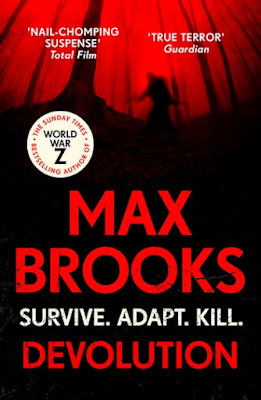 DEVOLUTION
by Max Brooks (2020)
DEVOLUTION
by Max Brooks (2020)
Outline
Thirteen months have passed since Mount Rainier, an active volcano in the Cascade Mountains, in America’s Pacific Northwest, erupted with devastating consequences. Among the many casualties recorded at the time was the majority of the population of Greenloop, a small town in a remote corner of Mount Rainier National Park, which was completely destroyed during the disaster. All of its occupants’ bodies were recovered later, with the exception of one, a certain Kate Holland, who has never been seen since.
When a local reporter is contacted by Kate’s brother, one Frank McCray, who tells him that the population of Greenloop didn’t die in a mudslide or from poisonous volcanic fumes, or anything of that sort, but in fact were murdered by a Bigfoot clan, having itself been displaced by the eruption, the newshound undertakes to investigate, first of all by studying Kate’s journal, but also by holding in-depth interviews with McCray himself and National Park ranger, Josephine Schell.
The narrative that follows has been cobbled together from these various sources, in addition to items drawn from earlier works of Bigfoot research, and it tells a terrifying tale …
When Kate Holland and her husband, Dan, first arrive in Greenloop, they find it a place of many inconsistencies. The creation of wealthy techno-czar, Tony Durrant, it is on one hand a site of communal living, a purpose-built, eco-conscious hamlet far out in the wilderness, allowing its residents to give up safely on urban living and get back in synch with the natural world (for example, its dwellings are environmentally-friendly cabins, its backup power resources courtesy of solar panelling and biogas generators), but at the same time it is entirely dependent on modern tech, everything here automated and controlled by apps on its occupants’ laptops, phones or iPads, while essential supplies are air-lifted in by drones and wi-fi delivered by fibre-optic cable. If that isn’t enough, Seattle, which is only 90 miles away, is easily reachable by the nearest highway.
On top of all that, Greenloop is an expensive place to live, only really available to moneyed academics who can afford to give up on the rest of the world. It doesn’t go uncommented on that folk like these, who’ve rarely, if ever, got their hands dirty doing real outdoors work, are likely to be among the least able to survive off the grid in the event of some kind of disaster. They don’t possess anything as useful as an actual tool, never mind a weapon, and they certainly lack the muscle-memory to use one.
In truth, it’s a pretence at ‘going green’ rather than the real thing, an elaborate form of virtue signalling, minus any actual hardship, but it would be untrue to say that life in Greenloop is not, in its unique way, quite attractive.
Kate Holland herself is very much a creature of the modern world, a hyper-stressed executive type, who is here to try and decompress, and with the aid of a journal, which her therapist insists she keeps in detail and regularly updates, is seeking to reorganise her entire approach to life.
She’d particularly like to fix her relationship with husband, Dan, though this feels as if it will be quite a challenge.
It’s through Kate’s journal that we follow her initial interactions with other Greenloop residents, all of whom are, in their different ways, well-heeled oddballs, none seeming to possess even the most basic life skills, with the exception of the acerbic artist Mostar, who, it gradually becomes obvious, has led a far more lived-in life than any of the others, including Kate and Dan.
Few of the residents really get on, but for the sake of peace, efforts to be civil to each other are mostly successful. However, when Mount Rainier erupts, it is a real and serious problem. The community, though undamaged by the fall-out from the volcano, find themselves completely cut off from the rest of the country. What’s worse, the Washington State infrastructure has been hugely disrupted, while wholesale civil disorder has broken out in Seattle, the sum total of which is that rescuers won’t be coming along any time soon.
Tony, the de facto leader of the community, even though he’s somewhat uninspiring in that role, suggests that they only need to sit tight and help will arrive at some point. Mostar, who we later learn was in the Balkans during the war of the 1990s, makes practical suggestions, not just about rationing food, but in terms of educating themselves in matters of basic maintenance. At first, the townsfolk respond constructively to the crisis, but gradually, as their isolation continues, the supplies diminish and conditions get harder, and people who, despite initial brief comradeship, really don’t like each other, soon start to display it.
To make matters worse, Kate increasingly suspects that some kind of hostile animal lurking in the woods nearby is taking ever greater interest in them. More and more evidence of this emerges, and when she is one day chased back into the compound by a huge apelike creature, she is drawn to the conclusion not just that Bigfoot is real, but that he’s here, finally driven out of hiding by the eruption.
Of course, no one believes her at first. Most likely she encountered a bear. Typical townie. How would she know the difference? But the beasts now encircling Greenloop are getting steadily bolder, and when the townsfolk start hearing blood-chilling, ape-like shrieks in the woods, and find their bins and compost containers ripped open, they realise that it isn’t just one enormous hominid they are facing here, but several. Eco-conscious retiree, Vincent Boothe, attempts to make contact, but is rewarded by a shower of heavy stones, which do massive damage and clearly illustrate that their as yet (mostly) unseen opponents are very antagonistic.
Still feeling that this is all some massive misunderstanding between species, Vincent volunteers to go out of town on foot and literally hike his way to civilisation. Mostar advises against this, but he won’t listen … and that night they are all wakened by his screams of agony. Despite Mostar’s warning that it’s a trap, Kate and Dan also risk venturing out.
All they find left of him is scattered meat and bone. Whatever the giant apes dined on previously has evidently now been denied to them by Mount Rainier. So, they’ve found something else to eat. The community thus defers to Mostar, who prepares it for war …
Review
Anyone who knows their great apes knows they are not to be trifled with. Once you are out there in the wild, our closest relatives on the evolutionary scale can be our most dangerous enemies. Intelligent, ferocious, incredibly strong and aggressively tribal, the ape and monkey species of the world can pose a very serious threat to any human who, intentionally or otherwise, wanders into their domain. This is a fact of life as we know it. But now imagine that they each stand to about eight or nine feet tall and weigh in at about 490lbs, and that you are deep in their territory but can’t get away because Nature has conspired against it.
This is the premise of Devolution , Max Brooks’ latest epistolatory horror-adventure. And it’s a genuinely terrifying one, even more so as the human enclave soon being encroached on by the sasquatch clan is weaker than you might normally find. This is the land of gun ownership, but they don’t have any guns. This is the land of the outdoorsman, but there are no outdoorsmen here. Greenloop is all about sustainable living, but it can’t sustain itself even for a week when its power has been cut.
As I worked my way through the first half of the book – which is a real ‘slow burn’, I have to say – all these facts were gnawing on me. It struck me from the outset that this deluded techno-hipster community was vastly more vulnerable than even its most enlightened member realised. That it was, in fact, ripe for the plucking. Of course, it only makes things worse that, even though the residents of Greenloop don’t know about it, we readers are well aware – because we’ve been told in advance – of the savage forces gathering in the encircling forest.
I found that idea alone intensely frightening. And it doesn’t get any easier the more the Greenloop residents realise what they are up against, because there is nothing they can do about it anyway. Nothing obvious, at least. When the battle commences, it’s every bit as violently one-sided as you would expect, though the humans increasingly show ingenuity and aggression of their own, slowly but surely evening the score.
And it’s this that makes Devolution more than just another scary creature-feature.
As with Brooks’ thumping first success, World War Z , the author, while he’s undoubtedly keen to tell a rattling good terror tale, is also interested here in how humanity would respond to such an assault (in effect, how quickly and effectively they could and would go to war). In the first book it was the world-scale response. In this one, it’s the world in miniature.
The Greenloop community comprises a diverse assortment of interesting characters, all with their own strengths and flaws. Some reviewers have accused Brooks of wasting time with this.
‘We know they’re all going to die anyway, so why bother building them up?’
But for me that’s missing the point. First of all, Brooks, as all good fiction writers should, is ensuring that these characters in peril are characters we care about. If they’re just blank sheets it won’t matter if they get torn apart. Secondly, and this I think is his real aim, he’s putting us – mankind – in the frame. It takes all sorts to make a human community, with the usual exception of deadly fighters and square-jawed heroes. Because let’s be honest, in how many communities in the world do those people actually exist? One response to Devolution has been to sneer at how ineffectual this bunch of latter-day middle-class hippies actually are, to laugh at how easily they are picked off by monstrous brutes with far lower intellects, to say smugly that this is the outcome of easy living and over-reliance on technology. But how many of the rest of us don’t fall into that same category? How many of the rest of us wouldn’t make it out of the wild woods alive if we were abandoned there, with or without the presence of giant, man-eating apes?
However, this isn’t a situation that will remain unchanged.
It’s a near certainty that humans, when they are under attack, will eventually counterattack. We are a notoriously belligerent race in our own right. We mastered the beasts when we had very little to fight them with save sticks and stones. So, in Devolution , the hominids don’t have it all their own way.
By this, I don’t mean to say that Max Brooks goes all The Hills Have Eyes on us. It’s not the case here that those who are seemingly innocent at the start of it eventually are so abused that they become abusers themselves. That said, they demonstrate a significant degree of devolution. Particularly Kate Holland, whose disappearance at the end of the narrative may not be down to the predators having dragged her off into the trees.
The big question is does it all work?
Well, for me the answer is a resounding yes, for various reasons.
Not all reviewers have appreciated the epistolary style, which, as I’ve already mentioned, was also used in World War Z , but for me it adds a classic horror vibe. The presence of Bigfoot in the North American backwoods is still a matter of debate. Is he there, or isn’t he? It’s an age-old mystery with its roots in Native American lore, a definitive answer still elusive thanks to the sparsity of hard evidence. And this novel simply adds to that.
Is Kate Holland’s journal for real? Did these things genuinely happen, or was she driven crazy by horror and despair at the deaths of her friends during a volcanic catastrophe? No certain answer is possible, so ultimately, along with all those bits of grainy film and curious late-night audio recordings we can these days check out on YouTube , it can never be anything more than yet another fragment of a clue, the authenticity of which can only be guessed at.
This also puts it in the category of ‘found footage’ horror, or perhaps ‘found text’, though that in itself is nothing new; it harks back to the classic days of Bram Stoker, HP Lovecraft and Weird Tales . However, it also serves a functional purpose. Though I strongly doubt that anyone could recollect conversations of days earlier so perfectly word-for-word that you could reproduce them in a diary and they’d read as smoothly as they do here, which is perhaps one overarching weakness of Devolution , I’m prepared to give leeway because I can’t help thinking that telling this story as a straight narrative, particularly as so much of the first half of it concerns Greenloop world-building, I can’t help thinking it would drag too much in the build-up.
All round, Devolution is a superior horror novel, a good old-fashioned monster story, with a strong Man v Nature subtext, which is particularly pertinent in this age, when we all unquestioningly support green issues, and yet should perhaps be cautious that we don’t get exactly what we wish for. It’s a wild world out there; we’ve conquered a lot of it, but it wouldn’t take much for it to conquer us back.
For once, I’m not going to bother with my homegrown casting choices for a movie version of Devolution, as Legendary Entertainment optioned it on publication, and, according to the Hollywood Reporter last year, had appointed James Ashcroft to direct (mockumentary style, by all accounts), and that trailers may hit the internet before the end of this year.
(As always, most of the artwork on this post has been snaffled while it was floating around on the Internet uncredited. However, the upright image of the autumn woodland was created by Johnny G. If any of the others would like to step forward, I will be delighted to credit them as well, or, if required, take the pictures down).
September 5, 2023
When cruel maniacs lurked in the suburbs
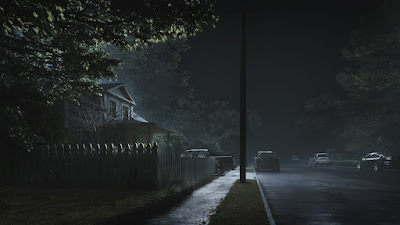
There’s been a bit of a gap since my last blogpost. I’ve been away on holiday since we last spoke, plus I’ve had to say goodbye to a beloved friend. But things are kind of back on the straight and narrow now, as we head into the season of mist … which probably means that today is quite an opportune time to talk about one of my personal favourite pieces of work, the original SEASON OF MIST , which I’m always going to promote around this time of year, because, in the words of one reviewer, it’s “richly flavoursome of the autumn months”.
Seeing that it’s set in Northern England of the 1970s, today will also be a good time to get introspective about yet another thing that spurred me into my writing career. So, this week we focus on that particular decade, but most specifically on a series of horror books that I will forever associate with it, and which completely captivated me as I ventured into the world of adult fiction.
On a not dissimilar subject, for this week’s review, I’ll be taking a detailed look at an issue of Tom English’s excellent horror magazine, NIGHTMARE ABBEY: WINTER SOLSTICE 2022.
If you’re only here for the Nightmare Abbey review, you’ll find it, as always, at the lower end of today’s post, in the Thrillers, Chillers section. First of all, though, it’s …
 That time of year again
That time of year again
I won’t say too much about SEASON OF MIST , as I find myself promoting it on here every September, October and November. Instead, I’ll just post the back cover blurb, remind everyone that it can be had in paperback, ebook or on Audible (in two formats, freestanding or as part of a ‘waning of the year’ Audible collection, THE DEAD TIME ), and I’ll then close with select quotes from some of the excellent reviews that it’s received over the years.
SEASON OF MIST
Our last autumn of innocence. Star-spangled nights. Mist-wreathed woodland. A twisted shape watching coldly from the shadows ...
Industrial Lancashire 1974
The kids in the coal-mining town of Ashburn love the waning of the year. Fancy dress and scary stories for Halloween. Fireworks and treacle toffee on Guy Fawkes Night. And a month after that, snow and the approach of Christmas.
But this particular autumn will be memorable for entirely different reasons.
Because this year someone is killing the children of Ashburn.
Or should that be SOMETHING?
While police and parents search for a maniac, Stephen Carter and his schoolmates know better. They may be on the cusp of adulthood, but there’s still enough of the youngster left in each of them to recognise the work of an evil supernatural being unique to these deserts of slagheap and coal-tip.
“A masterfully told story of autumn and boyhood and fear and courage. It’s a crime story, a ghost story, a whodunnit. I usually avoid coming-of-age stories but this one is special …”
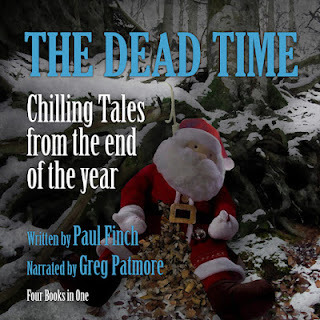 “A perfect mix of nostalgia for childhood days of freedom and friendship, and fear as the young people of a small Lancashire town are stalked by a brutal killer who becomes linked to a terrifying local legend …”
“A perfect mix of nostalgia for childhood days of freedom and friendship, and fear as the young people of a small Lancashire town are stalked by a brutal killer who becomes linked to a terrifying local legend …”“… the suspense and tension build to a memorable climax that works brilliantly, even though it wasn’t at all what I was expecting.”
“A great narrative and characters add to this absolutely nail-biting read …”
“I read this over two evenings and it took me back to my childhood in Lancashire around that time. I love a creepy story and it would make a great TV drama …”
And now ...
MOMENTS THAT MATTERED
What on earth is it that could make you want to be a writer?
Every one of us is different, I suppose. We all found our own unique ways into this profession, but I’d hazard a guess that majority of us have experienced ‘Damascene moments’ … in other words were at some point struck by an astonishing revelation or motivation that we never saw coming, and which, while it might not have jolted us into the world of authorship at that very moment, became a persuasive factor in later years ... was in fact the spur that ultimately drove us on towards a very different future.
In a previous post, I highlighted the role that the great neon sign for GRANADA TELEVISION , glimmering across the rain-swept Manchester rooftops one dark and terrible night, played in pushing me towards the writing game. Today, I’m zeroing in on another aspect of my early life, which proved equally instrumental, though it may be the last thing you expect.
SPUR #2 – THE PAN BOOK OF HORROR STORIES
The 1970s in Britain, or so we’re often told, was a sordid time to be alive, and while I’d argue that we’re mainly told this by people who weren’t there, there were undeniable drawbacks to living in that decade.
We ate the wrong things, drank too much, smoked too much, we were racist and chauvinistic, and society as a whole was far too sexualised: there were no modesty boards on girlie mags back then, while our TV sitcoms were laced with blue humour. And of course, there was violence: the 1970s was an era of industrial decline and unemployment, but as some traditional structures remained in place – the Church, the family unit etc – this didn’t divert directionless young men into theft and drug dealing, the way it seems to today, as much as into heavy drinking and regular brawling in pubs and clubs.
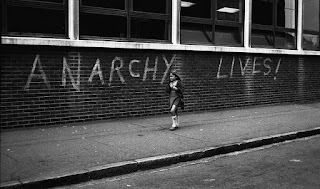 Saturday night was definitely alright for fighting in those days. There was little in the way of organised security in town centre bars, so when it kicked off in the ’70s, those establishments would literally get wrecked. We all know that this was also the age of football hooliganism, not to mention skinheads, boot boys and Hell’s Angels.
Saturday night was definitely alright for fighting in those days. There was little in the way of organised security in town centre bars, so when it kicked off in the ’70s, those establishments would literally get wrecked. We all know that this was also the age of football hooliganism, not to mention skinheads, boot boys and Hell’s Angels. So … Wow!, you must be thinking, this it the decade this guy is trying to sell to us?
Well, no, I’m not. But the 1970s, the decade in which I came of age, was an essential factor in my development as a writer. And a key aspect of that was the PAN BOOK OF HORROR STORIES .
Now, hold your horses. This isn’t as much of a right-hand turn on what I was just talking about as you may think. Because, horror, in terms of movies, TV and written fiction, was also a massive thing in the 1970s.
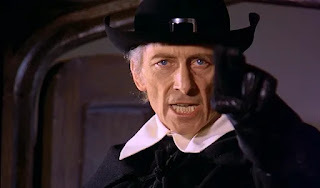 Hammer were still packing cinemas with blood-drenched but titillating affairs like Hands of the Ripper,
Countess Dracula
and
Twins of Evil
, but you also had infinitely higher budget and way more frightening movies like
The Exorcist
and
The Omen
, alongside family blockbusters like
Jaws
, while our TV schedules also did their bit. Programmes like
Supernatural
,
Beasts
and
Ghost Story for Christmas
sent chills through the living rooms of Britain like nothing that had gone before them.
Hammer were still packing cinemas with blood-drenched but titillating affairs like Hands of the Ripper,
Countess Dracula
and
Twins of Evil
, but you also had infinitely higher budget and way more frightening movies like
The Exorcist
and
The Omen
, alongside family blockbusters like
Jaws
, while our TV schedules also did their bit. Programmes like
Supernatural
,
Beasts
and
Ghost Story for Christmas
sent chills through the living rooms of Britain like nothing that had gone before them. In terms of reading material, the bookshops of the UK were also awash with horror, both novels and anthologies. All these things considered, it was a perfect era for the Pan Horrors to thrive in. Now, don’t get me wrong, that series was not confined solely to the 1970s. The creation of legendary publisher and anthologist, Herbert van Thal, there were 30 volumes in total, and they ran from 1959 until 1989, but most enthusiasts would probably agree that in the late 1960s moving through into the 1970s they were really ratcheting up the sleaze factor.
And even by the standards of the conte cruel horror story, when I say ‘sleaze’, I’m talking about its most extreme incarnation: sexual violence, perversion, sadism and so forth.
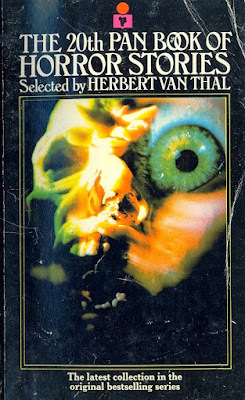 Take John Arthur’s
Don’t Go Down in the Woods
in Vol 20 (1979), in which we meet a insatiable schoolgirl serial killer out on the prowl for hunky young men to slaughter, and Alex White’s
The Clinic
in Vol 14 (1973), wherein a young woman is sent for a new job at a mysterious clinic, only to find that she’s actually an inmate, who’s been sent there for a very severe form of re-education ... which sees her raped, tortured and mutilated.
Take John Arthur’s
Don’t Go Down in the Woods
in Vol 20 (1979), in which we meet a insatiable schoolgirl serial killer out on the prowl for hunky young men to slaughter, and Alex White’s
The Clinic
in Vol 14 (1973), wherein a young woman is sent for a new job at a mysterious clinic, only to find that she’s actually an inmate, who’s been sent there for a very severe form of re-education ... which sees her raped, tortured and mutilated. No wonder there was a ‘lure of the forbidden’ thing going on for youngsters like me where the Pan Book of Horror Stories was concerned. It’s certainly the case that it wasn’t easy getting hold of these books if you were a young teen. Mums and dads were a lot stricter back then than today. Hell, my dad once made me take a copy of Monster Mag back to the shop because it featured a pull-out poster of Peter Cushing gloating over a severed head. So, they’d almost never consent to letting you buy one of the Pan Horrors yourself, and that was assuming you could find a shop lady who’d sell it to you. The only option therefore was usually to borrow one from some friend’s older brother, or maybe dip into that ‘behind the bike sheds’ black-market at school, wherein copies would inevitably come ragged and dog-eared, and much pawed over on the pages where rude things happened.
Looking back on it now, it’s actually amazing that some of the stories in the Pan Horror anthologies were ever allowed to make it into the public realm. But people of today need to understand that British society really was very different back then. In ’70s comedy, what might today be deemed blatant misogyny was then dismissed as saucy banter. Likewise, what in horror might now be decried as obscenity was then belittled as trashy yuk for immature minds but tolerated regardless.
No doubt, reams of sociological discourse have been produced on this matter. But for me, it’s a simple case that this was Britain at the end of the industrial age, and it was a messy time. Unemployment was booming, there was financial and political chaos, we had strikes, three-day weeks, power cuts, while the very fabric of the country seemed to be decaying around us, particularly in places like my hometown, Wigan, where so many factories, mills and mines were just standing derelict, canals were bogging up and railways lying overgrown and disused.
But it wasn’t just the working class who were affected, it was the country at large.
Pride in our Word War Two effort was fading, especially as so many things in the present seemed to be going wrong.
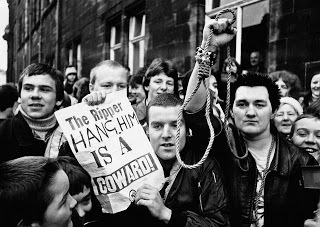 We had much higher crime rates than we had been used to: serial killers suddenly seemed to be everywhere, while sex offences in general had increased drastically, and by then you could add terrorism to the mix (which was a threat to literally everyone; for a short time in the early/mid ’70s, you gave wide berth to waste-bins and even pillar boxes in case the IRA had planted bombs in them).
We had much higher crime rates than we had been used to: serial killers suddenly seemed to be everywhere, while sex offences in general had increased drastically, and by then you could add terrorism to the mix (which was a threat to literally everyone; for a short time in the early/mid ’70s, you gave wide berth to waste-bins and even pillar boxes in case the IRA had planted bombs in them). It’s a simple case that Postwar Britain was a tired. grimy place, and yet it clung to the façade of respectability. Hipness was still regarded with suspicion. Most middle-aged people dressed as their parents and grandparents had done. Effing and blinding in public was taboo. An open homosexual lifestyle was illegal, and while we had rigid laws against hardcore porn (for which reason the backstreet sex shop trade flourished), those who worked with children or other vulnerable groups were appointed without even being vetted because the default assumption was that, to do that work, they simply MUST be nice and trustworthy.
And this, I think, is where the Pan Book of Horror Stories earned its place in history, because it really did – either by accident or design – capture the essence of a superficially polite society in which some truly vile things were going on behind neatly drawn chintz curtains.
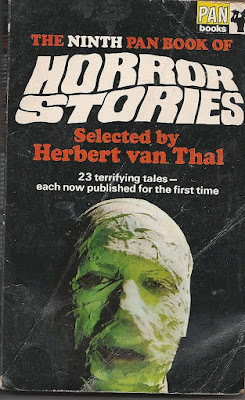 For example, in Vol 9 (1968), in Raymond Smith’s
Smile Please
, a high-class stripper is contracted to perform a private show for a bunch of rich guys. Superficially, they want her to play Eve in the Garden of Eden; it’s all a bit silly but basically pretty innocent, until she ends up dying in the coils of a deadly snake while dressed only in fig leaves, her clients gleefully filming it. In Vol 12 (1971), Robert Ashley’s
Pieces of Mary
sees a nervous mother despatch her daughter to play with the quiet and studious boys next door, unaware of their fascination with human anatomy, and in Vol 14 (1973), R. Chetwynd-Hayes gets in on the act with
It Came to Dinner
, in which a homeless man is taken in by a well-off family, unaware that he’s to be the main course in a cannibal feast.
For example, in Vol 9 (1968), in Raymond Smith’s
Smile Please
, a high-class stripper is contracted to perform a private show for a bunch of rich guys. Superficially, they want her to play Eve in the Garden of Eden; it’s all a bit silly but basically pretty innocent, until she ends up dying in the coils of a deadly snake while dressed only in fig leaves, her clients gleefully filming it. In Vol 12 (1971), Robert Ashley’s
Pieces of Mary
sees a nervous mother despatch her daughter to play with the quiet and studious boys next door, unaware of their fascination with human anatomy, and in Vol 14 (1973), R. Chetwynd-Hayes gets in on the act with
It Came to Dinner
, in which a homeless man is taken in by a well-off family, unaware that he’s to be the main course in a cannibal feast. The seeds of my own crime thrillers were definitely sown around that time, though I suspect I didn’t realise it then. This applies particularly to my HECK books, which follow cases of the Serial Crimes Unit, a bunch of specialised detectives attached to the National Crime Group, charged with investigating spree murders, torture murders, rape murders, killings perpetrated by cults or the creators of snuff movies or red rooms, and all those other sorts of other heinous individuals we like to imagine are purely fictional but actually aren’t, and yet so many of whom are concealed among the rank and file of ordinary respectable society.
That latter was a particular theme in my crime novels: namely, that there are all kinds of deviants and psychopaths out there, despite appearances. Warped individuals who manage to keep a lid on their true selves during daytime hours, but once darkness falls give full vent to their very worst desires.
I saw much of this during my police career. Trust me, the most dangerous lunatics don’t look the part; mass murderers don’t wander the streets advertising their services.
However, I don’t want the tone of this post to get too grim. The Pan Book of Horror Stories was not exclusively an exercise in imaginative grue. Even the great anthologist, Mike Ashley, who was highly critical of the gore count in the series, admitted that most volumes contained some high-quality horror as well. So many writers I know who’ve made their career in dark fiction, or have even just dabbled in it, were avid readers of these books in their early days, which surely indicates there were many good and influential stories in there.
For example, Unburied Bane by N Dennett (or it could have been the prolific Eleanor Scott, working under a pseudonym) which appeared in Vol 3, was a traditional and terrifying story, in which a holidaying couple guest in a decrepit rural cottage, where one of those infamous ‘screaming skulls’ resides in the care of the semi-deranged and possible practising witch, Ann Skegg. In the same volume, we had Neville Kilvington’s Meshes of Doom , which sees a member of the Royal Botanical Society bury his murdered wife in the conservatory, only for a recently acquired exotic plant already resident there to start demonstrating amazing growth spurts and unnatural appetites.
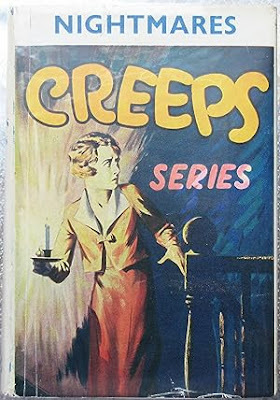 Anyone who knows their stuff will be well aware of these two tales. They weren’t original to the
Pan Book of Horror Stories
, both having originated in the
Creeps
anthology series of the 1930s. But seeing that they’re among the best supernatural horror stories ever written, they were worthy inclusions, Herbert van Thal having resurrected them from a distant past and brought them to a completely new audience. That was an inspiration in itself if you were a youngster around then who was toying with the idea of writing a few spooky stories of your own.
Anyone who knows their stuff will be well aware of these two tales. They weren’t original to the
Pan Book of Horror Stories
, both having originated in the
Creeps
anthology series of the 1930s. But seeing that they’re among the best supernatural horror stories ever written, they were worthy inclusions, Herbert van Thal having resurrected them from a distant past and brought them to a completely new audience. That was an inspiration in itself if you were a youngster around then who was toying with the idea of writing a few spooky stories of your own. There were original classics in there too. Eddy C Bertin’s The Whispering Horror , which first appeared in Vol 9, presented us with a conventional but wonderfully horrific vampire story, while David Case’s The Hunter , in Vol 12, unleashed big game hunters onto Dartmoor in pursuit of a murderous assailant who might well be a werewolf.
No, the Pan Book of Horror Stories was not just about the conte cruel. Though, as I’ve already said, those ultra grim tales of dastardly doings behind closed doors were an inspiration in their own right – an odd one, I’ll admit – but so was the high-quality writing of those many other less offensive but probably more frightening horrors the series also offered.
Therefore, all hail the Pan Book of Horror . Always controversial, often disturbing, but never less than entertaining, and a incalculable inspiration to generations of horror and thriller writers growing up in that era, myself included.
THRILLERS, CHILLERS, SHOCKERS AND KILLERS …
An ongoing series of reviews of dark fiction (crime, thriller, horror and sci-fi) – both old and new – that I have recently read and enjoyed. I’ll endeavour to keep the SPOILERS to a minimum; there will certainly be no given-away denouements or exposed twists-in-the-tail, but by the definition of the word ‘review’, I’m going to be talking about these books in more than just thumbnail detail, extolling the aspects that I particularly enjoyed … so I guess if you’d rather not know anything at all about these pieces of work in advance of reading them yourself, then these particular posts will not be your thing.
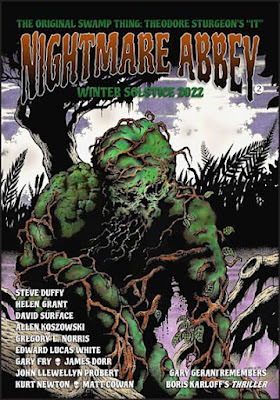 NIGHTMARE ABBEY: WINTER SOLSTICE 2022
edited by Tom English
NIGHTMARE ABBEY: WINTER SOLSTICE 2022
edited by Tom EnglishIn a recent interview, Nightmare Abbey editor, Tom English (of Black Infinity fame), explained how the inspiration behind his new horror magazine lay in the kinds of ‘dime store’ horror mags he loved to read in his youth, or at least would have loved to read had he found sufficient of them on the newsagent racks of the 1970s. By this, I gauge that Tom meant he was looking for some kind of reading material that covered the whole scope of horror, not just fiction but non-fiction too. He was seeking a periodical, if you like, an intelligent epistle carrying a range of well-informed articles as well as a bunch of spooky stories – and in that, he appears to have succeeded, because at just one glance, there is definitely something of the golden age about this relatively new kid on the block.
As you may have realised, Nightmare Abbey , from Dead Letter Press, is still in its infancy – only three volumes have come out to date, with Volume 4 due to drop around Halloween – though I only really became aware of it when Volume 2, or the Winter Solstice edition for 2022, hit the shelves. But it took me by surprise straight away. It calls itself a magazine, but it’s a hefty, chunky brute, running to 146 pages, and as it promises on the cover, it is packed with fascinating features relating to the genre we all love so much.
It also contains a wealth of fiction, both original stories and a few reprinted classics (in all cases, with detailed information attached concerning the author and so on). But, personally speaking, I found the non-fictional items most eye-catching given how rarely you get this sort of thing.
For example, and most interestingly of all for me, was film historian Gary Gerani’s scholarly essay on Thriller , the early 1960s horror anthology series from NBC, as presented by Boris Karloff, which gave early breaks to such wannabe actors at the time as William Shatner, Elizabeth Montgomery, Mary Tyler Moore, John Carradine and Bruce Dern.
In fictional terms, as always with anthology material, it’s something of a mixed bag, but that’s inevitable given how subjective literature can be. What I will say is that, from the outset, all of these tales are tightly and effectively penned, Tom English clearly exerting strong quality control from his editor’s chair, and nearly all of them exquisitely illustrated by fantasy artist extraordinaire, Allen Koszowski. For the most part, the tales are supernatural thrillers rather than conte cruels, though there’s a certain level of nastiness baked in to every one. We’re talking a ‘horror’ mag here, not a collection of ghost stories.
The contributions that most caught my eye were as follows:
First up, It by Theodore Sturgeon, in which the bones of a dead man are reclaimed by the earth and transformed into a shambling ‘mud doll’ horror, which goes on to terrorise a small rural community. It’s a much-anthologised classic, dating back to 1940, which served as a chilling prototype for later comic-book characters like the Heap, Solomon Grundy and Swamp Thing.
Then, in David Surface’s These Things That Walk Behind Me , we meet a mental patient, who, thanks to having suffered a severe nervous breakdown, is now incarcerated in a psyche ward, where he slowly starts to glimpse the terrible but invisible things that are driving humanity mad. A definite thought-provoker, this one, and far from comfortable reading.
Meanwhile, in two exceptionally well-written but tonally very different stories, James Dorr’s The Calm takes us back to 1755, where a combined colonial force of Brits and Americans makes a military expedition to an isolated settlement, wherein a native legend tells of the ‘wind that presages death’, while Gary Fry’s much more mundane in setting, but no less eerie Voices of the Dark introduces us to a formerly successful comedian, now battling the booze, who attempts his comeback on stage in a drab seaside town, only to find the old flat where he’s staying deep in grim secrets.
Another blast from the glorious past comes in the shape of Edward Lucas White’s House of the Nightmare , which, though it dates back to 1906, must surely remain in the running for ‘scariest haunted house story ever written’. It concerns a motorist who, when he finds himself stranded at a lonely and abandoned mansion, has no choice but to stay overnight and is soon beset by a series of increasingly more terrifying nightmares.
In That Which Overcomes , the always reliable John Llewellyn Probert sticks his own welcome oar into the mix, sending a pair of middle-aged doctors down into a mysterious underground labyrinth, which one of them is convinced claimed the life of his father. Apparently, the maze of unlit tunnels comes and goes, but whatever lurks down there is constant. JLP has ventured more and more into the supernatural as he himself has grown older, but you can always guarantee that he’ll have truly something horrible in store.
In three other strong and particularly mysterious entries, we have Dead Hands Clapping by Matt Cowan, in which the son of a former film star who died in a theatre explosion acquires an old sound tape supposedly containing a recording of the fatal incident, only to discover that it’s a past that shouldn’t be delved into, The Wynd by Helen Grant, in which a thief takes a narrow passage to an ornate church, intending to burgle it, but finds the entire district weirdly deserted, while the church itself seems … odd (to say the least), and Geoffrey L Norris’s Tableau for Two , in which a duo of brothers are called to clear out their deceased mother’s apartment, but uncover artefacts that remind them of the worst Halloween night of their lives.
Perhaps the strongest contribution in the whole volume comes, unsurprisingly to me, from Steve Duffy, whose La Nina Atardecer sees an American drug dealer crossing the Mexican desert to a vital meeting, and en route picking up a beautiful hitchhiker, whom he soon learns – the hard way – is much more than she appears. I don’t want to say too much more about this one, but put it this way, it’s nail-chewingly frightening and could easily be the premise behind a full-length horror movie.
So, there we go. That was my first dip into Nightmare Abbey , and it was a couple of hours very well spent. I hope it runs for years because it gets my highest recommendation. It seems to be setting itself up as a one-stop-shop for all things horror – both fictional and factual – which in itself is one of the most worthwhile endeavours I’ve seen for quite some time.
Grab a copy whenever you can. You won’t regret it.
(Efforts have been made to identify and credit all the creators of the imagery used in today's post, without success. If anyone recognises a piece of their own work, just drop me a line, and I will either provide the necessary info, or if it is required, delete the image entirely).



